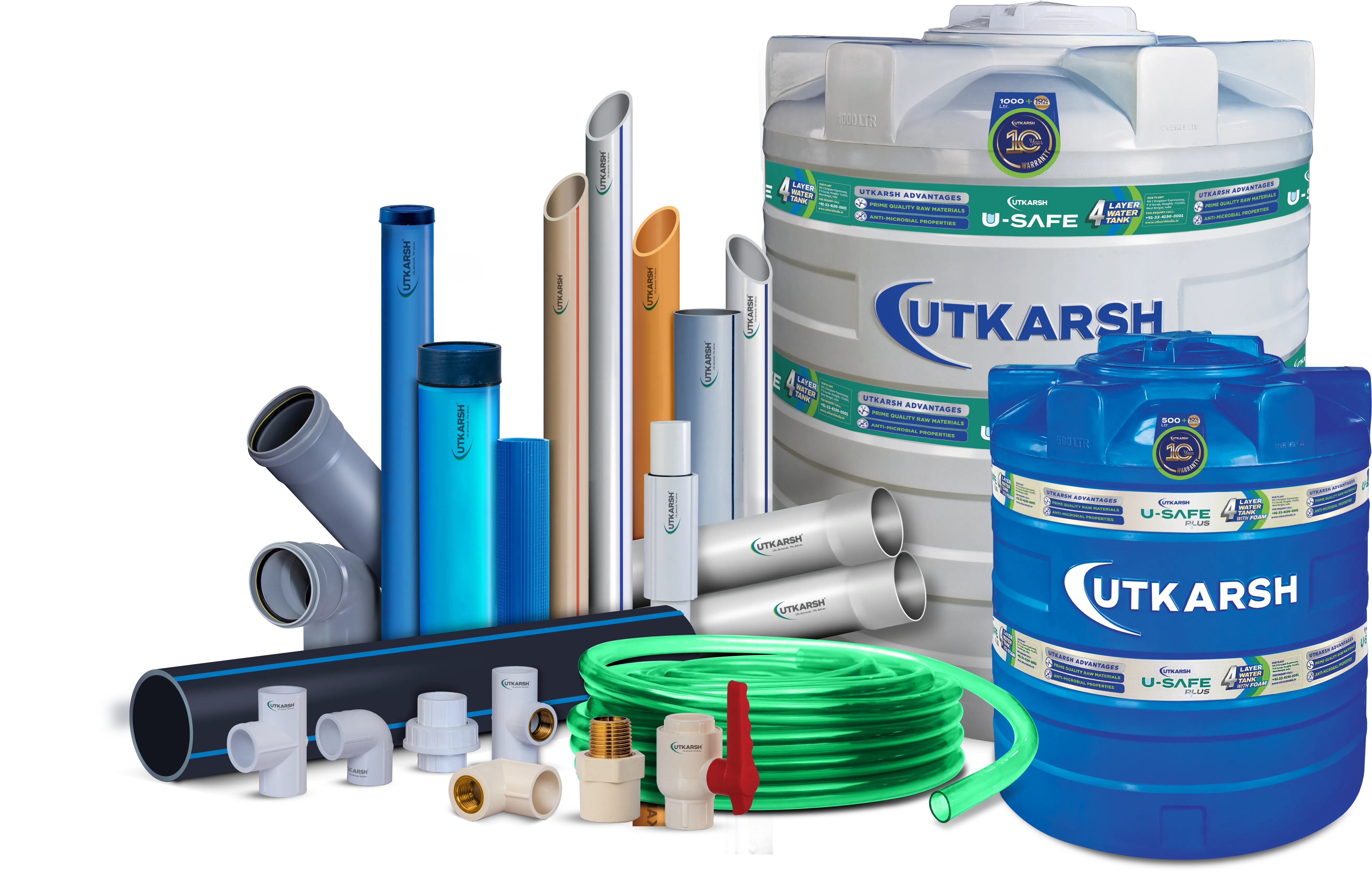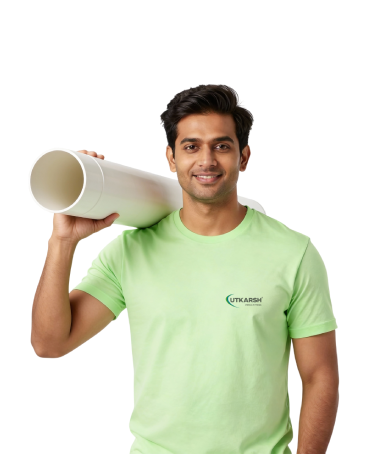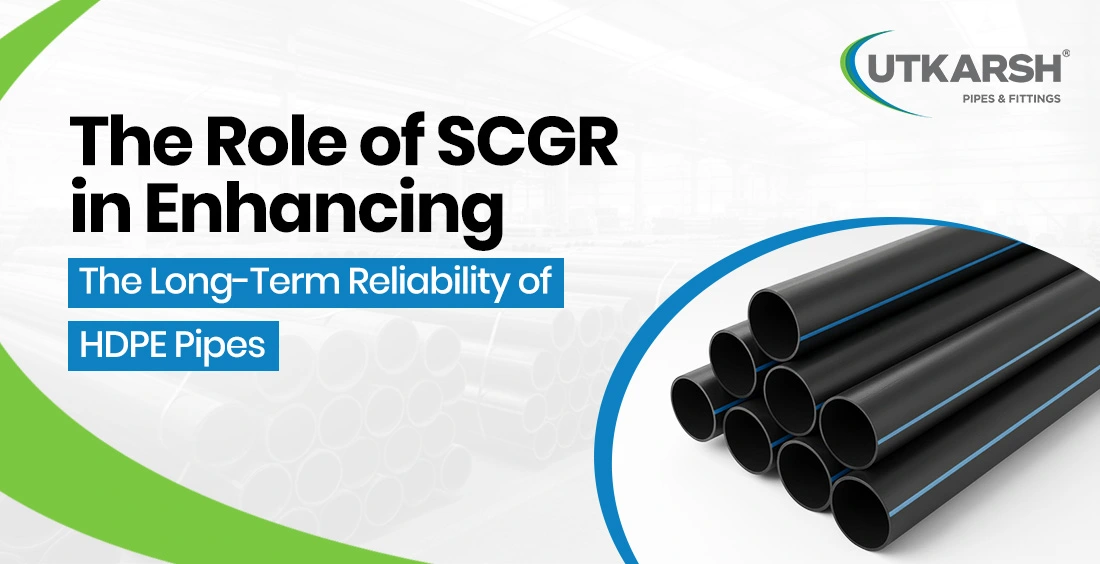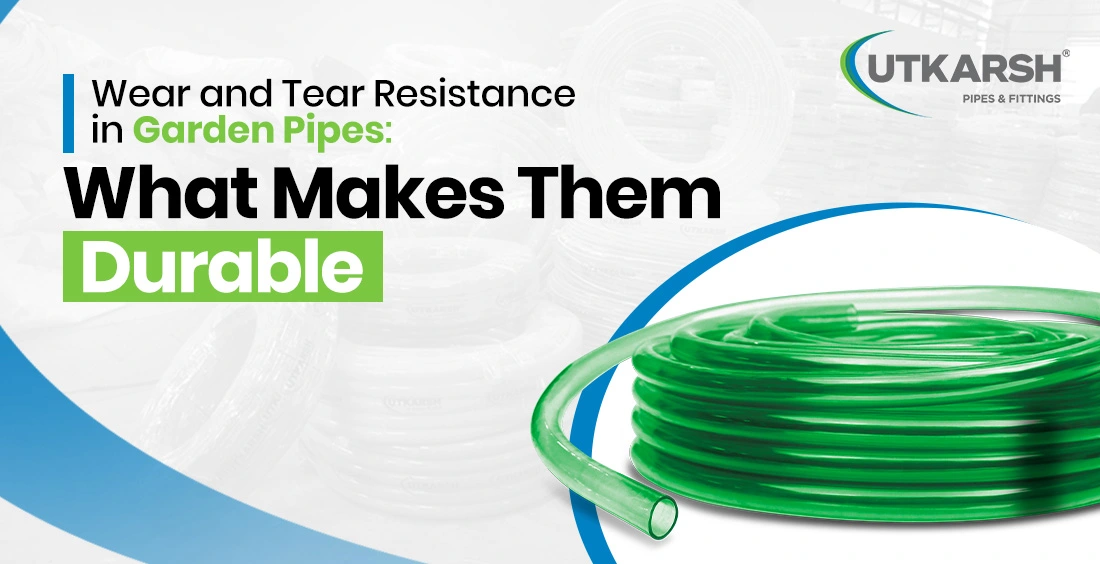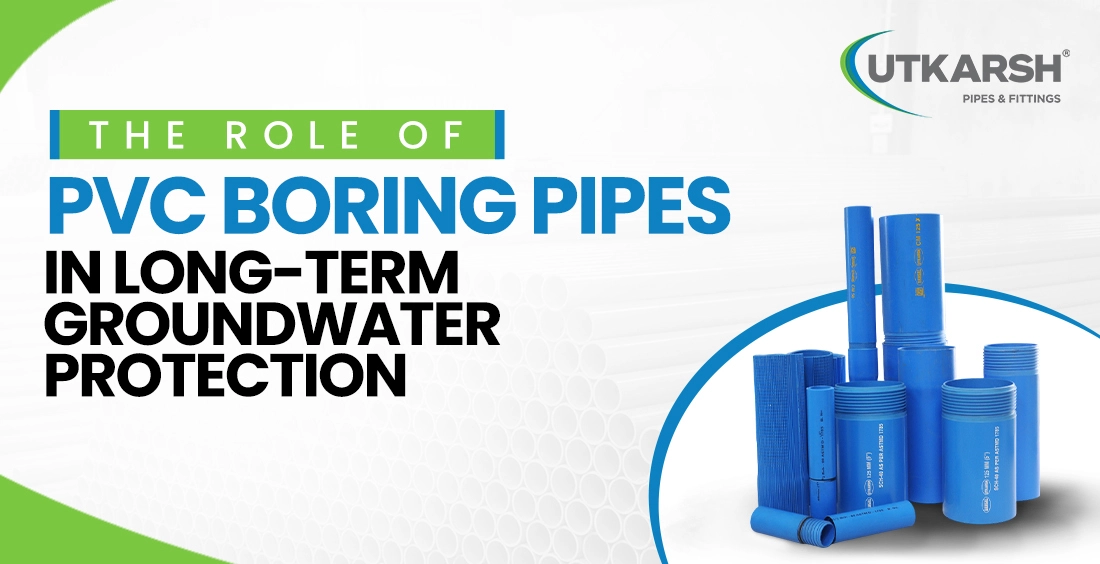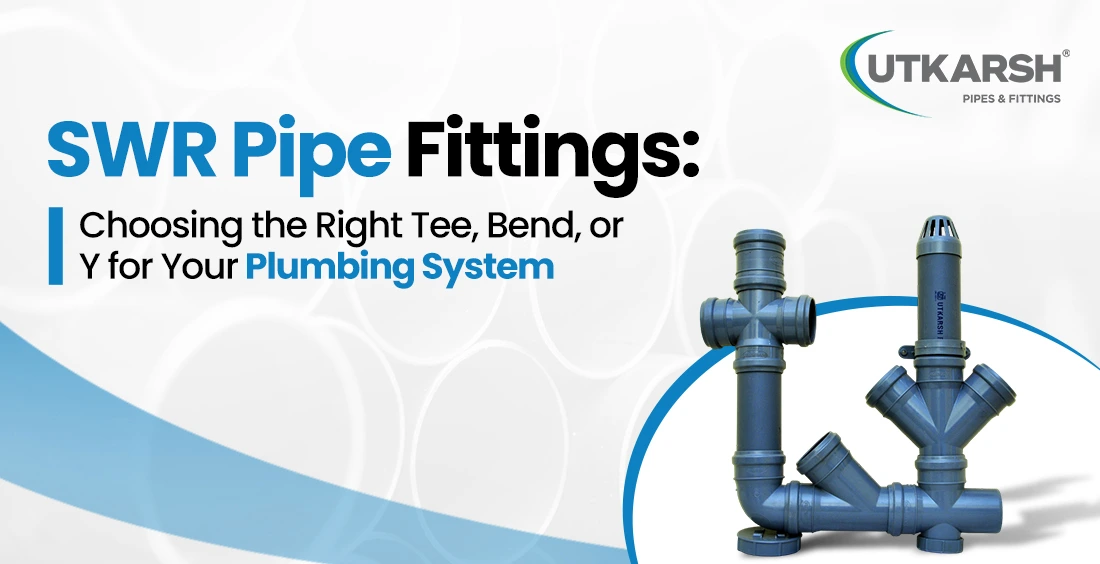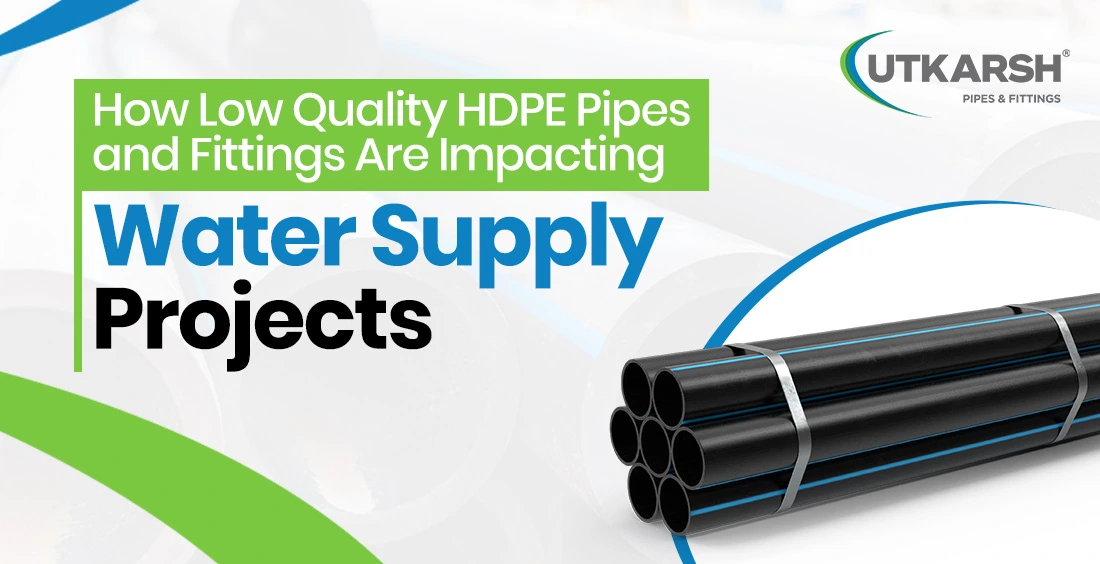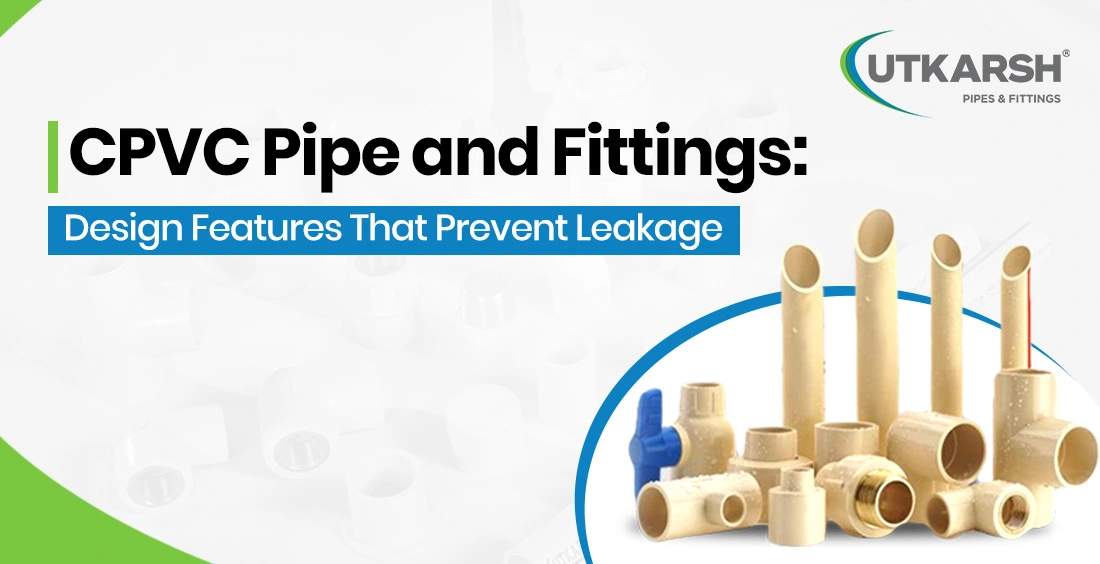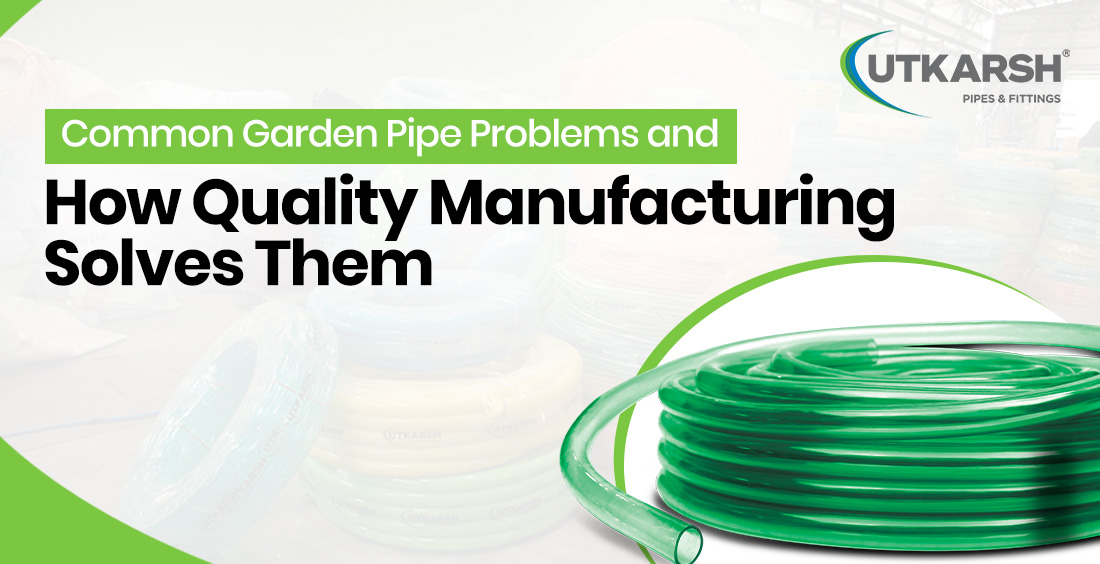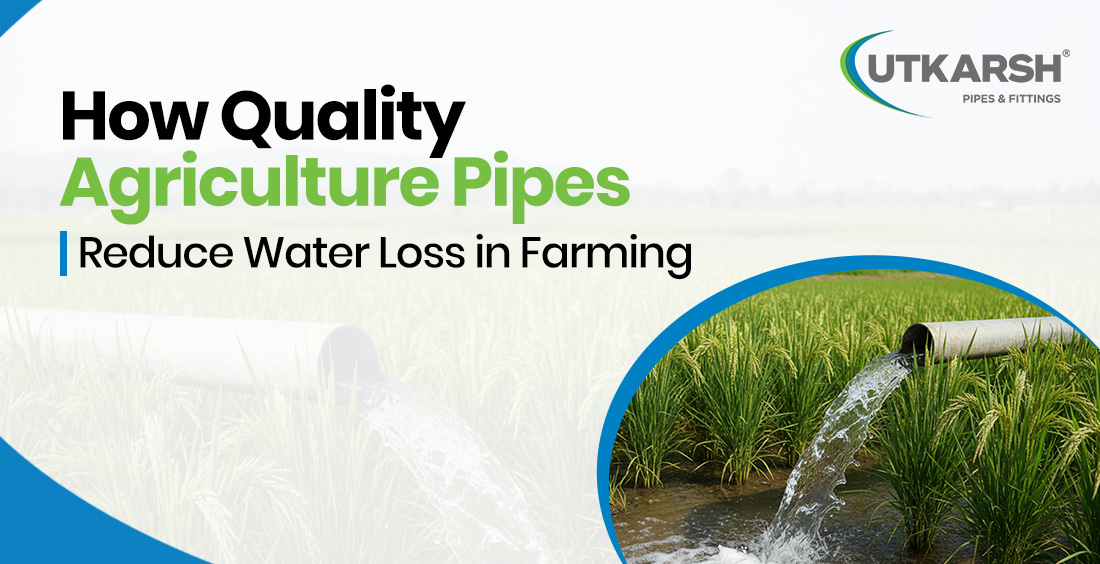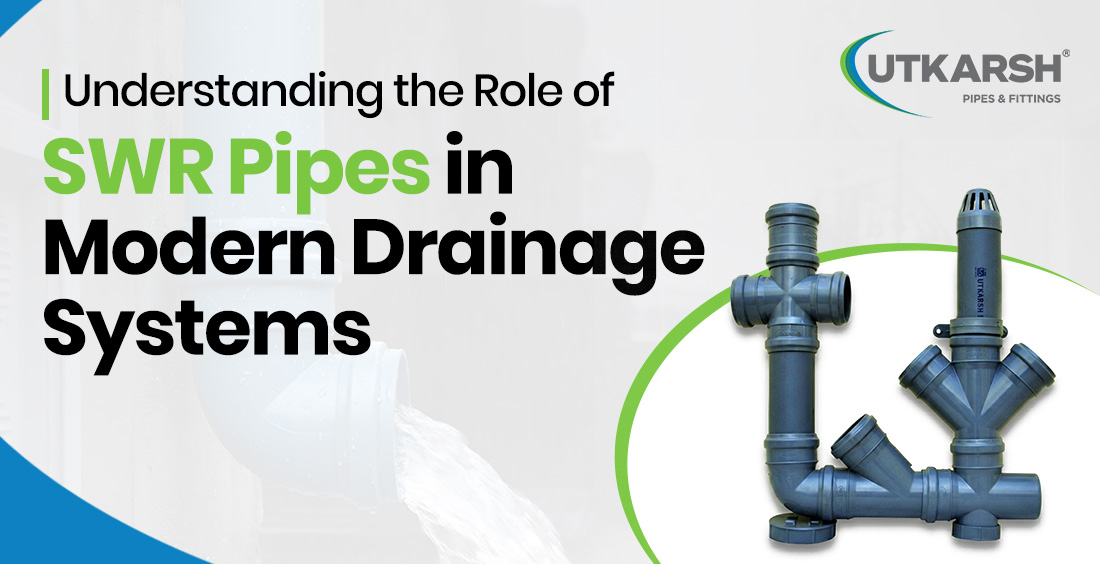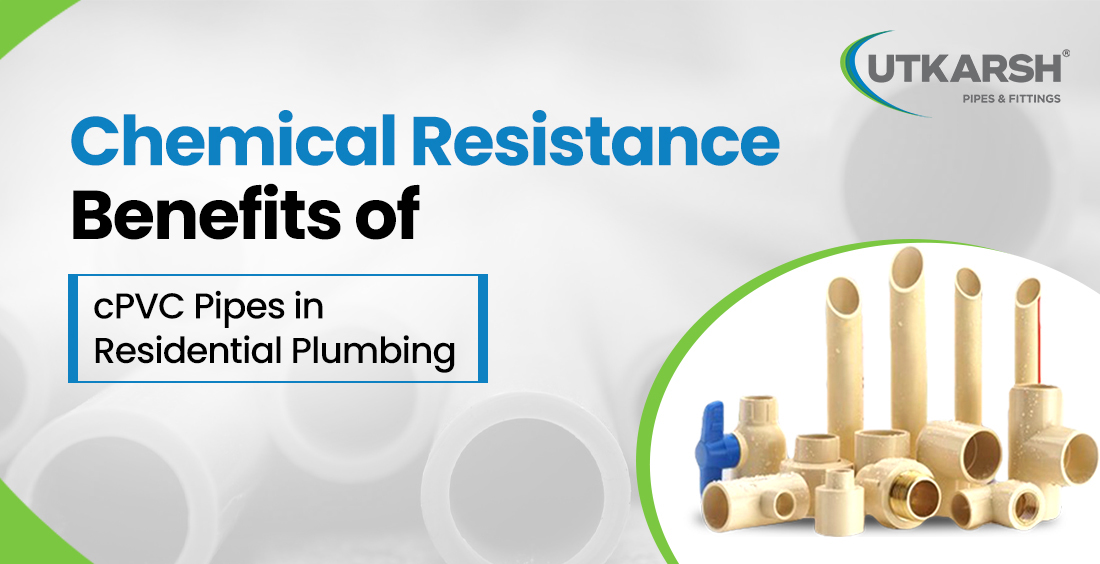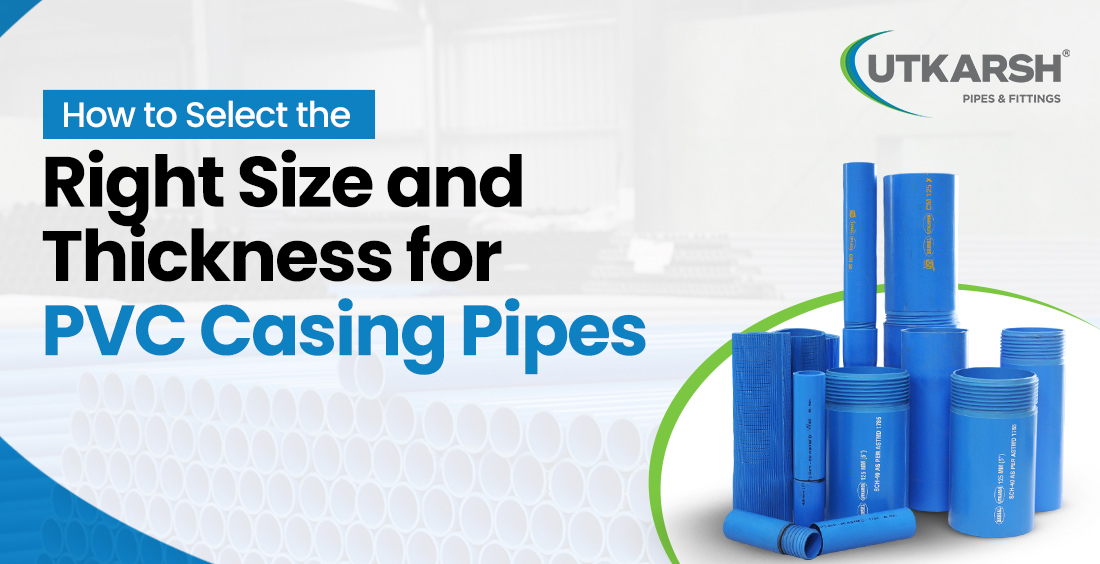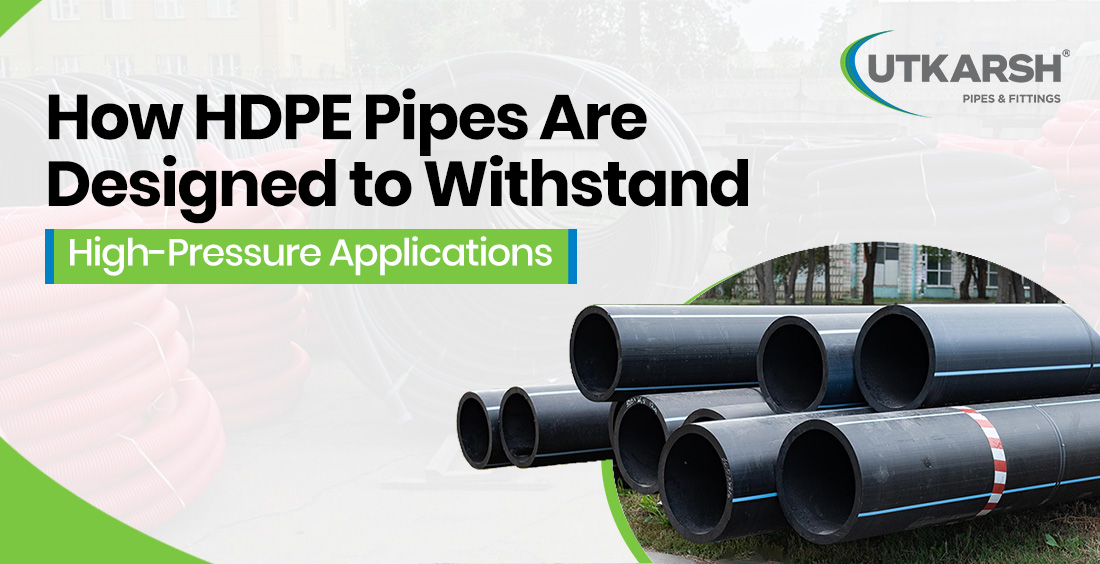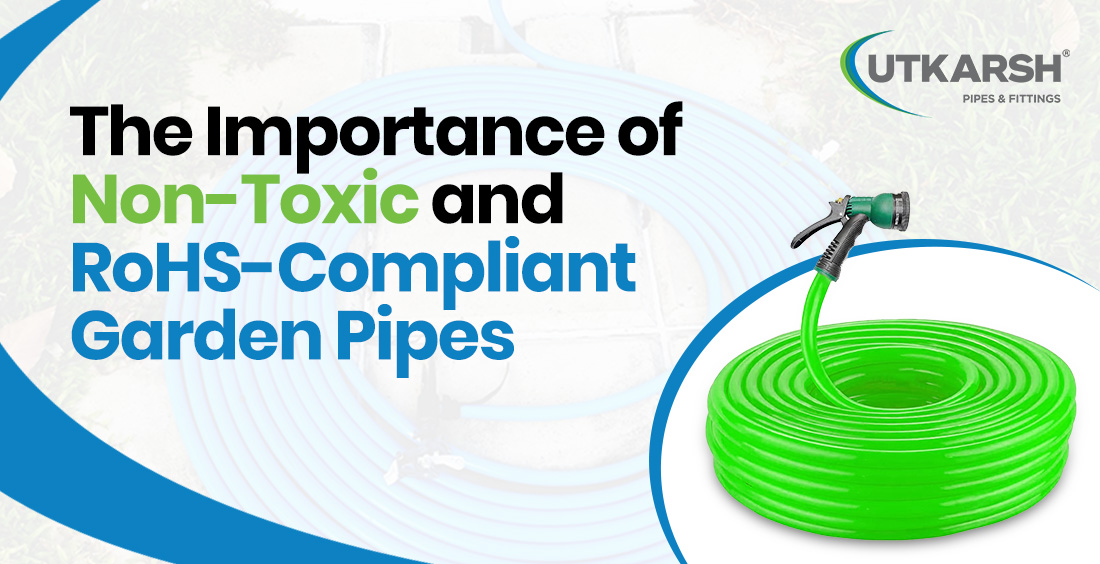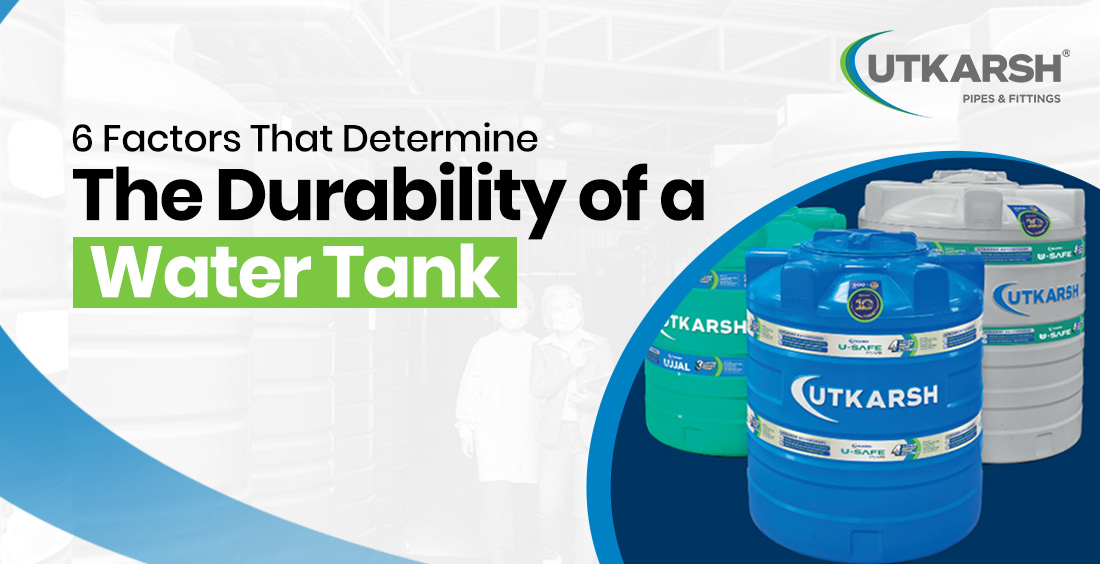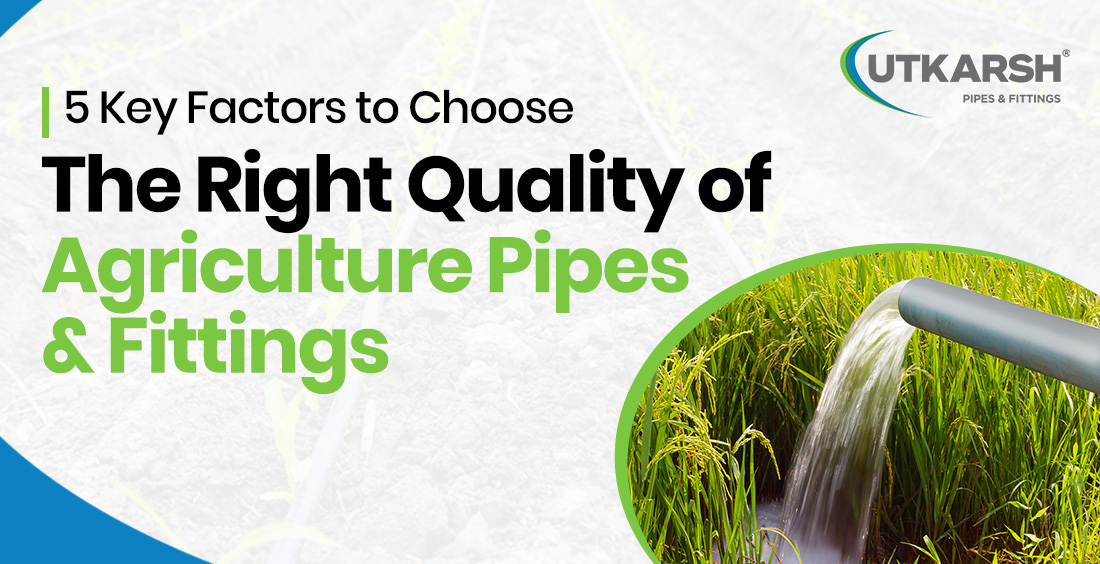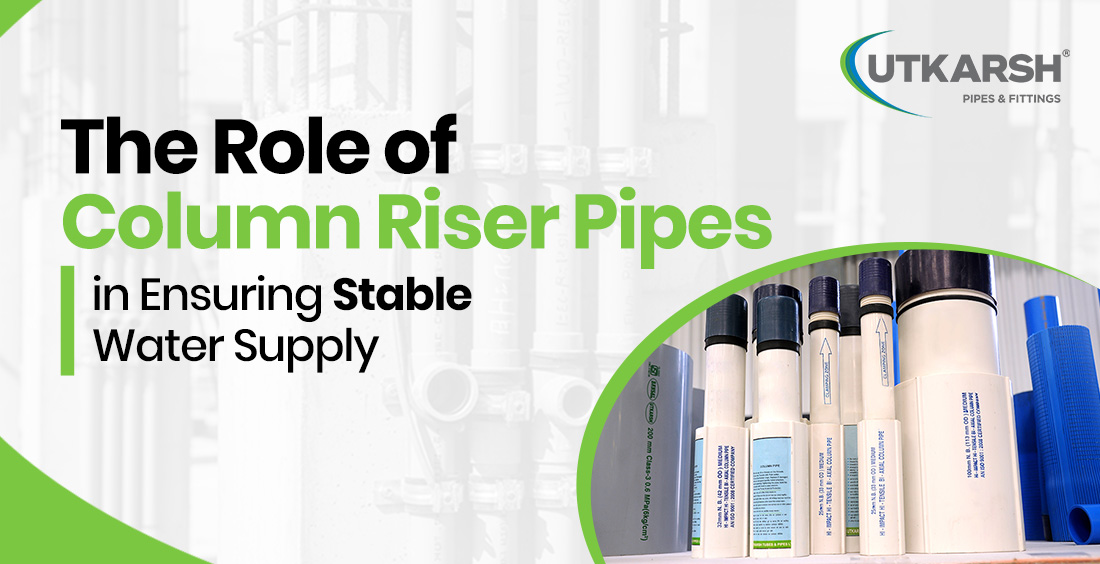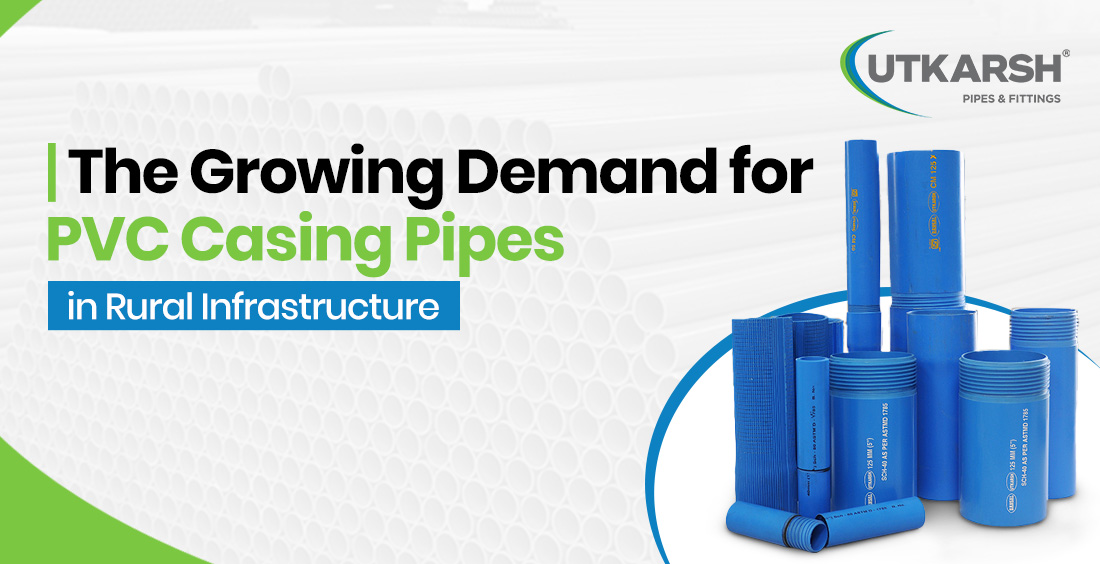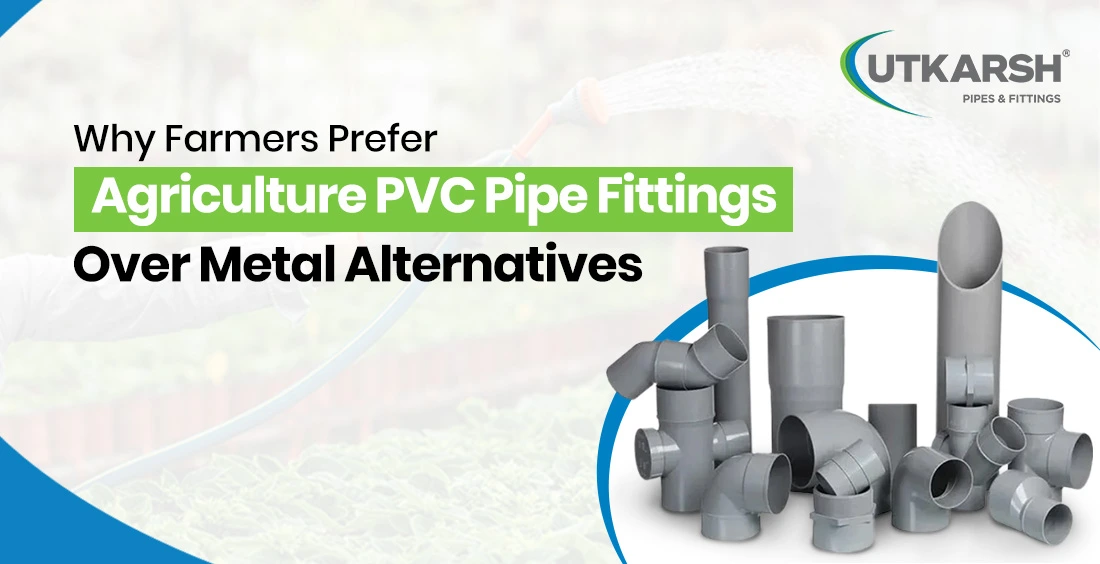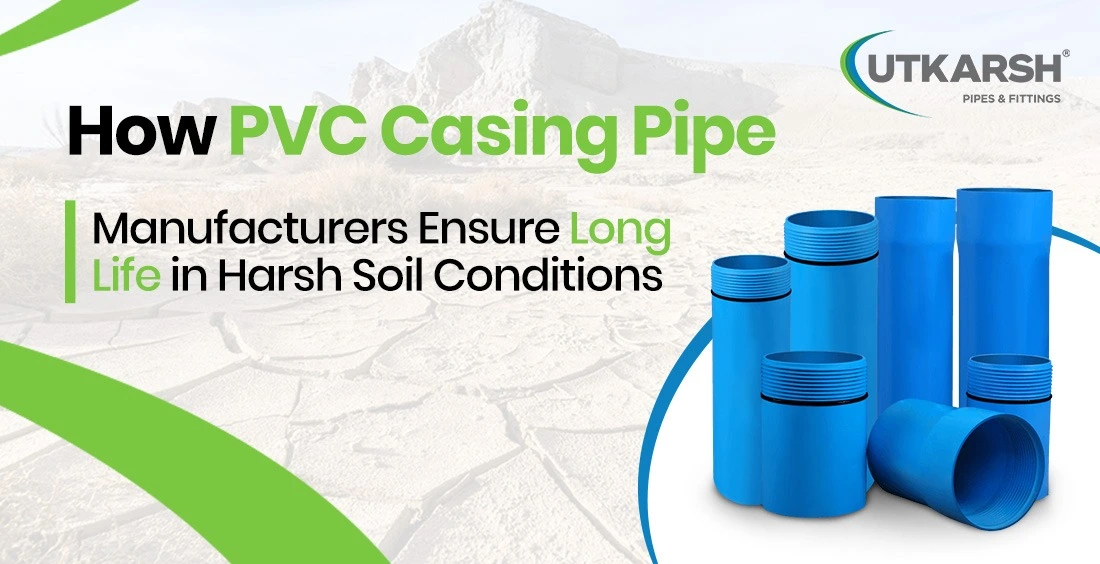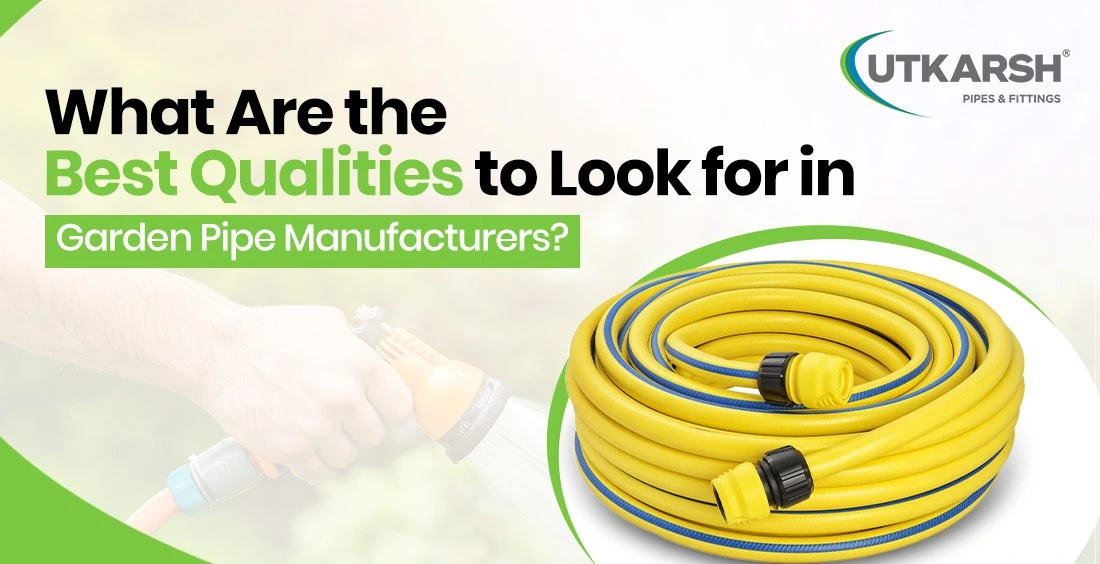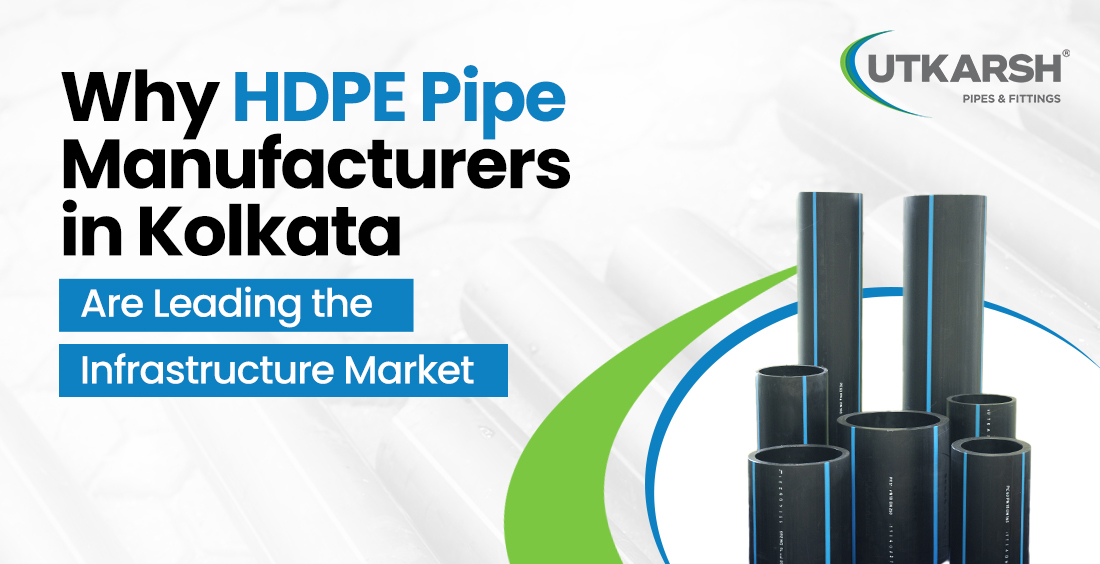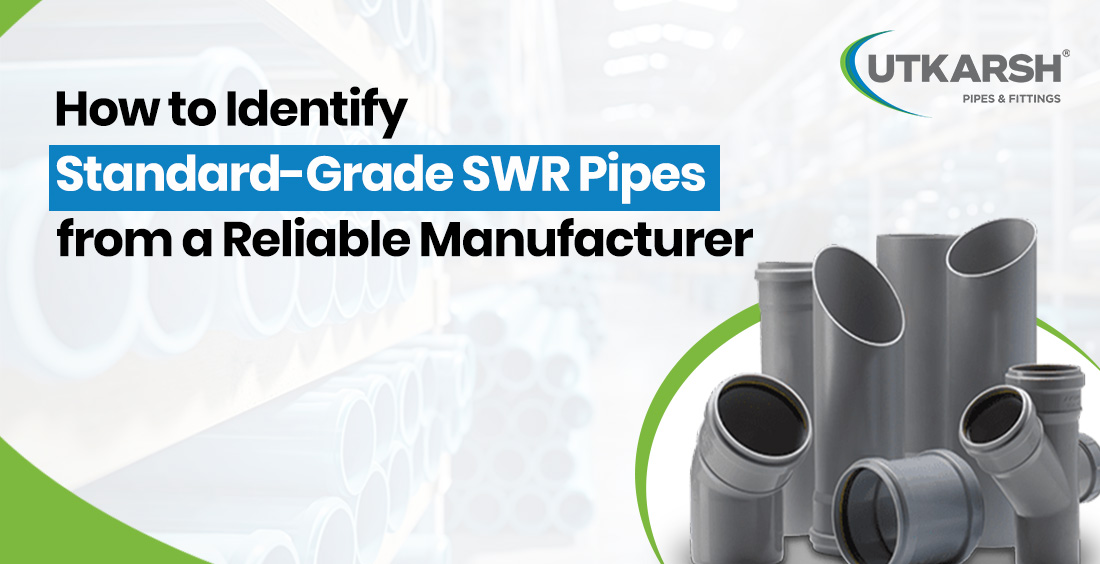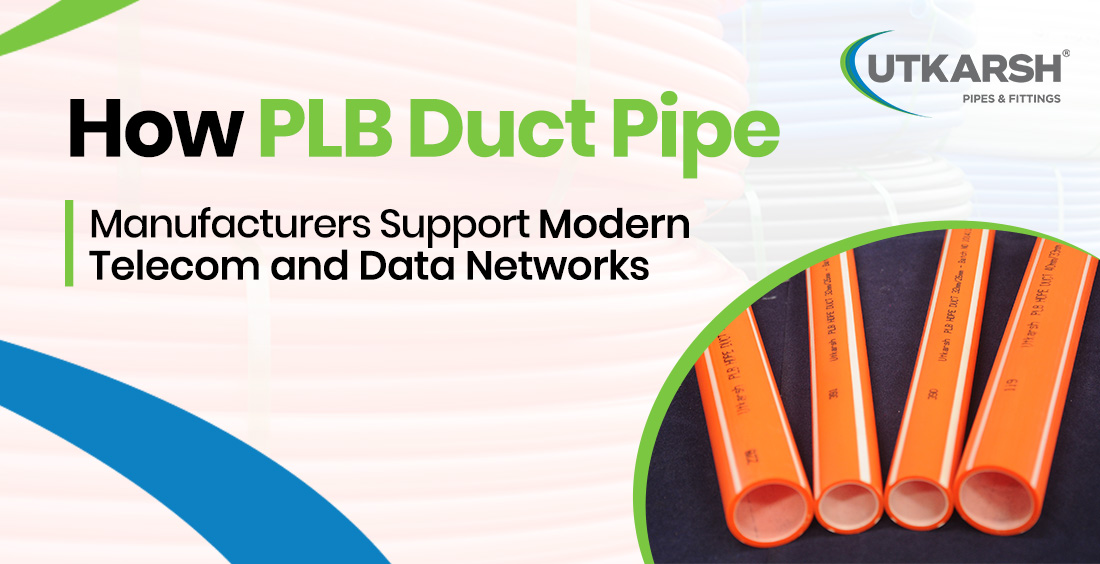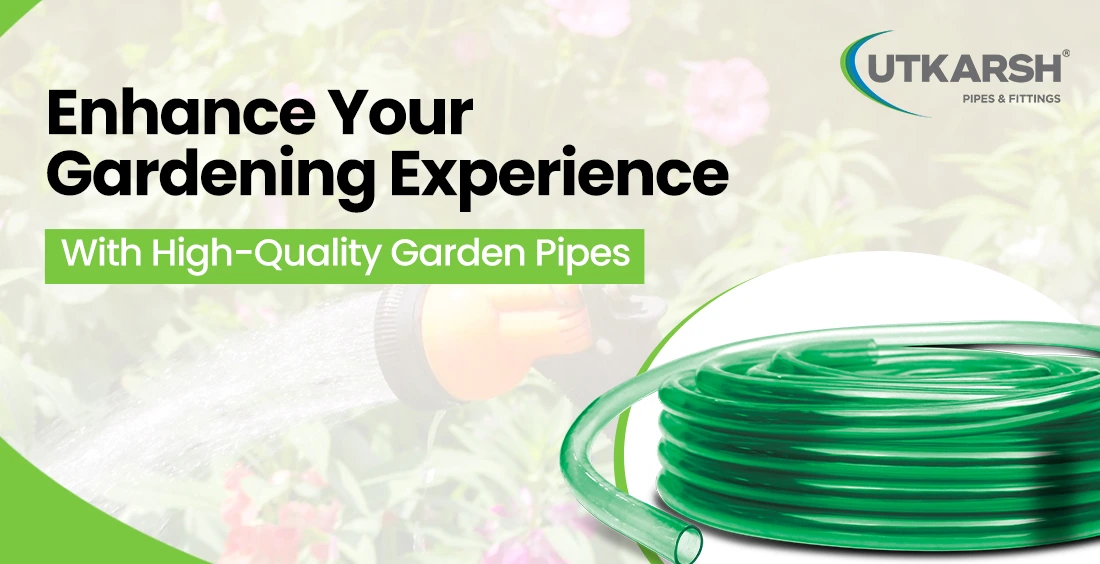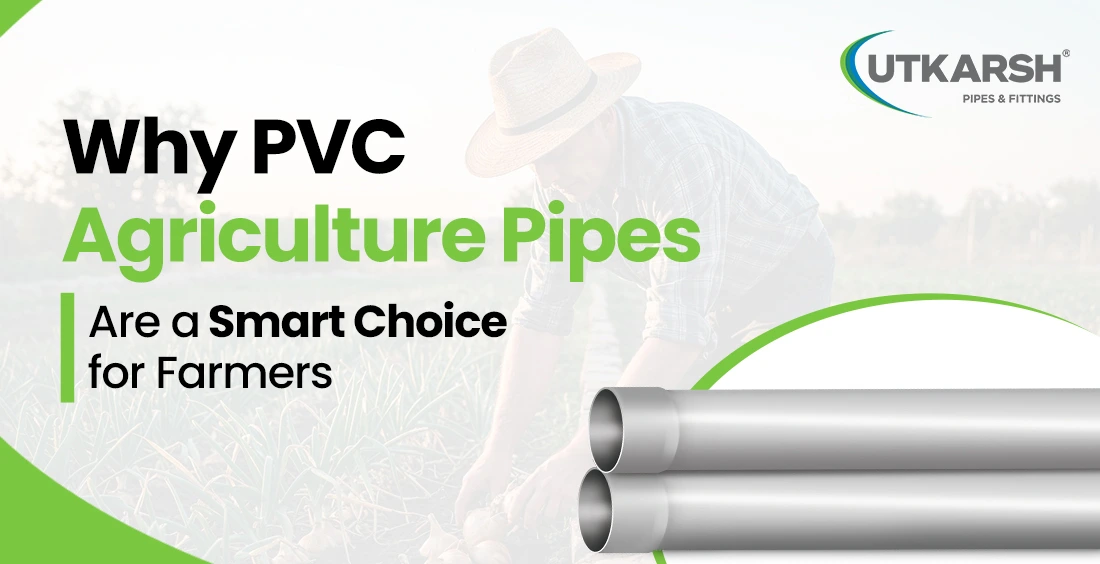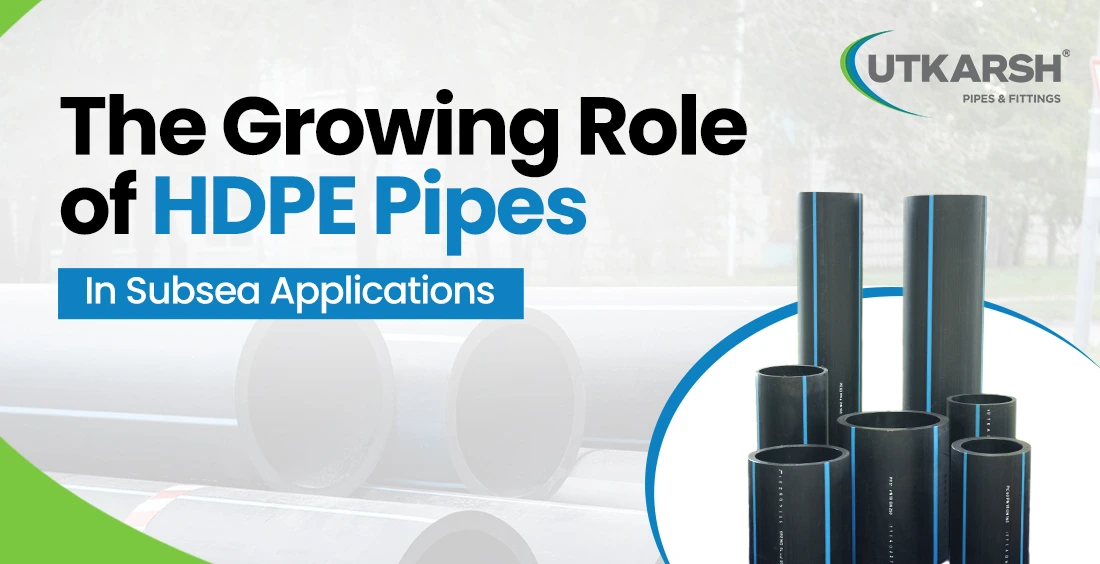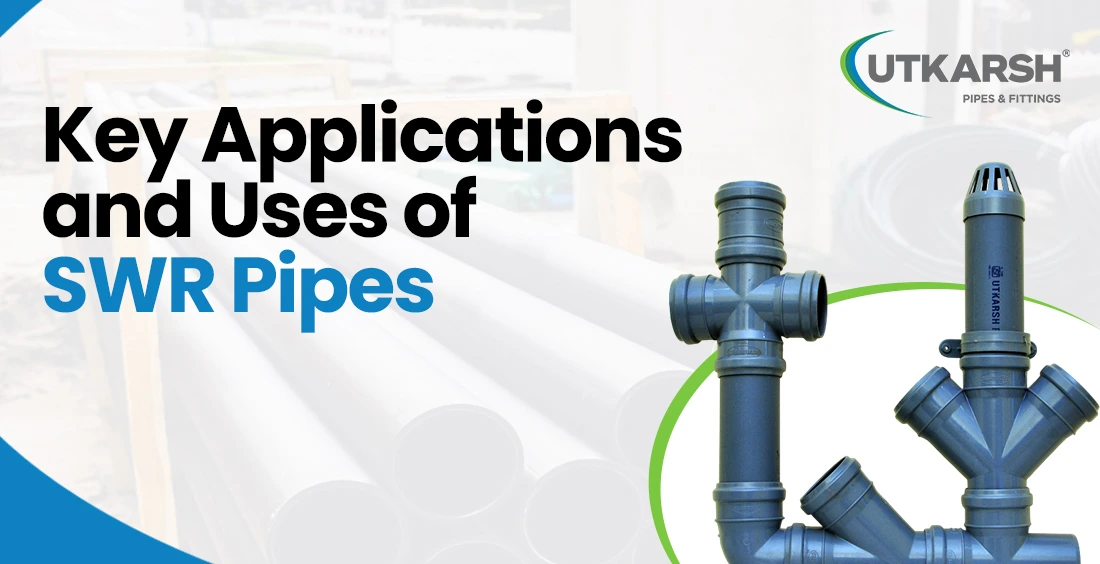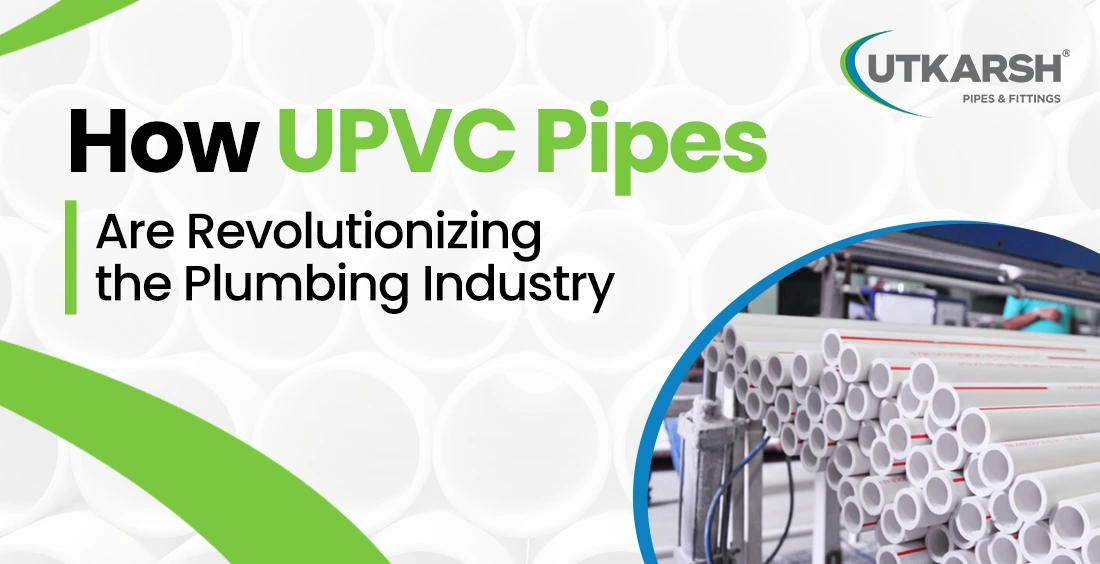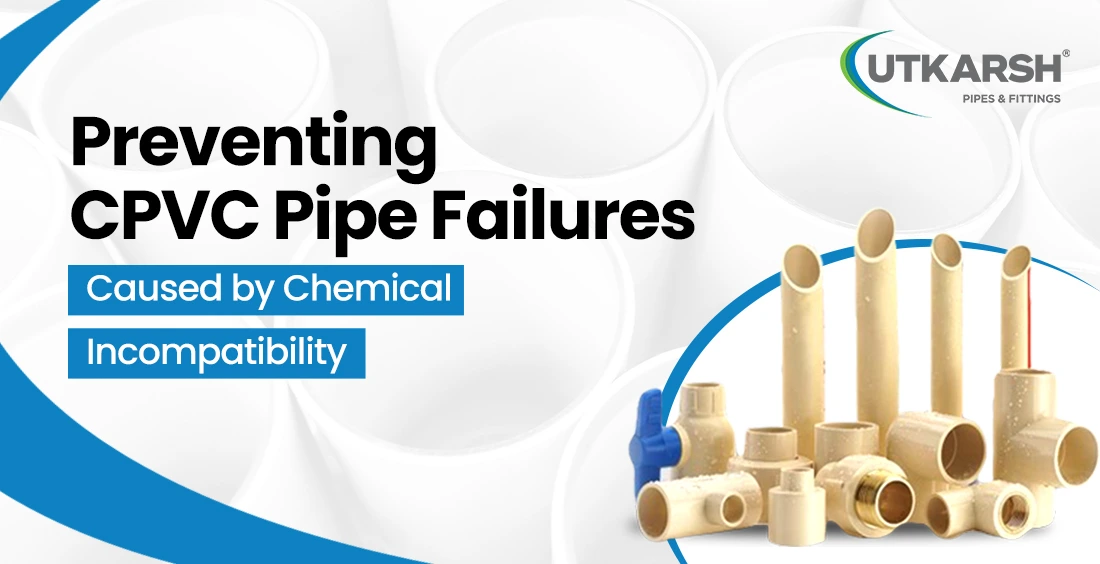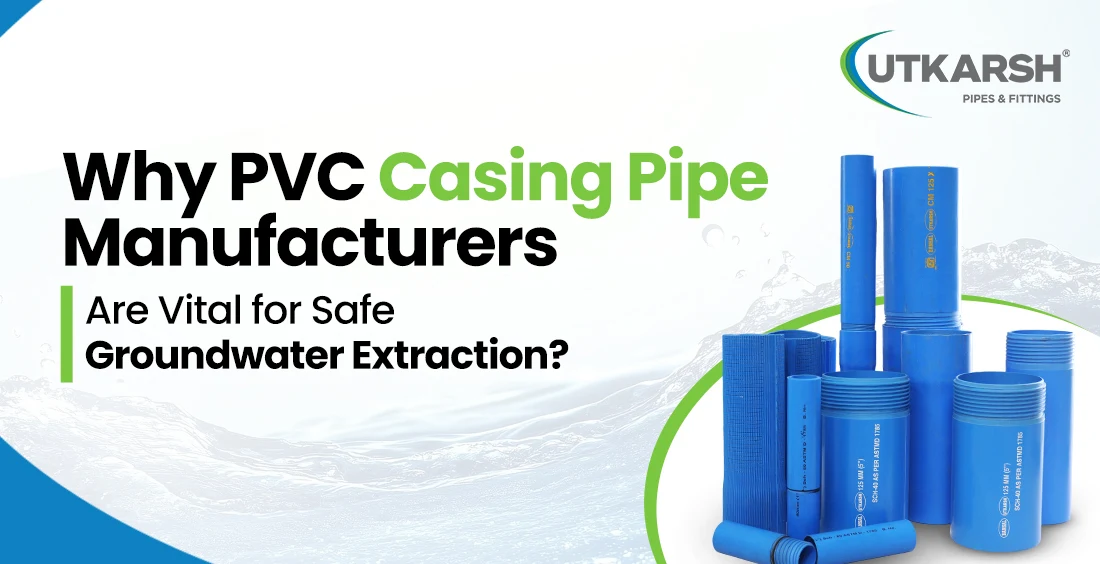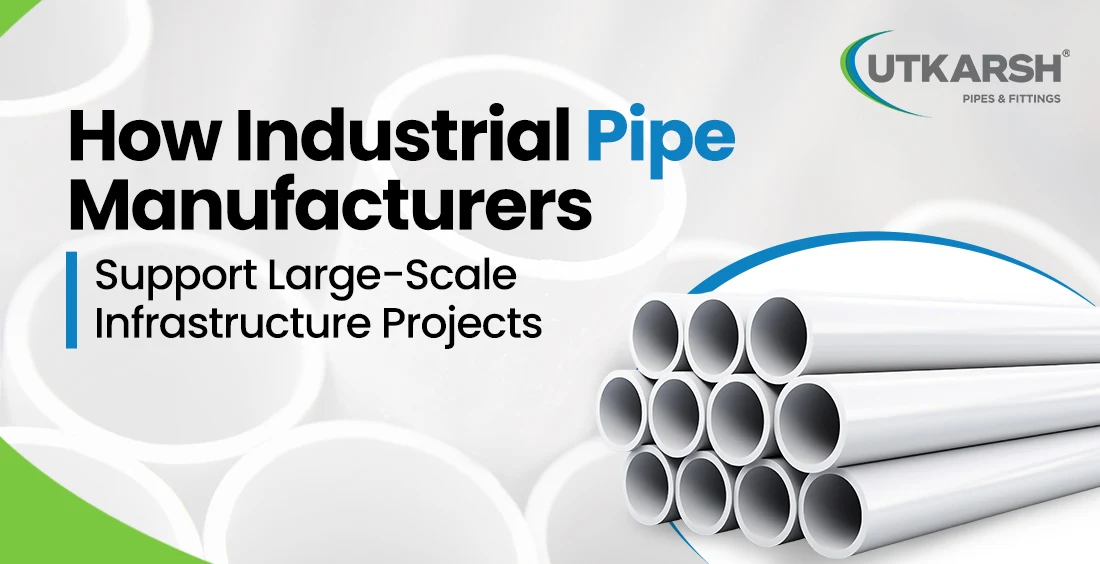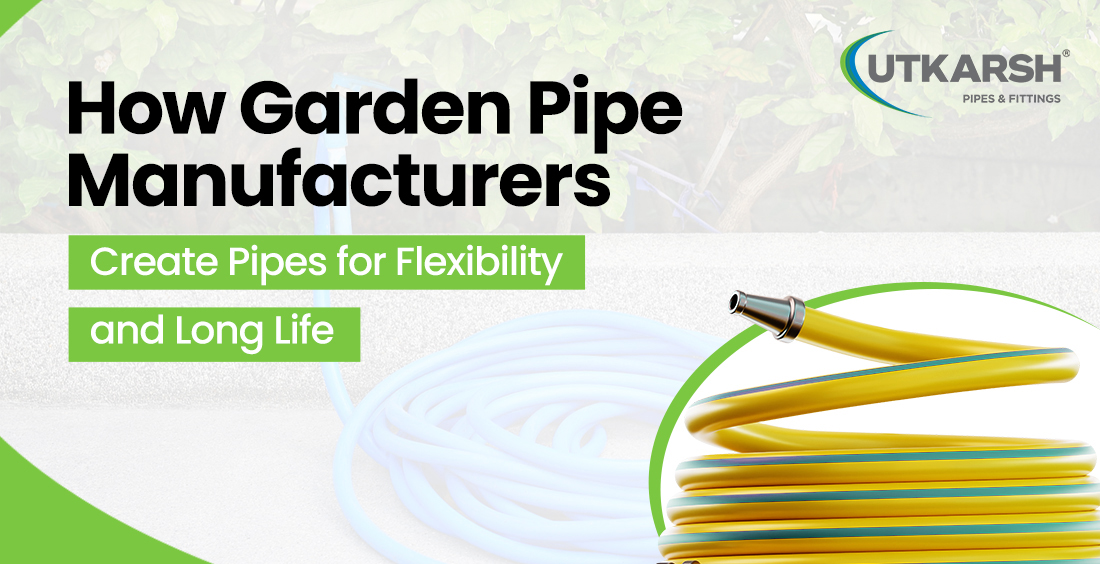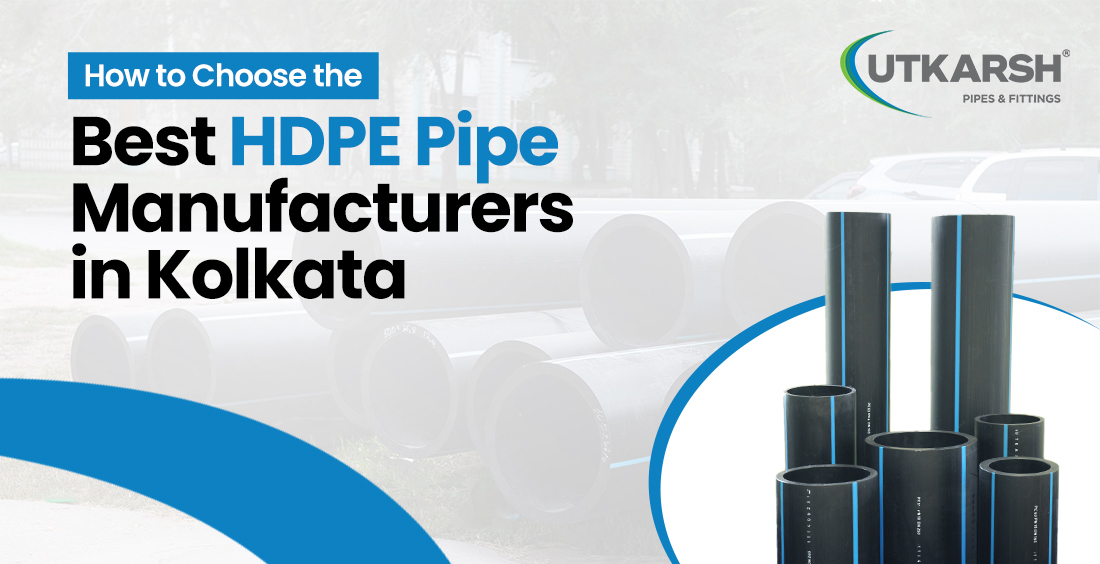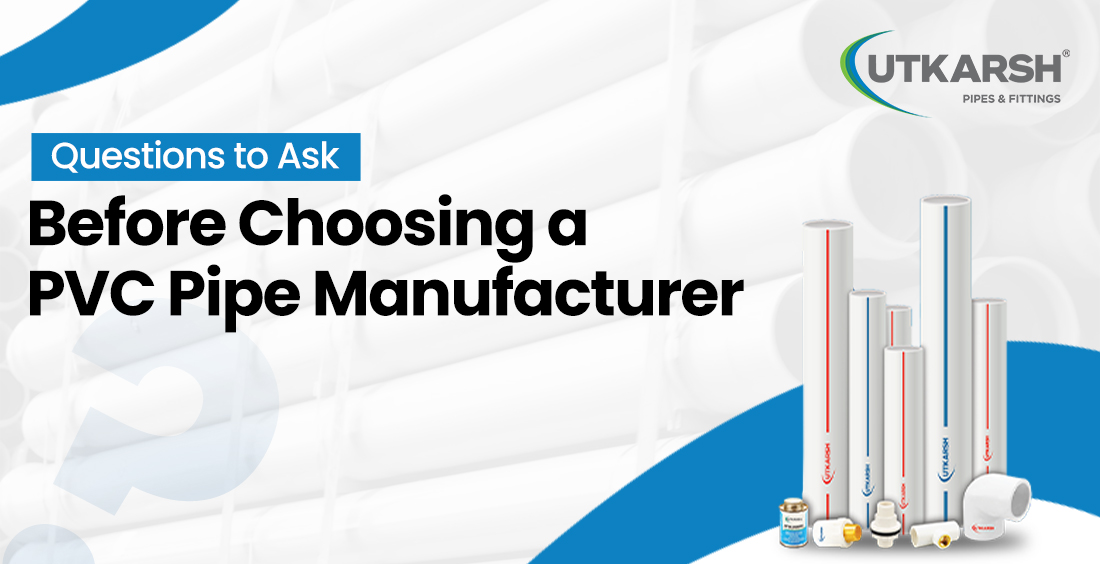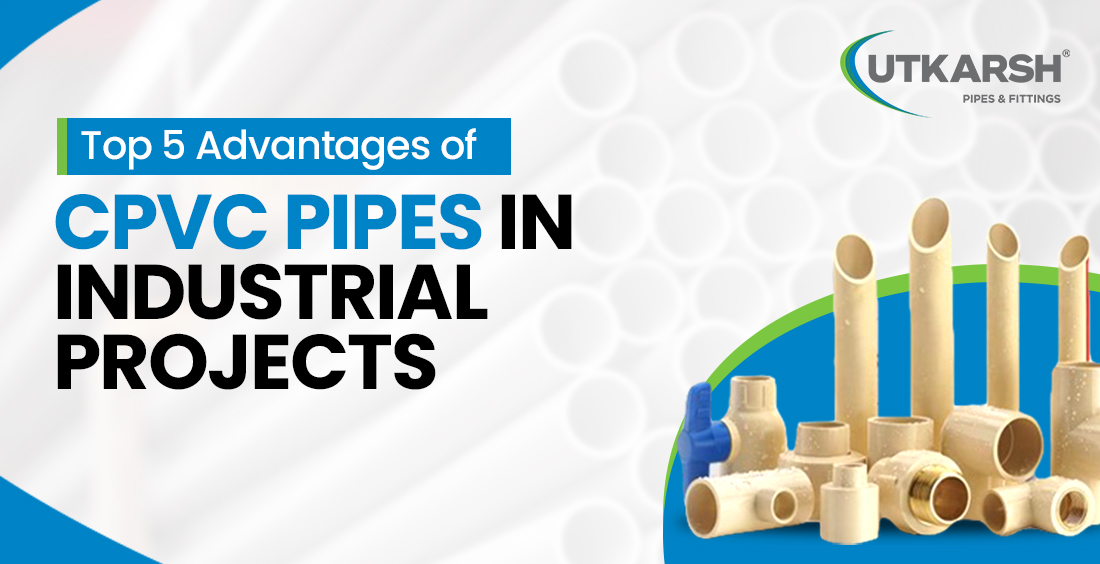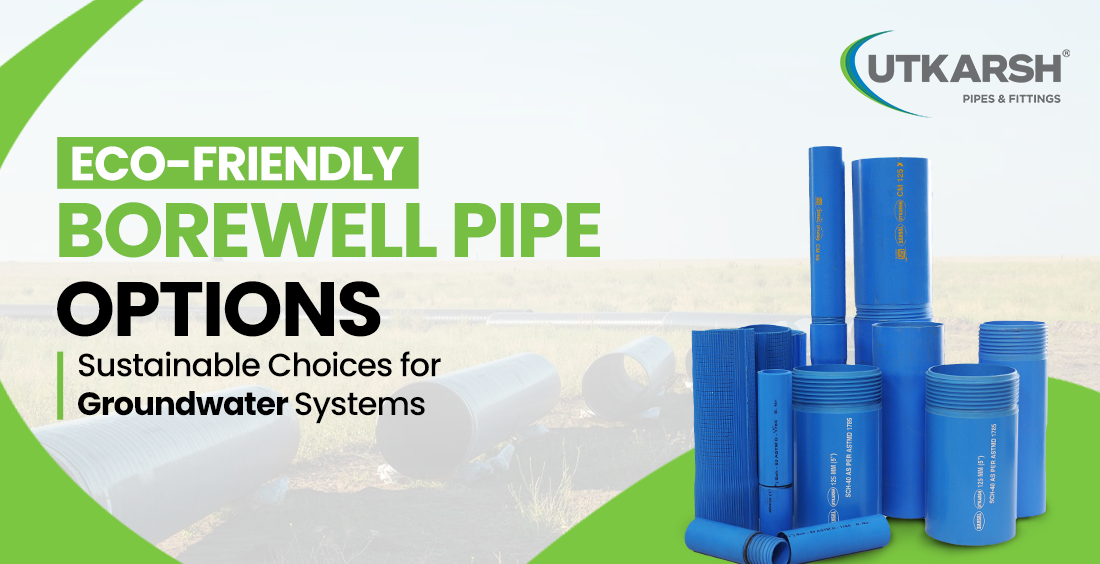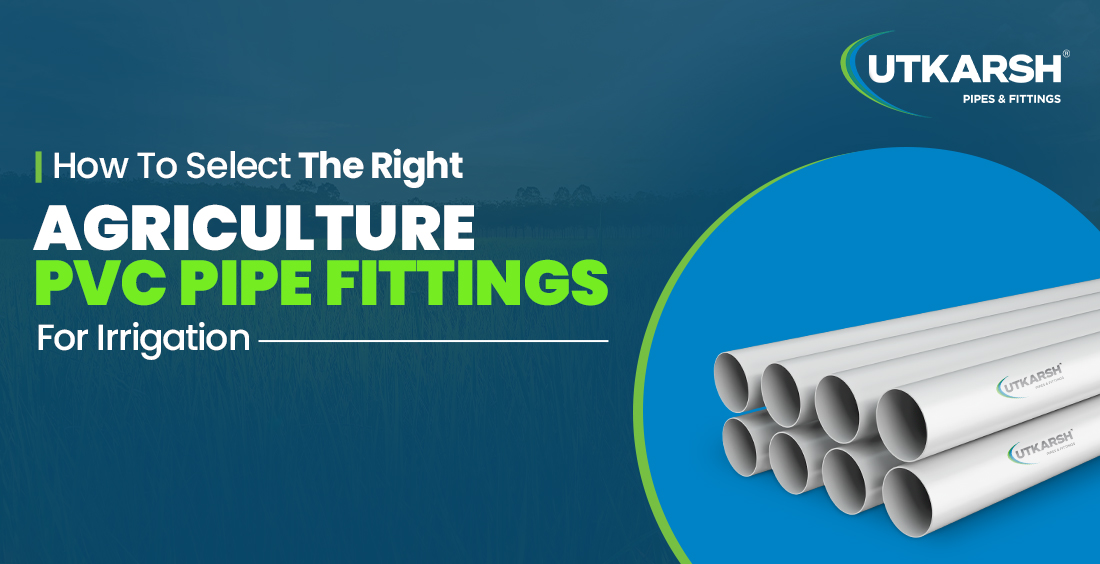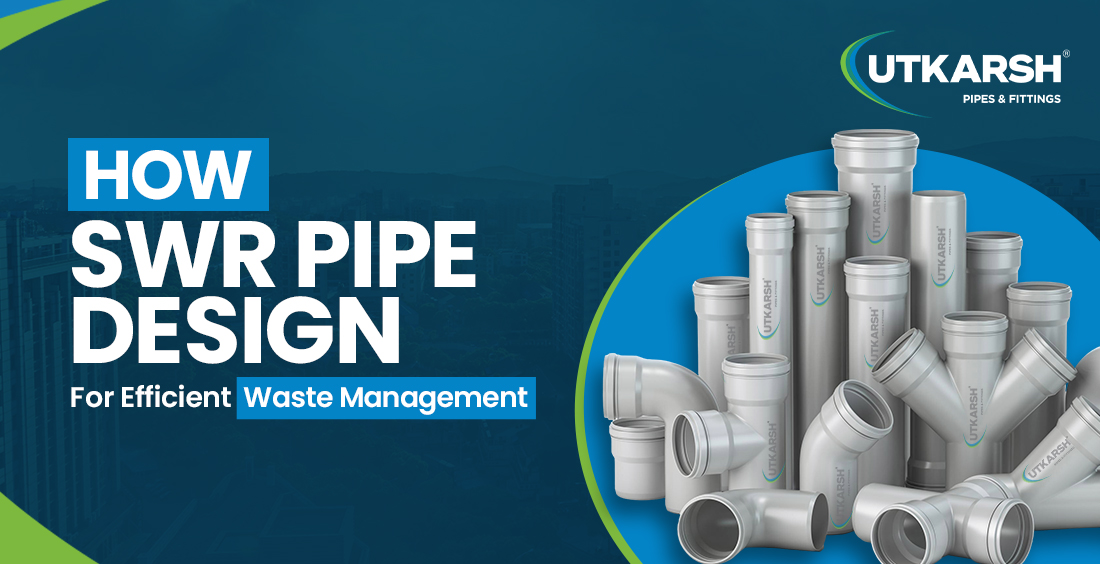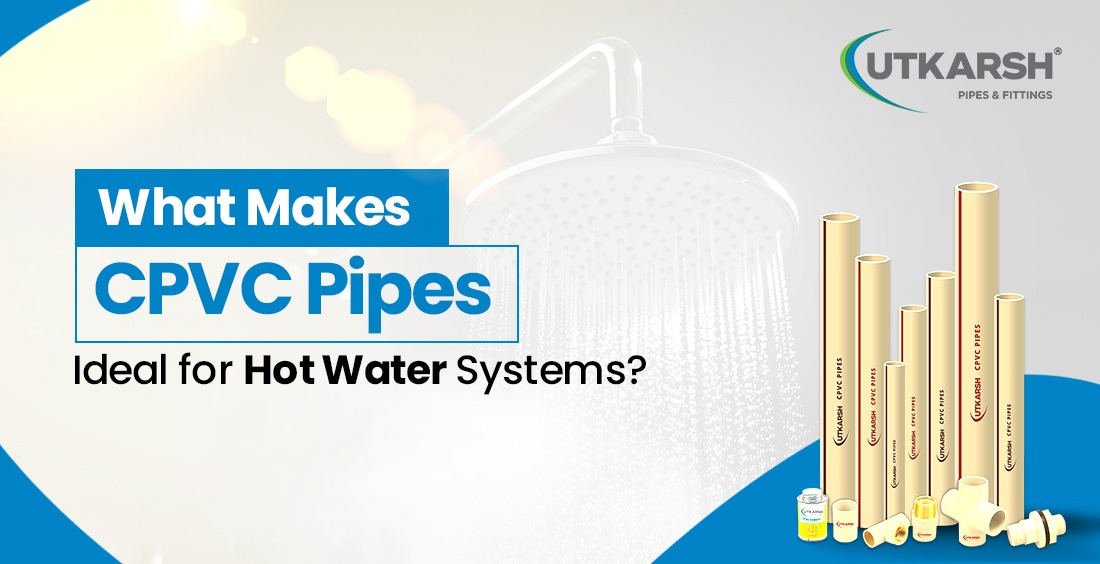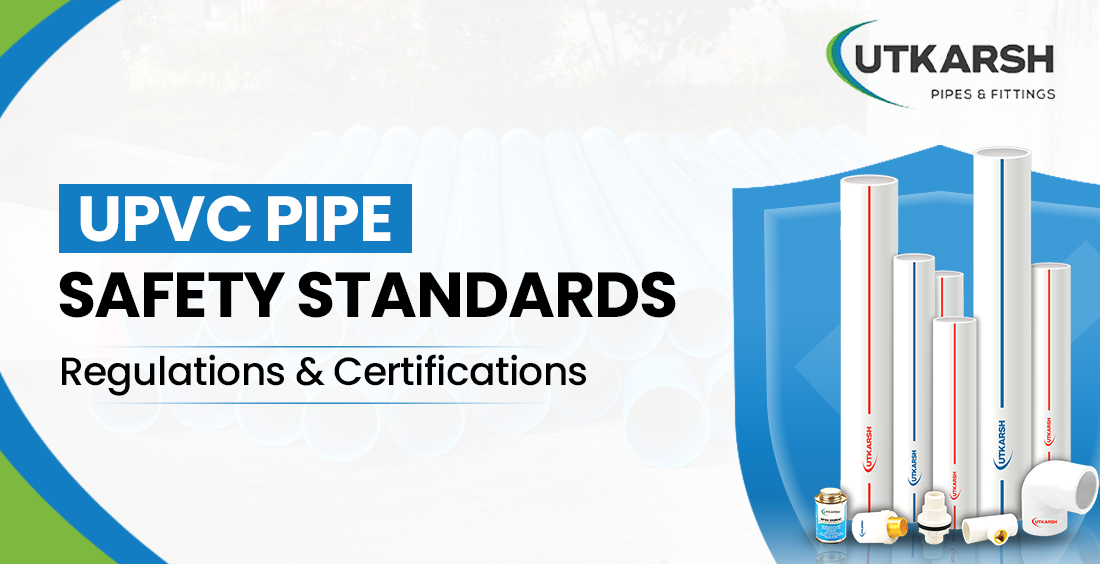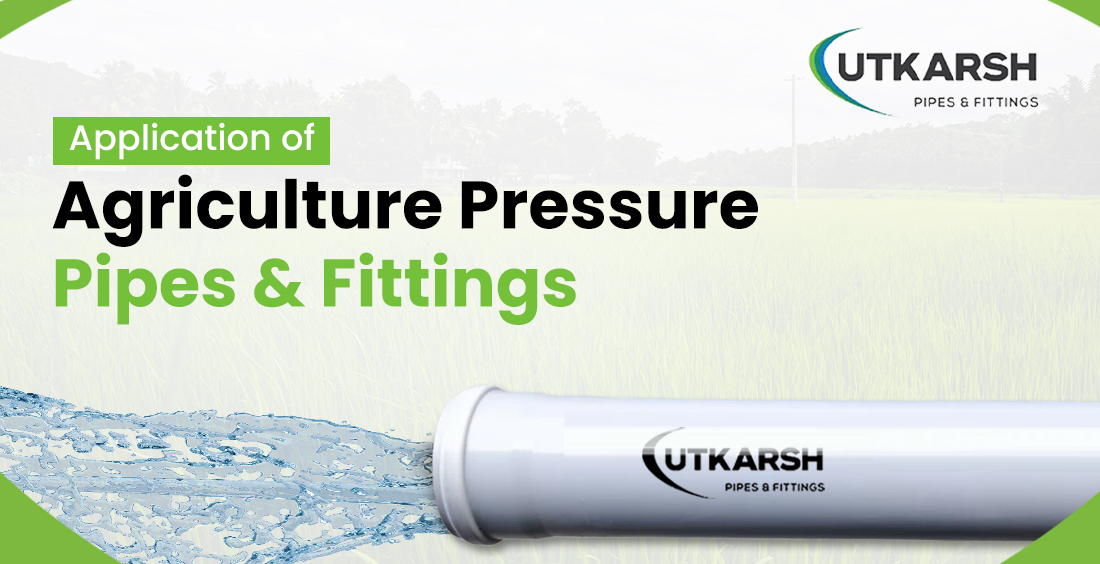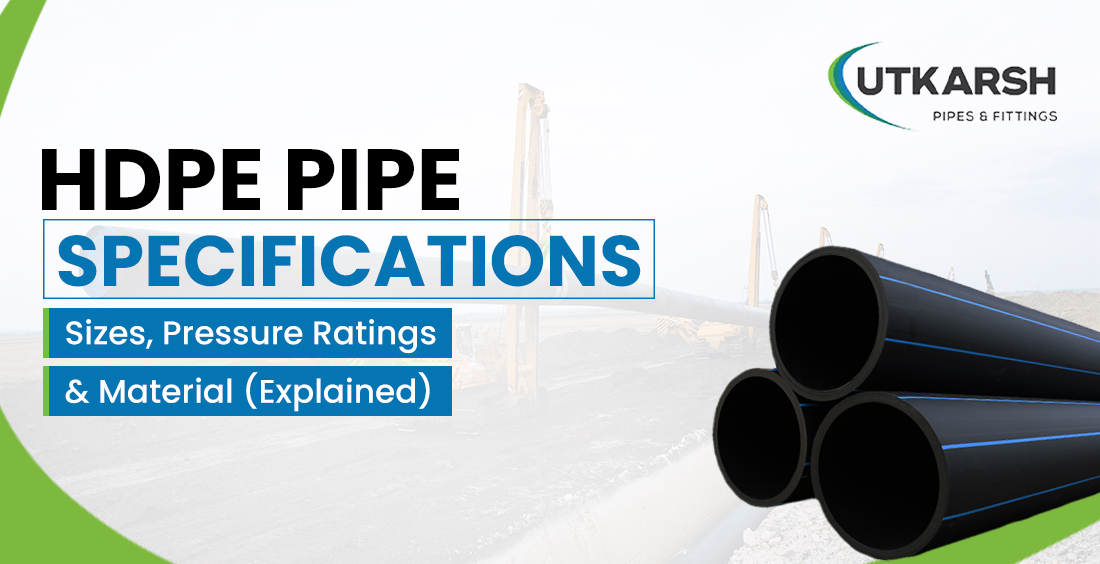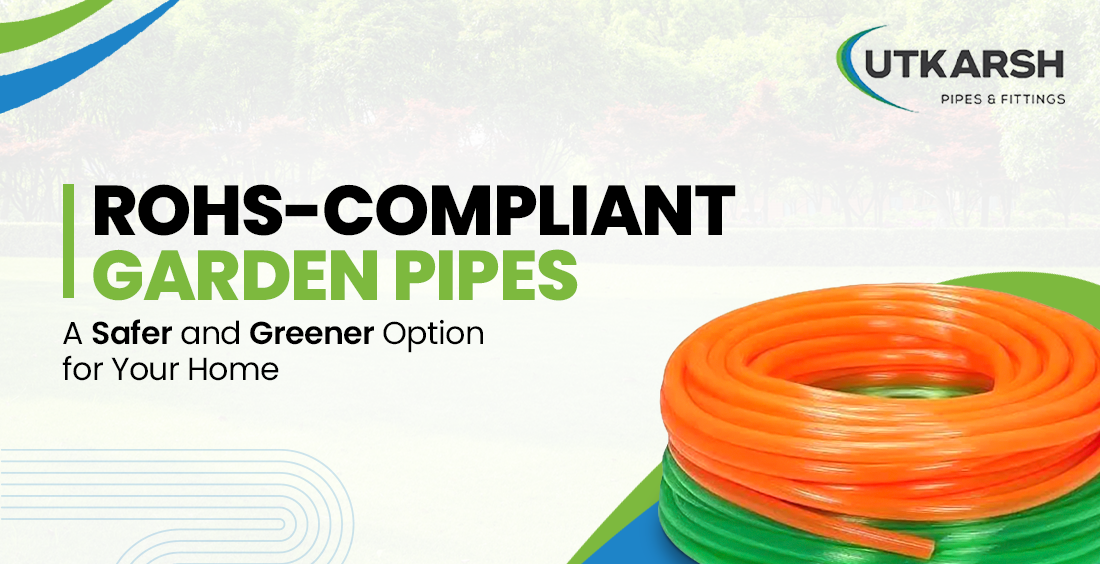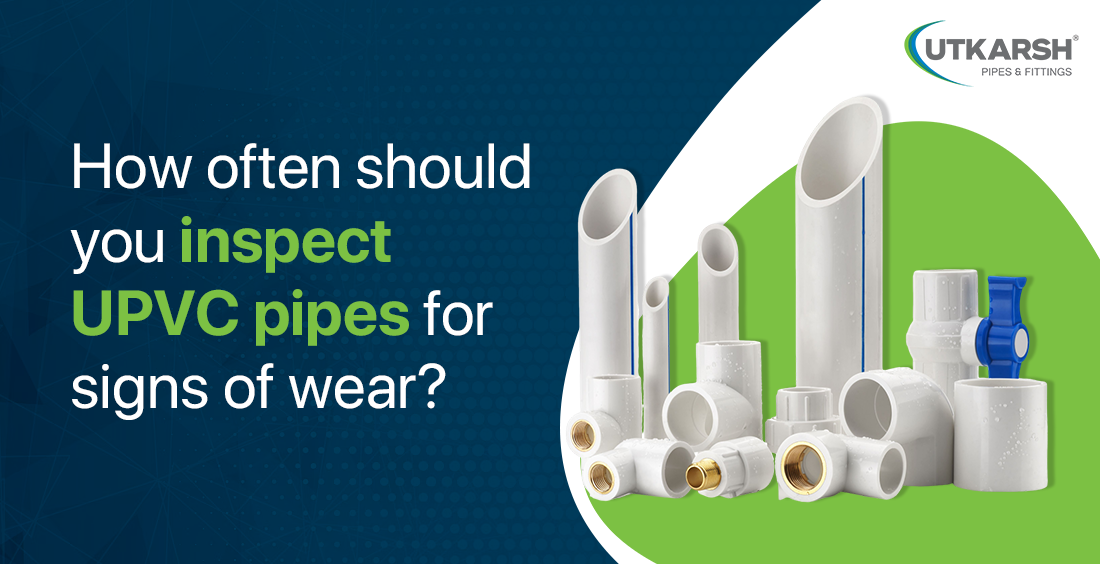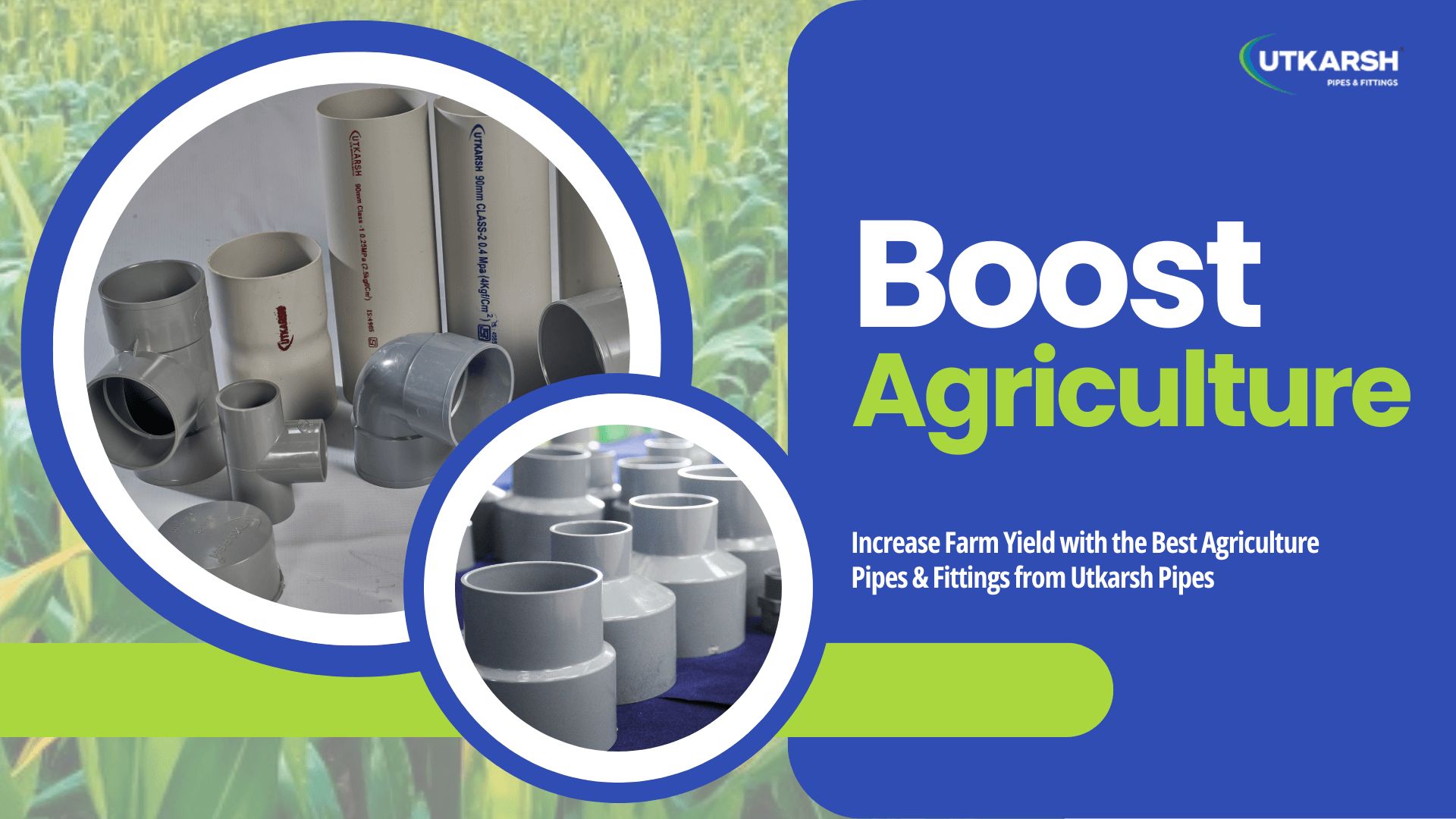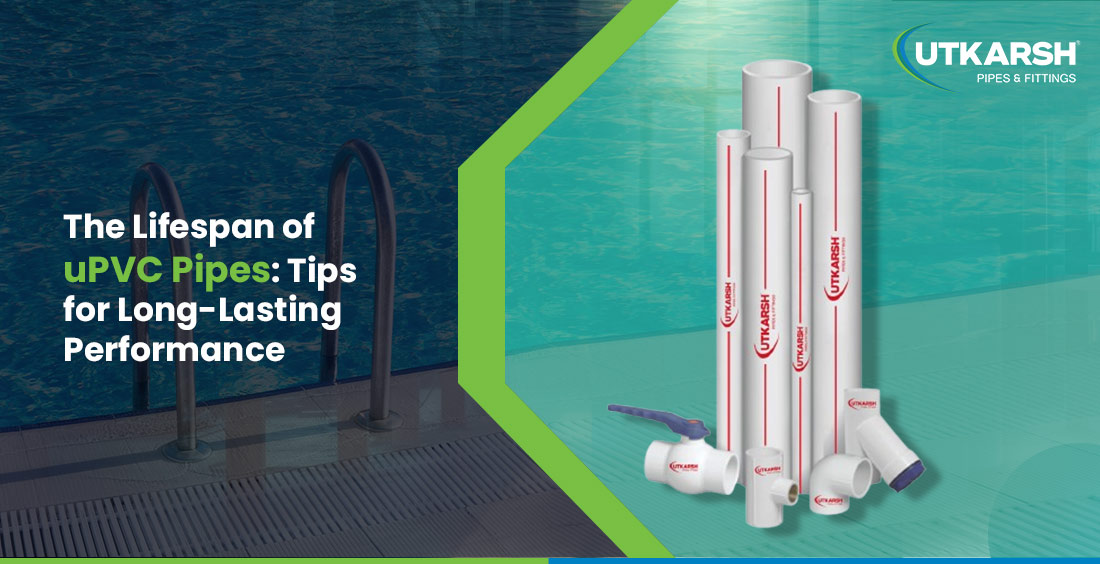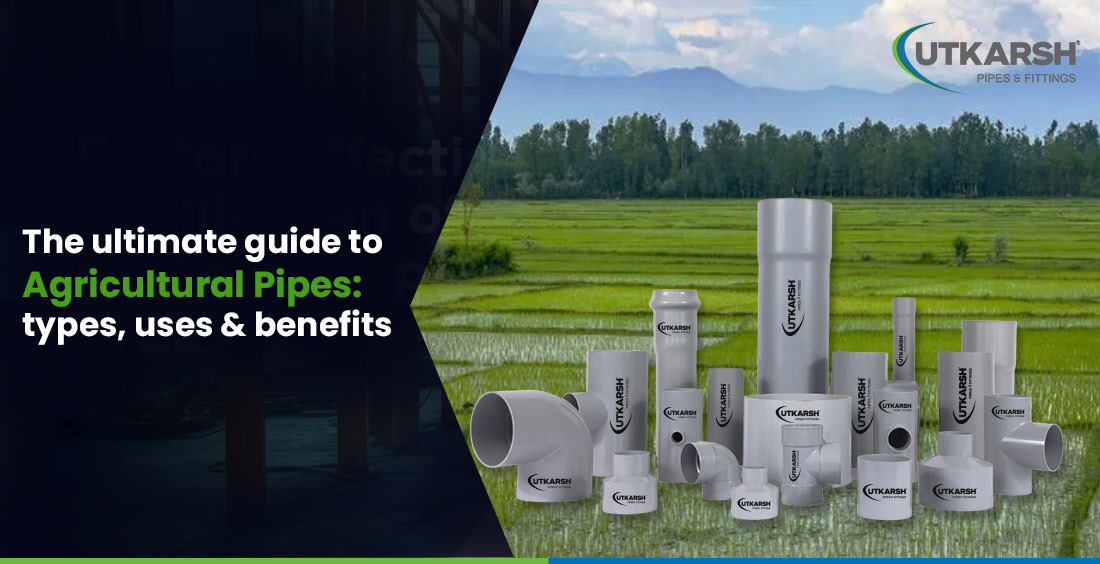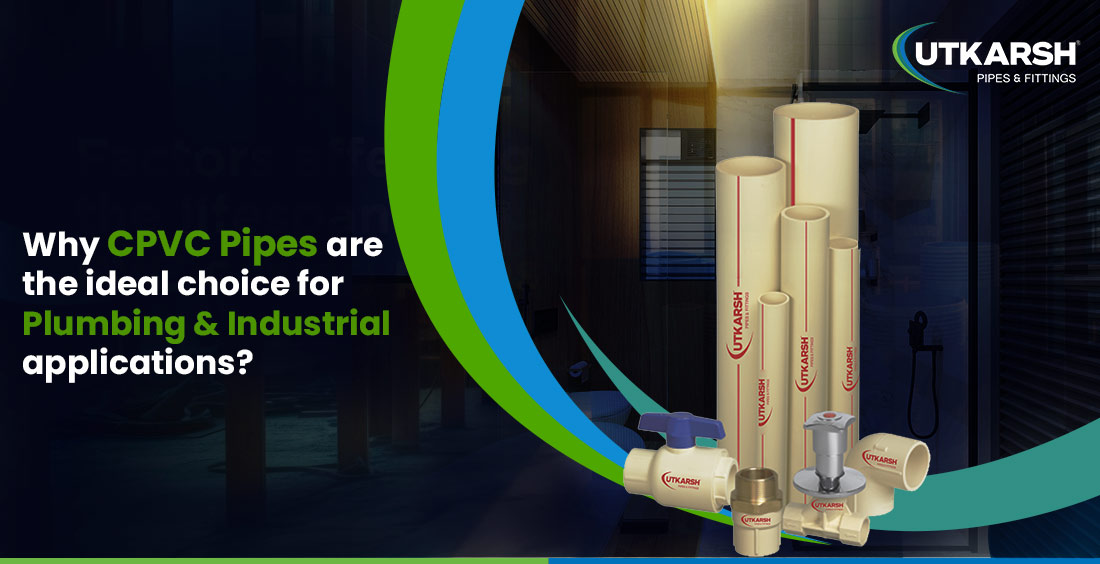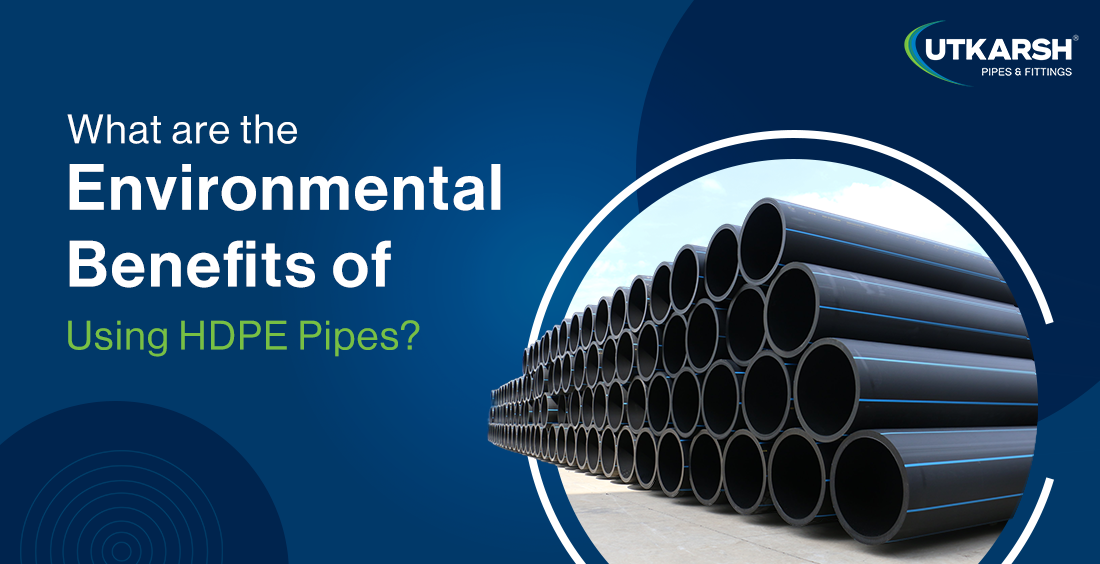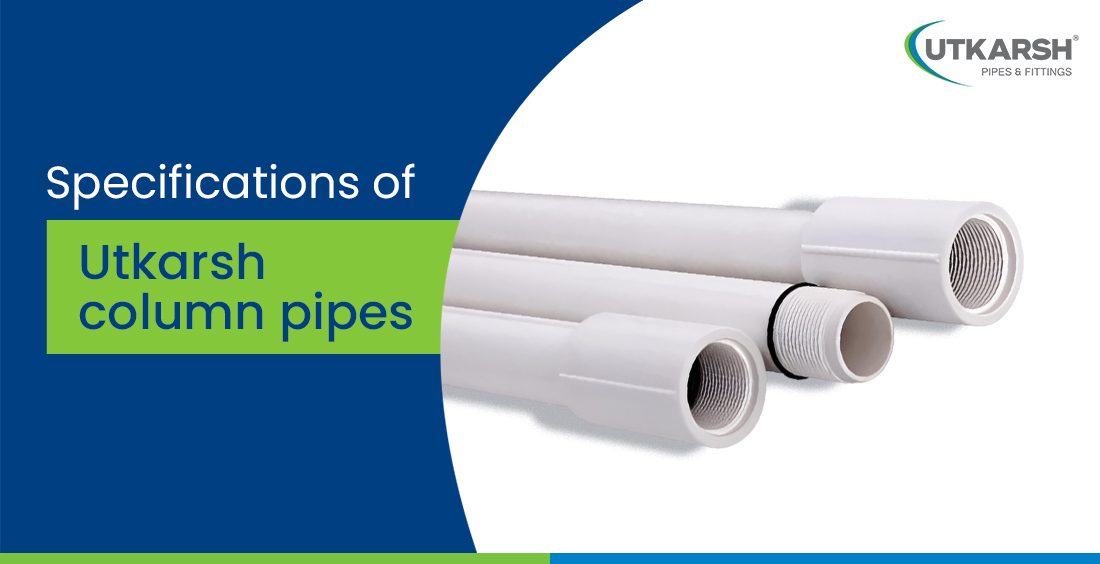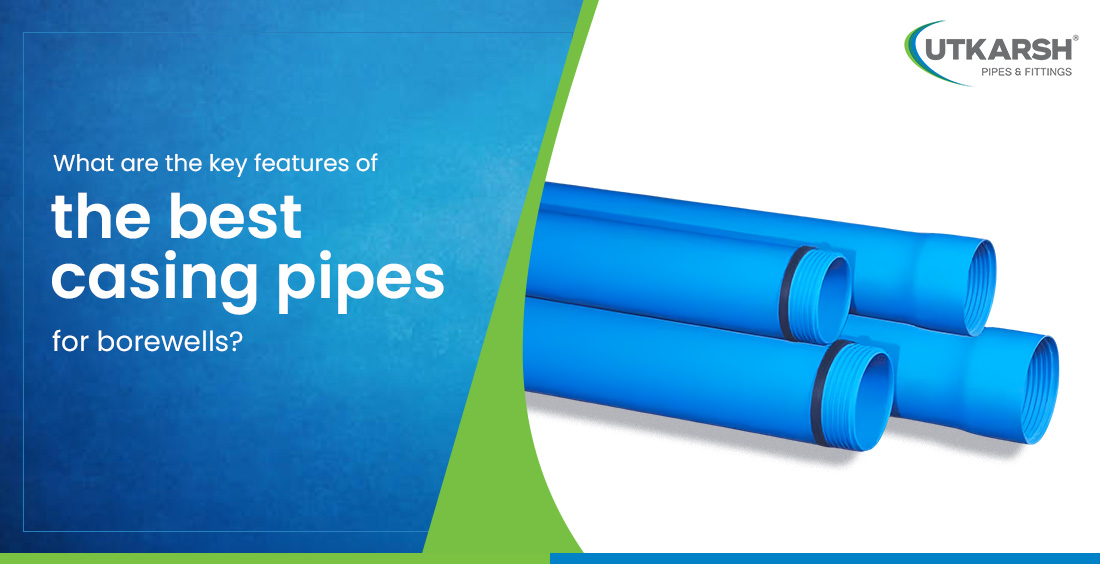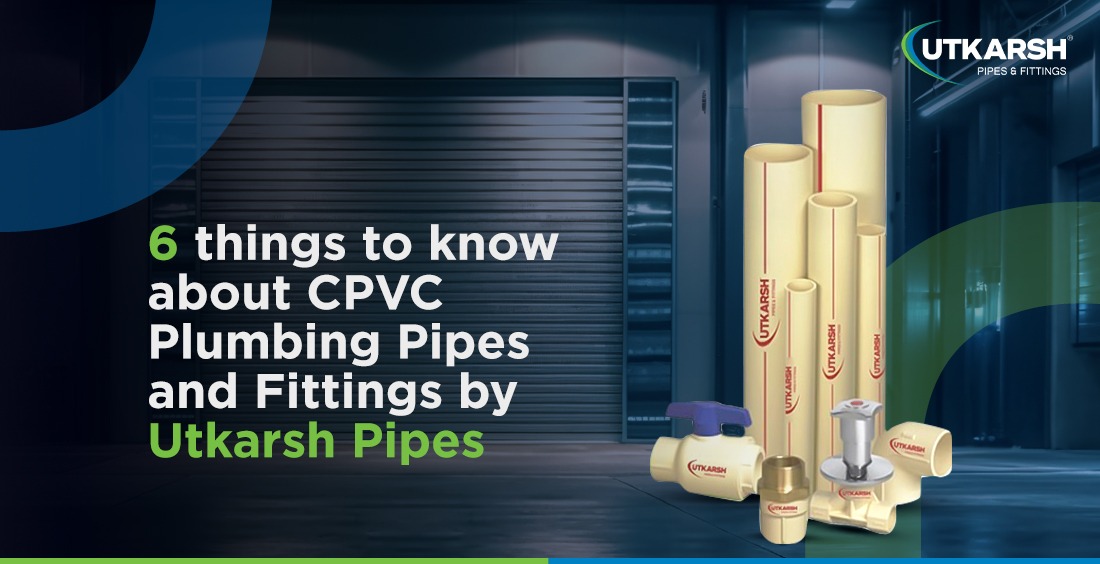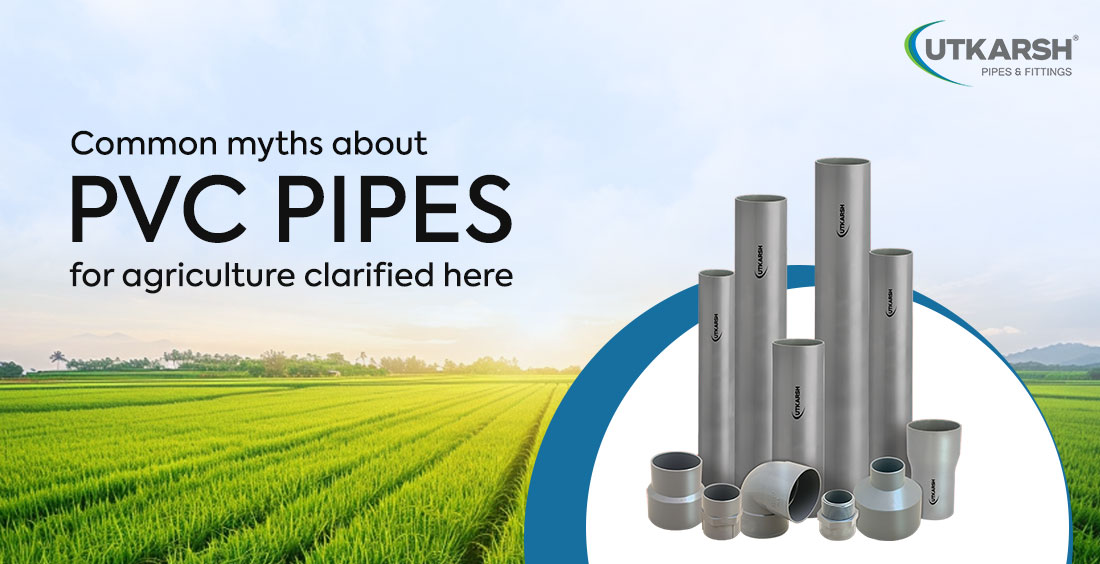

Related Blogs
Explore more with our related blogs on our products, manufacturing processes, solutions and more.
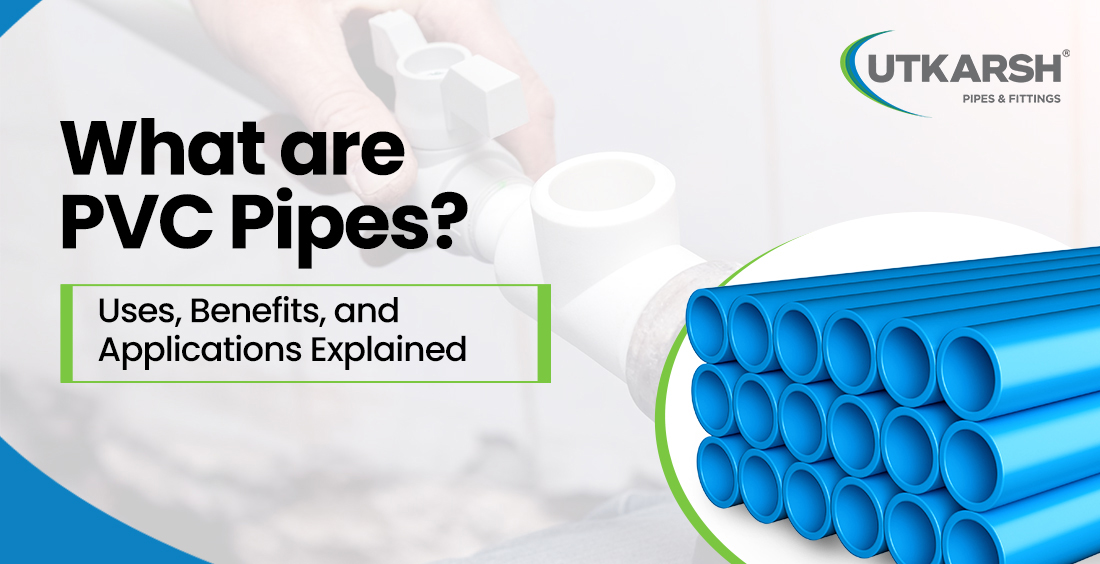
What are PVC Pipes? Uses, Benefits, and Applications Explained
Sep 19, 2025
In the plumbing sector, Polyvinyl Chloride (PVC) pipes are one of the widely used pipeline materials across domestic, agrarian, and industrial sectors. It's well-known for affordability, strength, and versatility, PVC pipes have truly converted ultramodern plumbing and structure development. Whether the water force is for irrigation or a large-scale artificial design, the advantages of PVC pipes make them a top choice for masterminds, contractors, and homeowners alike.
At Utkarsh Pipes, a trusted PVC pipe manufacturer, we deliver high-quality PVC pipes results designed to meet different design conditions with long-continuing performance.
What are PVC Pipes made of?
PVC pipes are made of polyvinyl chloride, a strong and lightweight thermoplastic material. This material undergoes extrusion processes to form pipes with different dimensions and pressures. The features like corrosion resistance and chemical resistance outperform traditional materials like metal and concrete in many applications.
Common Types of PVC Pipes and Their Uses
Different types of PVC pipes are designed to cater to specific applications. Some of the common categories include:
| Type of Pipe | Features | Uses | Technical Specifications |
|---|---|---|---|
| uPVC Pipes | Rigid and lightweight, corrosion & chemical resistant, cost-effective | Cold water plumbing, agricultural irrigation, sewerage & drainage | Pressure rating: 2.5 to 16 kg/cm²; Diameter: 20 mm to 400 mm; Standards: IS:4985 |
| CPVC Pipes | Withstands high temperatures, resistant to scaling & corrosion, smooth inner surface | Hot & cold water supply, industrial fluid handling, fire sprinkler systems | Temp. resistance: up to 93°C; Diameter: 15 mm to 150 mm; Standards: IS:15778 |
| PVC Casing Pipes | Specially designed for borewells, durable, resistant to soil & water conditions | Borewell casings, groundwater extraction, submersible pump installations | Diameter: 40 mm to 250 mm; As per IS:12818; Ribbed & plain casing options |
| SWR Pipes | Strong, leak-proof, UV-stabilized, resistant to household/industrial waste & rainwater | Soil, waste & rainwater drainage in residential, commercial & industrial use | Diameter: 75 mm to 160 mm; Standards: IS:13592; Available in Push-fit & Solvent cement joints |
| Column Riser Pipes | High tensile strength, leak-proof joints, designed for heavy vertical loads | Submersible pump risers in deep borewells | Diameter: 25 mm to 150 mm; Pressure rating: up to 25 kg/cm²; Standards: IS:14151 |
| Agriculture Pressure Pipes | Designed for high-pressure water flow, UV-stabilized, weather & corrosion resistant | Irrigation, drip & sprinkler systems, farm water supply | Diameter: 20 mm to 400 mm; Pressure rating: 2.5 to 16 kg/cm²; As per IS:4985 |
| Garden Pipes | Flexible, lightweight, easy to handle, resistant to kinking & abrasion | Household gardening, car washing, light irrigation, cleaning | Diameter: 0.5 inch to 1.5 inch; Available in 30m/50m/100m coils |
| HDPE Pipes | Flexible, impact-resistant, high chemical & corrosion resistance | Industrial fluid transport, irrigation, sewage, cable ducting | Diameter: 20 mm to 1000 mm; Pressure rating: PN 2.5 to PN 20; Standards: IS:4984 |
| PLB HDPE Ducts | Permanently lubricated inner surface, UV-resistant, high crush resistance | Optical fiber cable protection, telecom & data cable management | Diameter: 32 mm to 110 mm; Conforms to TEC & BSNL standards; Colors with stripes for ID |
Advantages of PVC Pipes
The advantages of PVC pipes extended beyond just cost savings. Their unique properties make them the most dependable and versatile piping solution available today.- Lightweight and Easy Installation: PVC pipes are much lighter compared to traditional materials like steel or iron. This lightweight material is easy to transport, handle, and install in remote areas. Moreover, this indirectly cuts the labour cost and no such heavy tools are required for installation.
- Durability: One of the biggest advantages of PVC pipe is its durability. PVC has a resistance power towards corrosion and scaling. This long-term service ensures uninterrupted services in any sector, like industry and residential.
- Chemical Resistance: Chemical Resistance cPVC pipes are specifically designed for handling tough surroundings with superior chemical resistance, since they're largely dependable for the environmentally aggressive chemicals, fertilisers, or artificial fluids. This ensures long-term continuity and a safe pipeline system in chemical processing and wastewater operation.
- Low Maintenance: The smooth inner filling face of the PVC minimizes the blockage or deposits, which reduces the need for frequent changes and repairs. Their robust design prevents cracks, leaks, or breakdown. Still, this makes a dependable choice for multiple sectors.
- Sustainability and Eco-Friendly: When it comes to recyclable accoutrements, PVC is the first choice. This product's lifetime is longer compared to other piping materials. Choosing PVC support offers an eco-conscious and long-term solution for water management and infrastructure projects.
Application of PVC Pipes
Choosing PVC support offers long-lasting performance, efficiency, and safety across different working sectors. Looking at the uPVC pipes, they're ideal for cold water, drainage, and general operations. cPVC is designed for high-temperature and chemical resistance purposes. Alternatively, PVC casing pipes are used only for borewell and groundwater systems.’
To gain a better understanding, a detailed comparison is presented with the types of PVC suitable for each sector and specific applications.
| Sector | uPVC Pipes | CPVC Pipes | PVC Casing Pipes | SWR Pipes | Column Riser Pipes | Agriculture Pressure Pipes | Garden Pipes | HDPE Pipes | PLB HDPE Ducts |
|---|---|---|---|---|---|---|---|---|---|
| Plumbing & Sewage | Cold water plumbing, sewage, and rainwater harvesting. Lightweight & durable. | Hot & cold water in bathrooms, kitchens, and sprinkler systems. | Rarely used in homes, only in a small borewell supply. | Drainage and sewerage systems in residential and commercial buildings | Limited in plumbing, occasionally used for residential borewell lifting. | Not typical for plumbing. | Commonly used for household gardening & cleaning purposes. | Used in some modern homes for underground plumbing and sewage. | Rarely applied in plumbing; used for telecom in smart homes. |
| Agriculture | Farm irrigation, water distribution, and drainage networks. | Limited role, occasionally in hot water agricultural setups. | Borewell and tubewell casing for safe groundwater. | Efficient disposal of wastewater, soil, and rainwater | Widely used in agriculture borewells for submersible pumps. | Ideal for irrigation, drip & sprinkler systems under high pressure. | Suitable for spraying, washing, and light irrigation. | Widely used in irrigation, drainage, and sprinkler systems. | Limited use in automation setups with fiber-based sensors in agriculture. |
| Industrial | Drainage, cable ducting, and fluid transport. | Transport of hot water, corrosive fluids, and chemicals in factories. | Used in deep well casings for industrial water supply. | Used in industries for non-pressure waste lines | Applied in industrial borewells requiring heavy-duty strength. | Sometimes used in water circulation systems in industries. | Light-duty industrial cleaning & water supply. | Transport of chemicals, slurries, and high-pressure fluids. | Extensively used in telecom & data cable housing for industrial connectivity. |
| Boring System | Limited use, except for small bore casings in residential areas. | Rarely used in boring applications. | Designed for borewell and tubewell casing to ensure safe groundwater extraction. | Core application: submersible pump risers for deep borewells. | Occasionally used in boring-related water distribution setups. | Minimal role in boring; sometimes for washing bore points. | Used for supporting borewell systems requiring pressure resistance. | Not used directly in boring, but supports telecom/data networks in bore areas. |
Why Choose Utkarsh PVC Pipe Manufacturer
Utkarsh Pipes has earned its reputation as one of the trusted and reliable PVC pipes manufacturers, delivering excellent quality, from designs to installation support. These are the standpoints features to associate with Utkarsh Pipes:
Complete Range of PVC Solutions
Utkarsh Pipes offers a one-stop solution for all kinds of piping solutions for every sector, such as residential, agriculture, industrial, or infrastructure requirements. Whether it's a hot water supply or a borewell application, our piping solutions are customised to maximise efficiency.
High-Quality and Manufacturing Standard
Utkarsh Pipes uses premium-quality raw material and a global standard, ensuring long-lasting performance and reliability.
Industry Expert and Networking
With 5 decades of experience and trusted by leading developers, contractors, and businesses across India. Over the years, we have built a strong industry network and partnership that allows us to stay ahead with remarkable projects.
Strength and Durability
Our pipes are designed to withstand any pressure, temperature, or exposure to chemicals. Utkarsh PVC pipes have ensured they produce a seamless product in urban areas for decades.
Commitment and Sustainability
We believe in a sustainable future by optimising recyclable, eco-friendly PVC pipes. We support Sustainable Development Goals, focusing on reducing the carbon footprint.
Wrapping Up
PVC pipes have transformed the plumbing system. The features of PVC make it a necessary result for domestic, marketable, and agrarian operations. From safe drinking to sewage networks, all the PVC pipeline networks are vast and vital. Still, the true value of PVC lies not in the accoutrements but in the quality of manufacturing and determination behind it. This is where Utkarsh Pipes stands out with its complete range of uPVC, CPVC, PVC containing pipe, the state-of-the-art installation, and strict quality control. Utkarsh Pipes ensures that every product meets the loftiest standard of safety, performance, and sustainability.
Contact Utkarsh Pipes today to find the right PVC solution for your project.
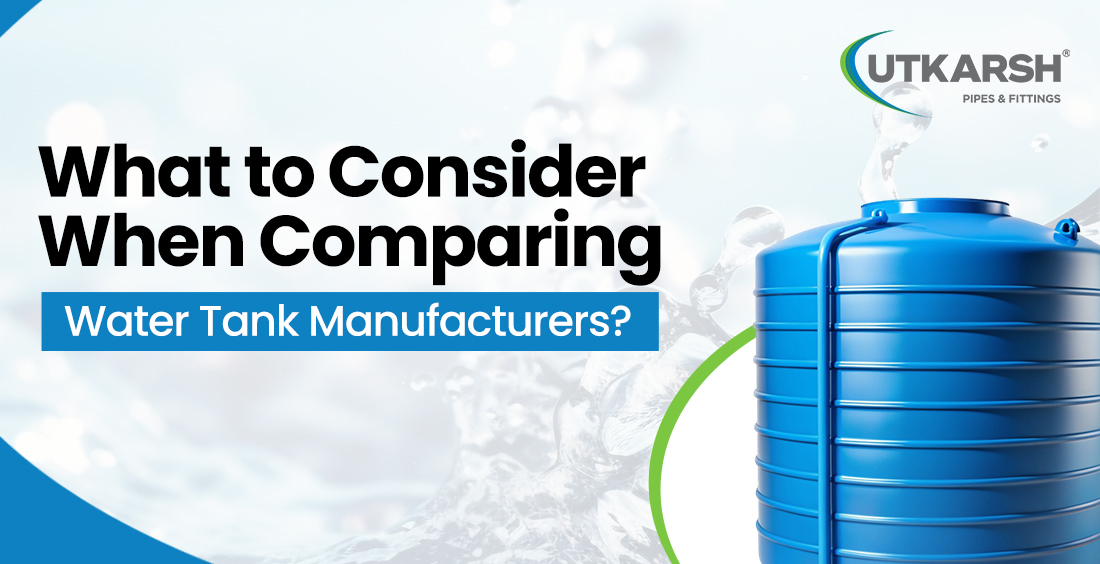
What to Consider When Comparing Water Tank Manufacturers?
Sep 17, 2025
Selecting the right tank for your requirement, such as household, commercial complexes, and industrial uses. Selecting the right water storage tank as well as manufacturer plays a significant role in ensuring safety, durability, and hygienic water for everyday use. A plastic water tank is a reliable and a safe choice for drinking purposes as well. As there are a number of manufacturers in the market, looking for a suitable company might be overwhelming. Knowing what to look for can ease the decision-making process and lead to a confident purchase. The most focused factor while choosing the best water tank company is product quality. A water tank should meet the local and global safety standards. When assessing different water storehouse tank manufacturers, check if they maintain the standard with quality norms for water tanks, such as food-grade plastic instruments, UV resistance, and continuity against harsh rainfall. Tanks made with poor-quality accoutrements can compromise water safety and lead to advanced conservation costs. The quality transparency is the foremost feature a company should be bound by. In the case of Utkarsh Pipes and Fittings, they follow the criteria Special Six- Shoulder Design for Superior Compressive Strength. This design enhances compressive strength, allowing the tank to repel heavy loads and pressure without damage. 10% Extra Storage Leading overhead water tank manufacturers in India now give tanks with 10% redundant storage capacity, offering better value for cost and added value for customers. Multi-Ribbed Design for long-lasting strength, the addition of a multi-ribbed structure improves durability, ensuring the tank lasts longer under varying conditions. 10 years warranty, along with a bond, is a sign of trust and product confidence. Utkarsh Pipes, as the best water tank manufacturers, offer extended guarantees, reflecting their confidence and assurance. A dependable water tank manufacturing company should offer a wide product range, covering household tanks, overhead storehouses, and industrial-grade tanks. The flexibility of sizes, colors, and designs helps guests find a tank suited tank for their specific needs. The most popular choice in the moment comes from plastic water tank manufacturers, as these tanks are featherlight, corrosion-resistant, and long-lasting. Look out for those manufacturers who use rotational molding or advanced blow molding methods for invariant consistency and strength. Similar technology ensures that tanks don't crack or blunder fluently, conserving water quality for times. Another critical consideration is continuity. The best water tank company will confidently offer a long-term bond, reflecting the trust they place in their own products. Compare the bond terms and ensure that after-sales service is available in your region. An authorised water tank manufacturing company won't only deliver quality but also give ongoing support. Client feedback is a strong index of trustworthiness. Research online feedback and reviews when shortlisting water storage tank manufacturers. Reputed companies constantly maintain product quality, ensure timely delivery, and give professional service. This becomes especially important if you're searching online for a water tank company, as genuine client satisfaction shall recommend original credibility. Utkarsh Pipes and Fittings has built a strong reputation backed by fifty years of experience and innovation. Utkarsh understands the evolving needs of households, businesses, and industries with over five decades of serving water management industry. As a leading water storage tank manufacturer, Utkarsh pipes and fittings ensure designs are manufactured with advanced molding technology. Utkarsh Pipes and Fittings sets a benchmark for the quality standards for water tanks, offering UV resistance, Food-grade quality, and a long-lasting, durable solution. Utkarsh Pipes and Fittings is recognized in the local and global markets for water storage tanks. Comparing water tank manufacturers goes beyond price; the priority is about safety, durability, and long-term performance. Additionally, warranty and brand reputation help you to make an informed decision. Credibility begins with a reliable, durable, and high-performance solution. Choose one backed by trust and performance, like Ukarsh Pipes and Fittings proves to be a leading name in the market among the top manufacturing companies in India. Make a smart choice, go for Utkarsh Pipes and Fittings.Quality Norms for Water Tanks
Diverse Range of Products
Raw Material and Technology
Durability and Warranty
Brand Reputation and Reviews
Why Utkarsh Pipes and Fittings Standouts?
Final Thoughts
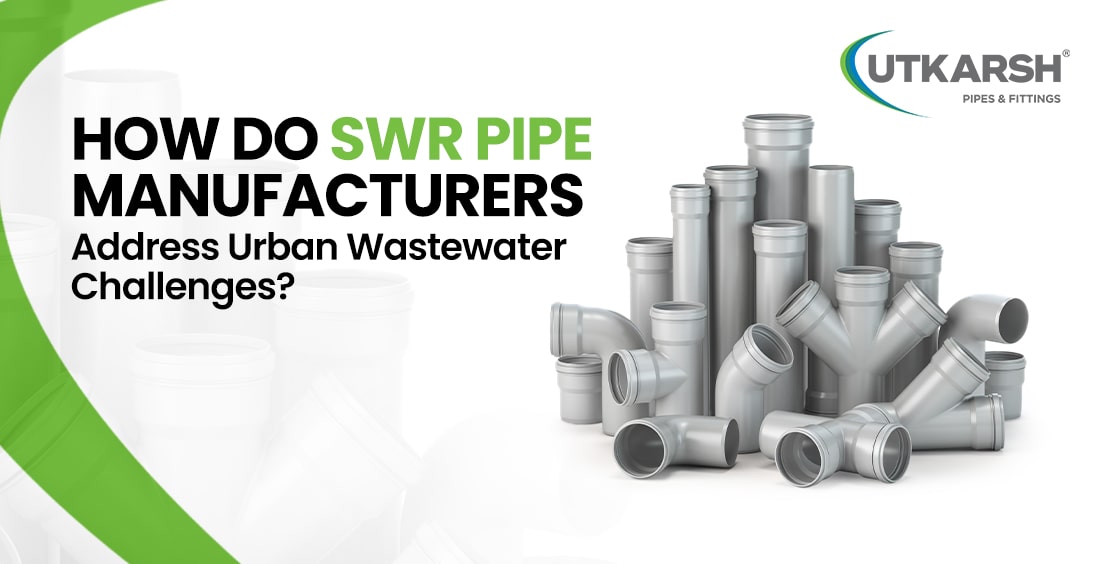
How Do SWR Pipe Manufacturers Address Urban Wastewater Challenges?
Aug 27, 2025
In an urban area, wastewater management is an accelerating issue. Citizens need to expand their waste solution in both a sustainable and efficient way. In this context SRW pipes manufacturer plays an essential role in addressing the urban wastewater challenges by crafting a robust and durable system, eco-friendly and can withstand all the hazardous chemicals and substances flown throughout. Urban wastewater consists of both sewage and stormwater waste solutions, which can lead to flooding, waterlogging, and public health hazards. The increasing construction and infrastructure growth often shows immense pressure on drainage networks; as a result, pipes face frequent breakdown, contamination, and blockage. This situation creates a requirement for the replacement or repair of SWR pipes causes a financial burden to the owners. Unlike traditional drainage solutions, modern SWR urban solutions are engineered to manage a large volume of wastewater seamlessly while ensuring minimum maintenance and maximum durability. A leading SWR pipes manufacturer uses high-quality PVC compound with features resistance to corrosion and chemicals. It ensures long-lasting performance in demanding situations where pipes are constantly exposed to waste flow. The smooth inner surface of SWR pipes prevents from clogging and deposition of substances. This makes SWR pipes for urban drainage minimize the blockage and reduce the risk of overflow during heavy rains. Flooding is a common issue during the monsoon season. To fight against SWR pipe manufacturers, design pipes featuring leakproof technology, flexible fittings that can efficiently channelize the storm water solution from both residential and commercial areas. It is considered an ideal solution because of its easy joining techniques, which makes it easy in the installation time as well as cost, considering essential factors for fast-developing urban regions. An eco-conscious productivity heavily reduces carbon emissions. It not only counts as an efficient wastewater management solution but also ensures urban development aligns with environmental sustainability. Durability: Resistance against weathering, rust, and decay Hygiene: Protective coverage from leakage and contamination Cost-efficiency: Long lifespan with less maintenance cost Scalability: Suitable for both small residential buildings and large commercial complexes Utkarsh Pipes and Fittings has more than fifty years of experience in the pipes and fittings niche. Our products are backed by advanced research and development, strict quality checks, and compliance with international and national standards certified by ISO, adhering to IS:1359 (Pipes) and IS:14735 (Fittings), ensuring full compliance for wastewater solutions. Utkarsh Pipes and Fittings delivers durability, hygienic, and cost-effective piping solutions across the country. It represents a benchmark of credibility and innovation in sustainable wastewater solutions. Urban wastewater management needs a smart, sustainable, and lasting solutions approach. Integrating advanced technology and eco-conscious design solutions for the SWR pipe manufacturer contributes significantly to solving maximum urban challenges. From ensuring stormwater waste solution to supporting reliable SWR for urban drainage. SRW Pipes remain the backbone of sustainable city infrastructure. At Utkarsh Pipes, we take pride in partnering with futuristic projects and providing a cutting-edge solution to mitigate the urbanisation demand. We are committed to quality and the trust our customer shows us.Understanding the Urban Wastewater Challenges
How Manufacturing Creates an Effective Solutions
Advanced Material Technology
Efficient Design for Urban Drainage
Adaptability to Stormwater Waste Solution
Easy Installation and Low Maintenance
Eco-Friendly and Sustainable Practices
Why SWR Pipes are the Backbone of Urban Waste Solutions?
Why Choose Utkarsh Pipes for SWR Waste Solutions?
Wrapping Up
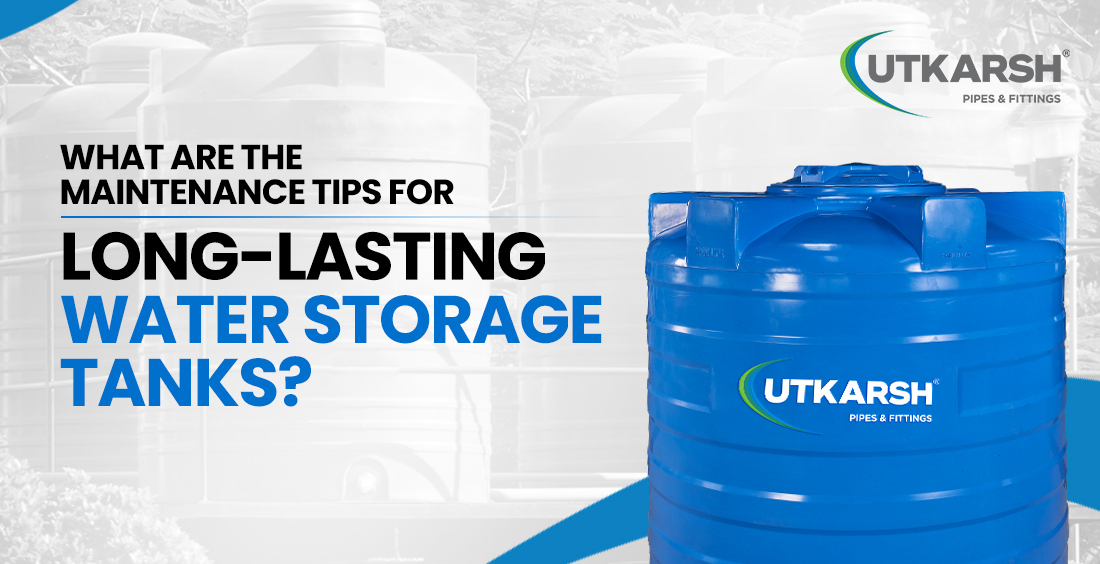
What Are the Maintenance Tips for Long-Lasting Water Storage Tanks?
Aug 27, 2025
Similar to how you maintain your physical health each day, your water storage system requires regular attention to ensure it stores clean, safe water. Water storage tanks are used in any household or commercial property and are critical to providing a constant water supply for drinking, daily routines, and tasks. However, it is not enough to assume that by simply installing a tank, you can forget it; regular maintenance is essential to drinking water quality and the longer service life of the tank. This blog will provide a summary of water tank maintenance insights. You can take these tips and apply them to any water tank, whether for household, office, commercial, or large industrial use. Without regular inspections, a tank can rapidly build up dirt, algae, bacteria, and other microbial organisms, all of which reduce the quality of your water and the lifespan of the water tank. So, taking a handful of maintenance tips from professionals will help you have a more effective water storage system for your daily use. Only buying a premium quality water tank or frequently replacing the tank is not a solution. Maintaining a water storage tank is about ensuring the safety and quality of the water you consume every day. Neglecting the maintenance can create several issues for the tank. However, this can lead to several issues, like health issues, such as diarrhea, cholera, or sometimes skin infections. Lack of proper cleaning water tank allows microbial organisms like algae or bacteria. You may also notice an unpleasant change, like foul smell or a strange taste, which is caused by excessive microbial growth. Beyond this hygiene concern, tanks get damaged by corrosion, leaks, or cracks. If you don’t take the small concern seriously, it might not take time to become an issue for you and your family. Above all, the maintenance practice of cleansing the water tank at regular intervals is the key to preventing any hazards. Here is the step-by-step process: Drain out the water completely, empty the tank ensure no water remains inside. Scrub the inner surface of the tank, using mild detergent or any recommended chemical to remove dirt, microbial compounds from the tank. Wash out the tank several times to ensure no soap or chemical residue remains inside. For additional safety, apply a safety disinfectant such as a chloride solution to kill harmful bacteria or microbes. Dry up the tank naturally before refilling with fresh water for use. Regular Inspection of the tank: Every three months, inspect the tank for cracks, leaks, or discoloration. Early prevention can prevent major damage and costly repairs. Cover the tank with a sealed lid to protect against insects, dust, and external pollutants. Ensure ventilation pipes are properly screened to function well to prevent leakage and water wastage. UV rays of the sun can expose algae and other microbial growth inside. Place the water storage in a shaded area or choose a UV-stabilized tank. Check the inlets, outlets, and valves to prevent leakage or wear. Timely replacement of the faulty parts keeps the tank from efficiently functioning. Choose a high-quality tank that is 100% food-grade virgin, UV stabilized, and multi-layer protected with hygiene, strength, and durability. Reduces the risk of waterborne disease Becomes cost-efficient in terms of repair and replacement Extend the lifespan of your tank Ensure safe and clear water for everyday use When it comes to ensuring safe, clean, and long-lasting storage, choosing the right water tank is the initial stage to make a difference. Not every tank is reliable; it is preferred and safer to invest in a quality product. This is where Utkarsh Pipes stands out as a trusted choice across both household and commercial properties. Utkarsh Pipes and Fittings are backed by more than 50 years of industrial experience. Each tank manufactures 100% food-grade virgin LLDPE to certify that the water consumed is trusted for drinking, cooking, and sanitation remains hygienic and safe. Utkarsh Pipes water storage tanks are UV stabilised to withstand the harsh Indian climate. Moreover, Utkarsh Pipes offers multiple sizes, starting from small household to large commercial uses. Their range of products makes Utkarsh Pipes a one-stop solution for all your needs. Your water storage tank is not just a container; it is the gatekeeper of your family to keep every drop of water clean and crystal clear. It acts as a silent guardian who takes care of your health and hygiene. Regular inspections, timely cleaning, and consistent maintenance are the essential steps to ensure a better experience with your water connectivity. Whether it’s your home, office, or industries, Utkarsh Pipes and Fittings ensure water is stored most hygienically and securely as possible Contact Utkarsh Pipes to explore the wide range of products with premium quality for your well-being.Why is Water Storage Tank Maintenance Important?
Process of Cleansing Tanks
Effective Maintenance Tips for Water Storage Tanks
Benefits of Tank Maintenance
Why Choose Utkarsh Water Storage Tank?
Wrapping Up
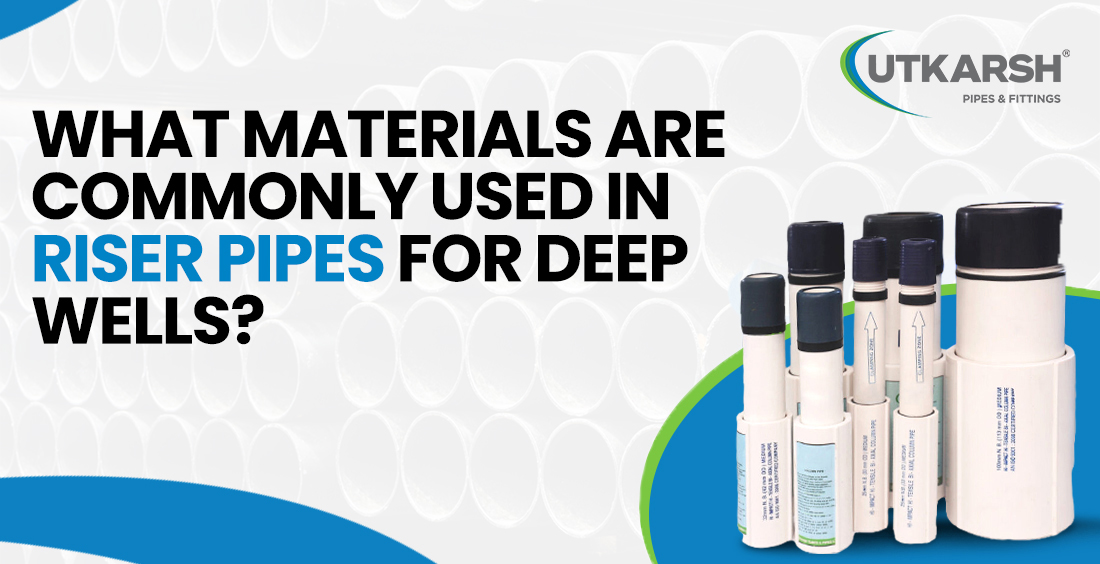
What Materials Are Commonly Used in Riser Pipes for Deep Wells?
Aug 26, 2025
Riser pipes play a crucial role in lifting water from underground aquifers to the surface. A deep well riser pipe material directly affects the durability and cost-effectiveness of the entire water supply system. Common materials include uPVC compound and heavy-duty sealing rings made of industrial-grade rubber, which guarantee long-lasting performance. They also absorb pump vibrations, extend the life of the system, and ensure a hassle-free water supply. A riser pipe acts as a vertical column, connecting the borewell pump to the water delivery point. In a deep well application, these pipes are subjected to high water pressure, varying load conditions, and chemical reactions with groundwater. Choosing the correct material ensures safety, reliability, and longevity of the system. The choice of deep well riser pipe material is a technically and economically wise investment idea. Since riser pipe is used to carry water under high pressure from hundreds of feet below. Unlike other pipes may corrode, collapse, or break under stress, leading to pump failure, water contamination, or downtime. Leak-proof performance with zero water loss Resistance to corrosion in aggressive groundwater conditions Reduces the maintenance cost Consistent and safe water supply for agriculture, industry, and domestic use Utkarsh Pipes manufactures riser column pipe exclusively from superior uPVC material, a choice backed by experience and performance in the field. This is because uPVC has proven to be the most efficient, durable, and cost-effective option for deep well applications. Resist corrosion in every aggressive condition Lightweight pipes are easy to transport and install Long service life with minimal maintenance Cost-effective product compared to any metallic pipe Provide smooth water flow due to the advanced joining system High load-bearing capacity, suitable for a submersible pump Sustainable lifespan with low maintenance Protect against leakage, scaling, and bacterial contamination Worthwhile investment for farmers, industries With over 5 decades of industrial experience, Utkarsh Pipes has played a significantly an ideal role in shaping water infrastructure. Our product lasts long and reflects a deep understanding of the challenge faced by consumers. Utkarsh Pipes and Fittings is widely recognised for its engineering excellence and innovative power. Its superior uPVC compound is designed to handle high torque and also suitable industrial-grade sealing rings that can also absorb the vibration of the pump, extend the pipe life, and ensure leak-proof use. As an ISO certified company, Utkarsh Pipes sets a global standard in the Indian market with its eye-catching product quality. Moreover, our product has been popularly used in every business sector, like agriculture, industry, and construction projects. Utkarsh Pipes built its reputation on the foundation of consistency, transparency, and reliability. Customers trust our brand not only for product performance, they believe in one- time investment with no further miscellaneous costs on repair or replacement. The choice of deep well materials determines the efficiency of extracting water from the well. Unlike traditional steel pipe, uPVC riser pipe deep well solution has offered more smarter alternatives in terms of cost-efficiency and hassle-free performance. Secure every drop with Utkarsh uPVC riser pipe, built for performance, trusted for life.Introduction to Riser Pipes
Importance of Choosing the Right Pipe Material
A High-Quality uPVC column pipe ensures:
Common Materials Used in Riser Pipe for Deep Wells
Features of Column Riser Pipes are:
Riser Pipe Benefits in Deep Well
Multiple benefits of riser pipe:
Why Utkarsh Pipes for Deep Well Riser Pipe Materials?
Conclusion
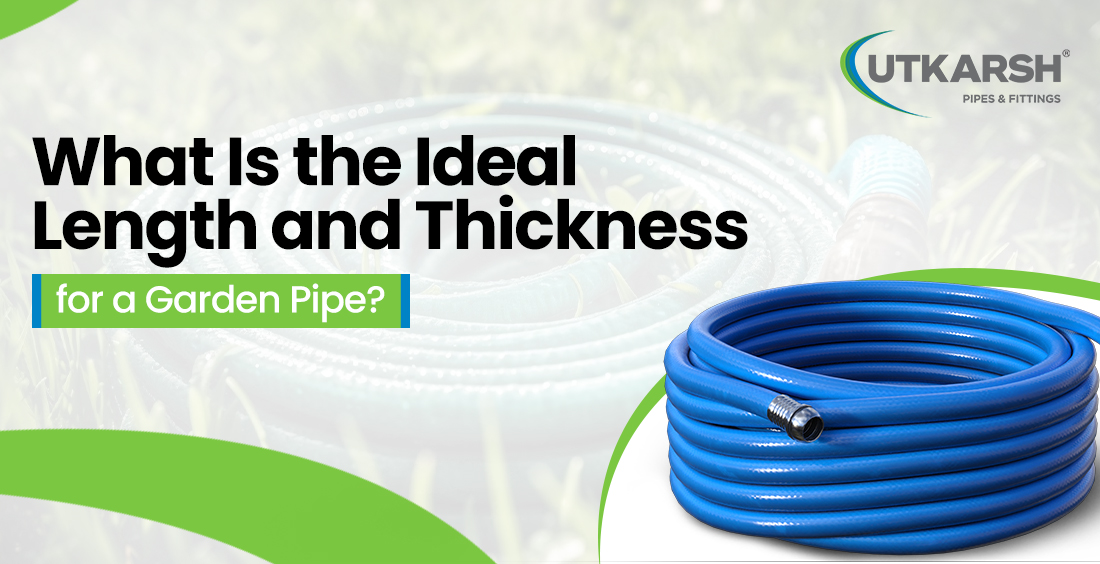
What Is the Ideal Length and Thickness for a Garden Pipe?
Aug 21, 2025
Homeowners and professional gardeners often face issues with gardening products like pipes that kink, burst under pressure, or don’t reach the required length. Choosing the right garden pipe size is essential that solve all these problems, making it effortless. Read on to learn how to select the ideal garden pipe length and thickness for your needs. The length usually ranges between 15mm to 25mm. Generally, a garden pipe’s size refers to the diameter and thickness that together determine water flow and durability. It is available in different variants, such as plastic and rubber. While smaller diameter pipes are ideal for home gardens, and larger sizes are suitable for heavy-duty uses from public gardens to industrial uses for cleaning. A garden pipe is also known as garden hose pipe. This is a versatile tool for watering plants, cleaning, or other outdoor tasks. Generally, it comes with a nozzle or sprayer to control the flow of water. Utkarsh Pipes and fittings are specially designed garden pipes keeping health and safety in mind, free from harmful chemicals, RoHS-compliant, phthalate-free, and non-carcinogenic, making them environmentally conscious and safe for home and business. Garden pipes are versatile tools that go beyond just watering plants. With the right garden pipe size and durable material, they can serve multiple purposes in the home, commercial, and industrial. These are some most commonly used: Watering plants in home garden and lawns Cleaning outdoor areas, patios, and vehicles Small-scale agricultural irrigation Supplying water for landscaping projects Paired with gardening tools and accessories Keep this checklist in mind: Measure the area that needs to be covered for watering Checking the diameter that provides a suitable water flow (Expert’s Advice: ½ inch for small gardens, ¾ inch for large spaces) Choose a thicker wall for longevity and durability Check for certified UV-resistant pipe Choosing the best garden pipe size is key and essential for durability, proper water flow, and hassle-free gardening. At Utkarsh Pipes and Fittings, we go beyond just supplying pipes, we deliver high-quality gardening products with a wide range and designs to meet both the household and professional needs. When it comes to choosing a trusted garden pipe manufacturer, Utkarsh Pipes and Fittings stand out with their innovation, safety, and reliability across India. To make your gardening experience smoother, easier, and efficient, choose Utkarsh Pipes today. The standard garden pipe size is ½ inch in diameter, regularly used for home gardens. If more water flow is required diameter of ¾ or 1 inch ensures better flow with high pressure required for other outdoor use. A small irrigation setup needs ¾ ¾-inch garden water pipe, which commonly delivers good water volume. Large agricultural irrigation systems require 1-inch or PVC pipes. Measure the total distance to be covered and the water pressure available in your tap. Small garden works well with ½ inch, and large lawns may need ¾ inch or 1 inch pipes No, it is designed only for cold and room temperature water. Special dedicated pipes are there for the temperature control pipe.What is the Ideal Length of a Garden Pipe?
What are the special features added to a garden pipe?
Key Benefits of Choosing the Right Garden Pipe Size
Common Application of Garden Water Pipe
How to Choose the Right Gardening Pipe Size
Conclusion
FAQs
Q1. What is the standard size of a garden pipe?
Q2. What size pipe is used for garden irrigation?
Q3. How to calculate the right pipe size?
Q4. Can a garden pipe handle hot water?
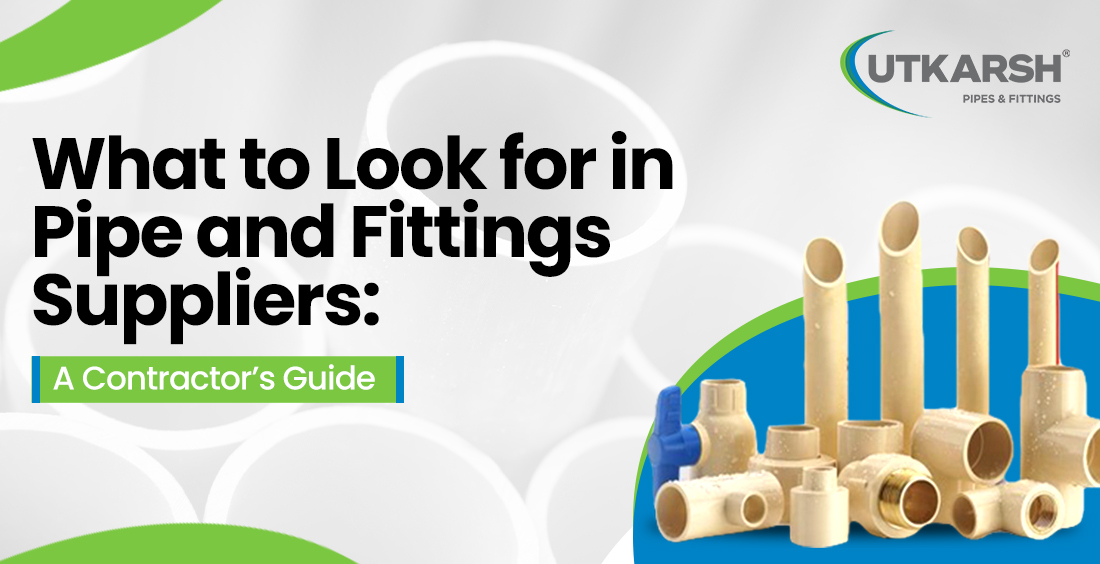
What to Look for in Pipe and Fittings Suppliers: A Contractor’s Guide
Aug 21, 2025
Every construction project is a race against time, quality, and budget. Only opting for a suitable supplier for the material is not enough; there are countless construction pipe suppliers in the market. Knowing how to choose the right partner for your project? Also, ensuring durability, timely delivery, and reliability of the material. This guide outsketch the significant factors a contractor should evaluate while choosing a supplier. Along with that, this guide shall evaluate why Utkarsh Pipes and Fittings is considered the best pipe supplier for contractors across India. A contractor might demand pipes and fittings that last for decades. Utkarsh Pipes ensures every product passes through a strict quality check, making it a trusted supplier in the construction field. For product reliability, the supplier should provide: ISI and ISO- certified products Leak-proof fittings Corrosion and pressure resistance A large-scale construction needs a supplier who can deliver a bulk of product without compromising delivery time, quality, and sustainability. Utkarsh Pipe has the capacity to deliver bulk production across India because: Having a robust production capacity Maintain adequate stock levels Ability to fulfill high-volume requirements This is one of the important factors to check upon, as an inaccurate time of delivery can disturb the whole workflow process, mainly leading to idle labour, miscellaneous costs, and missing deadlines. Therefore, before selecting a supplier, ensure the following key points: Wide distribution coverage Reliable logistic support Time-bound delivery commitments Make a one-stop destination for all kinds of requirements of pipes juggling to different vendors only leads to wastage of time and money. Utkarsh Pipe offers a complete range of pipes and fittings under one roof. Their piping product such as PVC, CPVC, UPVC, and HDPE pipes. Suppliers not only sell products, but they also guide contractors throughout the finishing process. Look for the supplier who has: Dedicated technical teams On-site support if required Transparent warranty and service team Utkarsh Pipes provides end-to-end solutions from product selection to after-sales support, to guide you in the best way possible. Fair Pricing and Value As per the expert’s advice, low-priced products are temporarily attractive, but in the long term, consumer needs to bear more cost on repair and replacement. Therefore, as a professional supplier should balance pricing with uncompromised quality. Certified Quality with a global standard Complete range of Pipes and fittings products Proven capacity for bulk orders Delivers product across India Provide technical expertise and strong customer support In the construction industry, piping and fittings are more than just a material; it's the backbone of any infrastructure. Henceforth, selecting the right pipe supplier is not just a role of procurement decision, it's a long-term investment and reputation of a contractor.Key Factors Contractor Must Check in Pipes and Fittings Suppliers
Product Reliability:
Bulk Supply Capacity:
On-Time Delivery:
Comprehensive Product Range:
Technical Guidance and After-Sales Support
Why Contractors Prefer Utkarsh Pipes and Fittings
Wrapping Up
A truly dependable supplier offers products that withstand every environmental challenge and pressure, ensuring durability, safety, and long-term performance for any construction project. So if you are looking for a reliable Pipes and fittings supplier, Utkarsh Pipes is your go-to choice. With Utkarsh Pipes by your side, every project stands strong and complete with confidence.
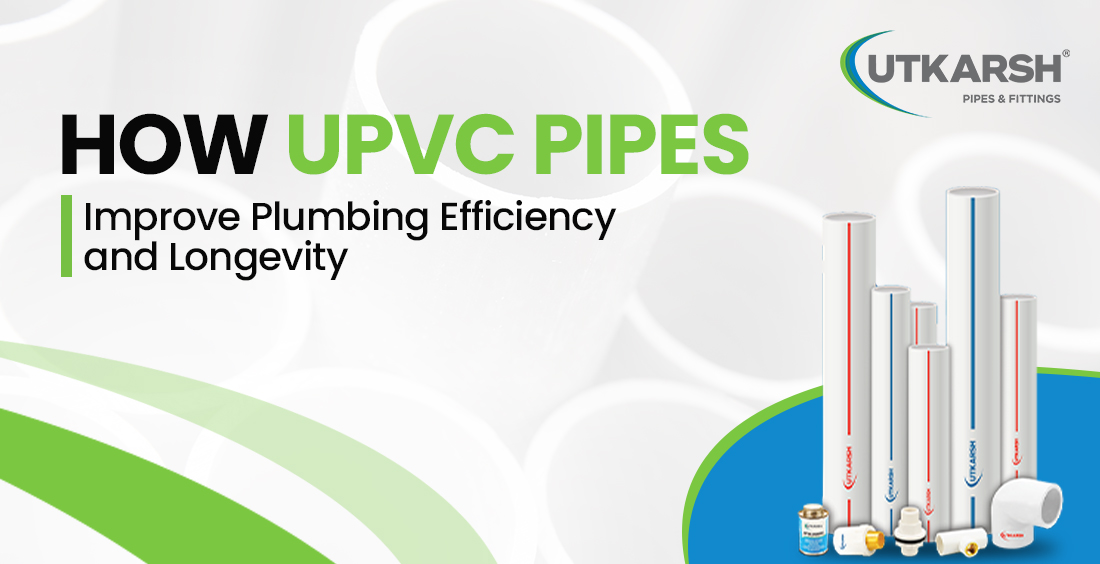
How uPVC Pipes Improve Plumbing Efficiency and Longevity
Jul 25, 2025
Among the most trusted and widely adopted solutions in modern plumbing systems is uPVC pipe. Designed to deliver long-term performance with minimal maintenance. These pipes are rapidly becoming the go-to choice both in residential and commercial projects. Whether you are a homeowner upgrading your plumbing infrastructure or a contractor seeking cost-effective and reliable materials, understanding how uPVC pipes improve plumbing efficiency and longevity can help you to make a smarter investment. Feature uPVC Pipes GI Pipes Copper Pipes Corrosion Resistance Excellent Prone to rusting Good Weight Lightweight Heavy Moderate Water Quality No taste or odor May affect taste and clarity Safe Installation Easy solvent-welded joints Requires threading and welding Soldering required Cost Efficiency Very cost-effective Expensive installation and maintenance High material and installation cost Maintenance Very low High (leaks, corrosion, scaling) Low Temperature Resistance Up to 60°C (ideal for cold water systems) Up to 100°C Excellent for hot water Longevity 40+ years 10–15 years 15+ years Eco-Friendliness 100% Recyclable Not recyclable Recyclable Ideal Use Residential plumbing, potable water and irrigation Industrial plumbing only Premium residential plumbing Long-Lasting Corrosion Resistance: uPVC pipes are built to withstand harsh environmental conditions. These pipes are non-reactive in nature ensure resistance against moisture, chemical exposure and aggressive water quality. Smooth Internal Surface for Optimal Flow: The inner surface of uPVC pipes is extremely smooth which reduces friction during water flow. As a result steady pressure with high efficiency in system. Thermal and Electric Insulation: The lower conductivity uPVC pipes help minimize heat loss in cold water systems. Additionally, a non-conductive material adds a layer of electric safety especially benefits to underground and high moisture installation. Lightweight and quick Installation: The lightweight design of uPVC plumbing pipes with simple and efficient installation and transportation. Installation can be completed faster with fewer tools and less manpower, which is especially valuable in large-scale or time-sensitive projects Low-Cost Maintanances and Long lasting Durability: Once installed the uPVC pipes require minimum maintenance. Their resistance to scaling, pitting and microbial growth greatly reduced the threads for clogging or leakage, resulting in long-term operational savings and worry free performance. At Utkarsh Pipes and Fittings we understand the importance of delivering reliable and sustainable piping system solution. As a leading uPVC pipe manufacturing company, we engineer ed with precision, made high grade raw material with rigorous taste and quality monitoring protocols. Working on diverse range like high-rises apartment, villas, or public infrastructure, Utkarsh Pipes craft a specialised pipes that meet the diverse demands of modern plumbing system. Our pipes are IS certified both domestic and international standards. Choosing uPVC plumbing from Utkarsh Pipes is a one-time solution while balancing durability as well as cost-effectiveness. From fast installation to minimal maintenance with excellent longevity, uPVC pipe installation can significantly improve the overall performance of plumbing systemsSmart Comparison Table: Why uPVC Outperforms Traditional Plumbing Materials
Key Benefits of uPVC Pipes in Plumbing Systems
Why Utkarsh uPVC Pipes are a Trusted Choice
Wrapping Up
Choose a trusted uPVC pipes manufacturer like Utkarsh Pipes and Fittings that perfectly blends innovation and reliability in every pipe.
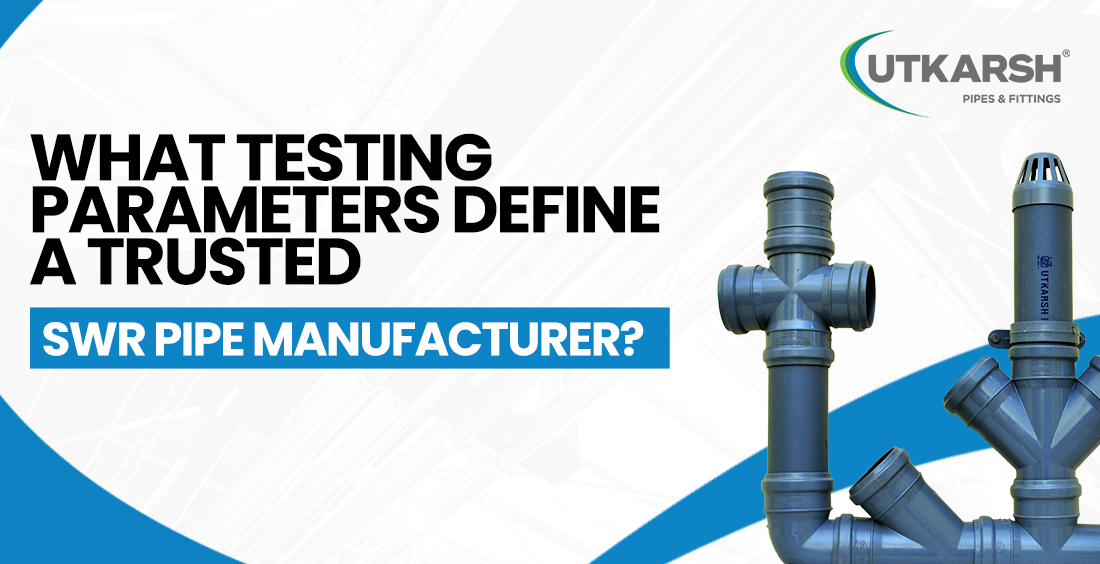
What Testing Parameters Define a Trusted SWR Pipe Manufacturer?
Jul 24, 2025
Building an efficient drainage and waste disposal system requires high-performance SWR (Soil, Waste, and Rainwater) pipes. The quality of these components can significantly impact the durability and reliability of plumbing infrastructure. A trusted SWR pipes manufacturer stands out through rigorous testing procedures, strict quality control measures, and adherence to standards. This article outlines the key testing parameters that differentiate a reliable manufacturer, guiding professionals and buyers to help with the leak-free installation. SWR pipes and fittings are engineered for non-pressure applications, especially in drainage systems in houses, commercial, and industrial structures. SWR fittings are basic components like bends, junctions, and couplers that help achieve a leak-proof and efficient plumbing setup. Utkarsh Pipes and Fittings is a renowned name in the piping industry, offering a range of pipes and fittings. The quality of SWR pipe fittings is not just about the product finish; basically, it is about how the product performs under extensive temperature changes and prolonged use. Utkarsh Pipes manufacturer follows this comprehensive testing protocol that ensures pipes are: Dimensional Accuracy: Accurate dimensions are essential for smooth installation and leak-proof joining. The correct size of SWR pipes and fittings ensures seamless connection with soil pipe fittings, eliminating the risk of misalignment or leakage. A trusted manufacturer follows standardized measurements as IS: 13592 (for SWR pipes), and 14735 (fittings), which check the parameter for: Outer and inner diameter The thickness of the wall uniformity Socket and spigot fitment Tolerance levels for manufacturing consistency Pressure Bearing Capacity: Even though SWR pipes means non-pressure applications, seldomly back pressure or a blockage situation can build internal stress. Utkarsh Pipes hydrostatic pressure ensure no cracks, deformities or failure occur under load ensuring long-term durability of pipes. Impact Strength: Pipes and SWR fittings often undergo rough handling during transportation and installation. Poor quality product may crack or break in a minor situation. Utkarsh Pipes ensure toughness and resilience, even in rough or load-bearing conditions. UV Stabilization: For outdoor applications or exposed plumbing, UV resistance is non-negotiable. A consistent sunlight exposure can make pipes brittle and prone to breakage. Utkarsh Pipes UV stabilizer components and test the pipes under accelerated weathering conditions to ensure they meet SWR pipes specifications Chemical resistance: Drainage waste and disposal waste systems often encourage corrosive and chemically active substances. Utkarsh Pipe and Fittings manufactures SWR pipe with a high-quality alkaline exposure test, which ensures performs well in industrial waste management. Leak-Proof Testing: Leakage is one of the major concerns in plumbing failure. A rigorous checking for leak-proof joints through air pressure or water tightness testing. This guarantees safety hygiene and maintenance free performance over time. Heat Resistance: Hot wastewater from kitchen or industrial units can lead to the softening, deformation, or cracking of low-quality SWR pipes. This not only affects the flow efficiency but also compromises the structural integrity. Utkarsh Pipes ensures that its SWR pipes and fittings are manufactured with heat-stable compounds and undergo thermal endurance testing and compliance with IS13592, which ensures high temperature discharge conditions. Utkarsh Pipes has an outstanding reputation for quality assurance, product innovation, and customer trust. The range of SWR fittings using state-of-the-art extrusion technology is extended across all vital parameters mentioned. IS certified SWR solution Easy installation with leakproof joining Resistance to weather and chemicals Long service life with minimal maintenance Choosing a trusted SWR pipe manufacturer goes beyond product pricing. It’s about quality, consistency, and compliance with industrial standards. Selecting Utkarsh Pipes, you are investing in durability, safety, and long-term performance in plumbing infrastructure.A Quick Look at SWR Pipes and Fittings
Why Do Testing Parameters Matter?
Why Choose Utkarsh Pipes for SWR Pipes and Fittings
Wrapping Up
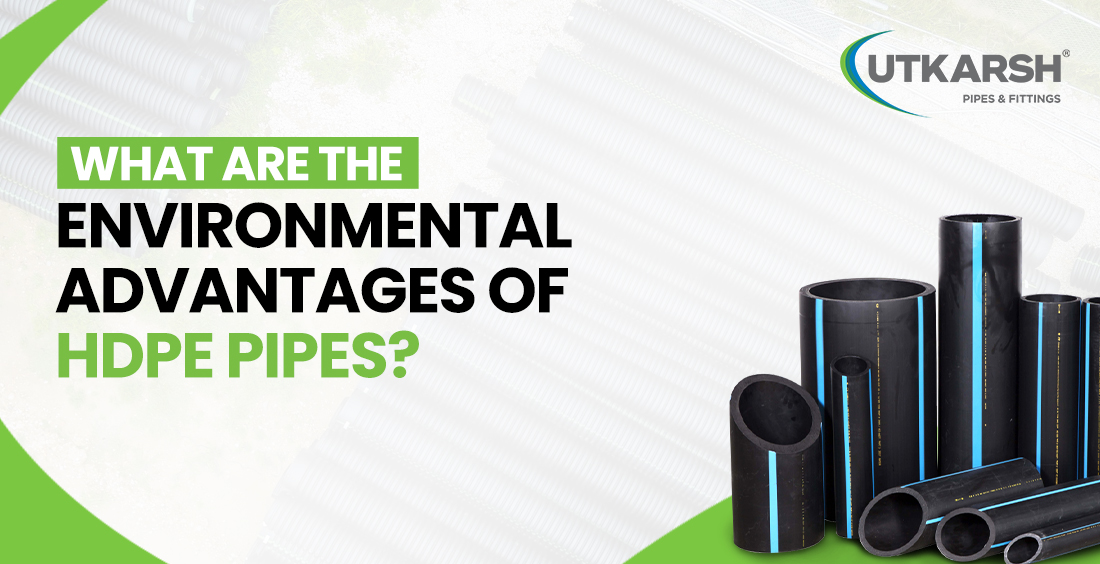
What Are the Environmental Advantages of HDPE Pipes?
Jul 24, 2025
Eco-friendly infrastructure is not just a trend; it is a necessity in today’s development landscape. Among modern piping solutions, HDPE (High-Density Polyethylene pipes) offers a powerful combination of durability, sustainability, and performance. Known for their durability, efficiency, and eco-friendly performance, these pipes are widely used in various areas to function. This is the go-to choice for water supply, sewage, irrigation, and industrial applications. This blog explores the environmental advantages of HDPE pipes, shedding light on how they support sustainable development goals, reduce ecological impact, and promote cleaner resource management. Whether you are a contractor, an engineer, or a decision maker in a project. This article will help you to understand why HDPE pipes are the smarter, greener alternative in today’s market. Leak Free Performance: One of the biggest benefits of using HDPE pipes is their ability to create a leak-proof system; the fusion welding between the pipe joints is completely sealed. Unlike other pipes, which depend on mechanical fittings that loosen or leak over time. Corrosion-free: Compared to traditional pipes, rusting and scaling, or reacting with chemicals in the water and soil. HDPE products avoid all of that. They don’t corrode or degrade, even in tough times or rough environmental conditions. Long-term Durability: HDPE pipes are engineered for a service life ranging from 50-100 years, depending on operating conditions such as temperature and chemical exposure. This exceptional longevity significantly reduces the need for frequent replacement, minimizing lifecycle cost and environmental impact. Low Carbon Footprint: HDPE pipes are highly energy efficient across their entire lifecycle, from manufacturing to on-site installation. Their lightweight nature makes them easier to transport and the production process uses less energy. Unlike conventional material, HDPE requires less energy to produce its lower melting points and streamlined fabrication process. Frequent repairs and replacements not only increase project cost but also cause unnecessary disruption to the environment, such as soil disturbance, traffic blockages, and resource wastage. HDPE pipes' durability and flexibility require minimal intervention over decades. For both public utilities and private infrastructure developers, less strain on the environment and more cost-effective project planning. Making them a practical and eco-conscious choice for both public and private projects. Backed by five decades of market presence, Utkarsh HDPE Pipes and Fittings is a preferred choice for contractors, EPC companies, government projects, and infrastructure developers. Our focus on innovation, eco-conscious manufacturing, and client-centric service sets us apart from the crowd. BIS-certified Products Environmentally friendly production process Customised HDPE pipe solution Trusted by suppliers and consumers HDPE pipes offer far more than just fluid transportation; they deliver a sustainable, long-term solution for modern infrastructure. Their environmental advantages include leak-proof performance, low energy consumption, corrosion resistance, and recyclability, making them a superior alternative to conventional piping materials. Partnering with Utkarsh Pipes and Fittings to build greener, smarter, and more resilient systems for the future. Built For Sustainability: How HDPE Pipes Make a Difference
Reduced Maintenance is Equal to Lower Environmental Impact
Why Industry Leaders Trust Utkarsh Pipes
Utkarsh Pipe’s Key Features:
In Conclusion
FAQ:
Are HDPE pipes recyclable after use?
Yes, HDPE pipes are 100% recyclable. Once they fully utilise the lifeline, they can be reprocessed. This helps reduce plastic waste and supports circular economy practice, making it an environmentally responsible choice.How do HDPE pipes reduce water wastage?
HDPE pipes' key advantage is the use of fusion welding to form leak-proof joints. This seamless jointing technology eliminates the common leakage issues found in the conventional piping system. Unlike a traditional piping system.What makes HDPE pipes better than PVC or GI pipes?
HDPE pipes outperform PVC and GI pipes in terms of recyclability, joint integrity, and lifecycle energy consumption. Unlike GI don’t rust, and PVC don’t release harmful chemicals during disposal.
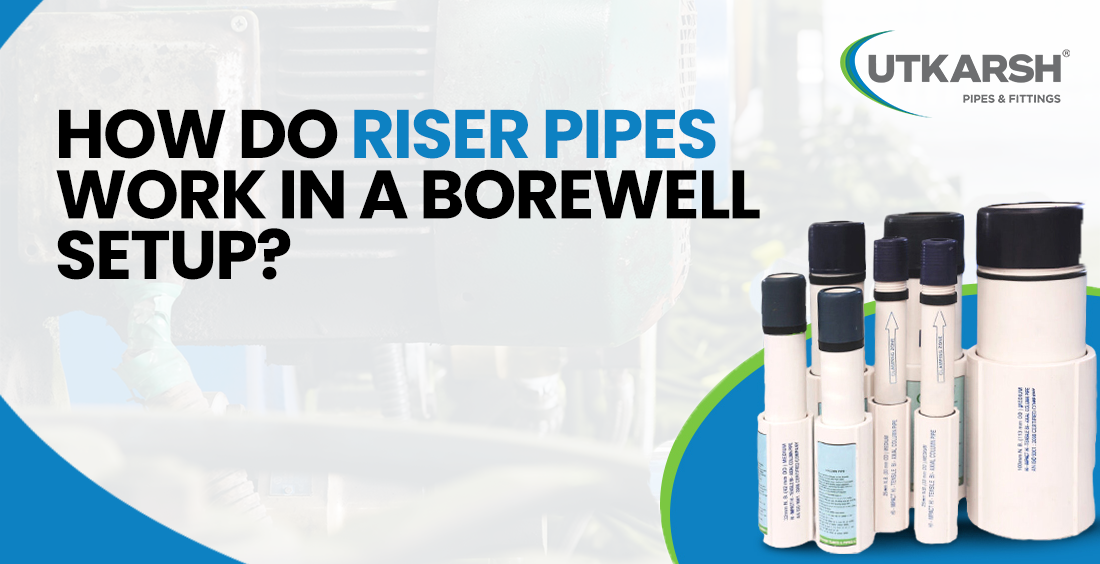
How Do Riser Pipes Work in a Borewell Setup?
Jul 17, 2025
Borewells have become a dependable solution for accessing clear groundwater, especially in areas where the regular water supply falls short. But the efficiency of a borewell doesn’t just depend on how deep it goes- it largely hinges on the components used during borewell pipe installation, particularly the riser pipe. In this blog, we will dive deep into understanding how riser pipes work in a borewell setup, why they are crucial, and how choosing the best borewell pipes can make a lasting impact on your water system performance. A riser pipe, also known as a column pipe, is a vertical pipe that connects the submersible pump (which is placed deep in the borewell) to the surface delivery point. It plays a vital role in lifting water from the underground aquifer to the ground level. In simple words, the riser pipe is considered as the backbone of the borewell setup—it carries water all the way from deep underground to where it is needed. Understanding the borewell riser pipe function is essential to ensure a smooth water supply system. This is how a borewell functions: Water Transportation: Once the submersible pump starts working, it pushes water into the riser pipe. The pipe turn delivers that water to the top. The quality and material of the pipe ensure minimal friction, pressure loss, and leakage. Withstand High Pressure: Riser pipe must withstand high water pressure, especially in deep borewells. They are built to resist pressure and give structural support to the pump and the weight of the water column. Vibration Absorption: Submersible pumps run for long hours; that consistent operation creates a lot of vibration. A well-designed riser pipe helps to absorb these vibrations, which not only protects the pump but also helps the entire system to last longer. Corrosion Resistance: Since ground water often contains minerals and chemicals, it can wear down regular pipes over the period. Therefore, using a high-quality corrosion-resistant riser pipe is important; they are built to last and also reduce the maintenance cost. A successful borewell pipe installation requires a careful selection of materials and precision engineering. Here is what you need to consider: Pipe Materials: PVC and uPVC pipes are commonly preferred for their non-corrosive nature and long life. Pipe Dimension and Thickness: These should match the pump’s capacity and borewell depth Joint Fittings: Leak-proof and pressure-resistant joints ensure a stable water column. Installation Depth: The riser pipe must reach just above the pump and be aligned correctly for efficient water flow. Using the best borewell pipes is not just a matter of quality; it's about reliability, safety, and cost-effectiveness in the long run. At Utkarsh Pipes and Fittings, we provide advanced uPVC column pipes specially designed for borewell applications. Here’s why Utkarsh Pipes should be considered as the first choice: Corrosion-Free Pipes High-pressure handling capacity Leak-proof joints High load-bearing capacity IS-certified product Riser pipes might not grab much attention, but they are absolutely vital in any borewell setup. They take on the heavy task of lifting water from deep underground and supporting the entire pump system. Therefore, it is important to choose the best borewell pipes and get the borewell pipe installation done by a professional. Trust Utkarsh Pipes and Fittings—India’s leading name in water management solutions. Designed for high performance and durability.What are Riser Pipes in a Borewell?
Borewell Rise Pipe Function: Why They Are Important?
Key Factors to Consider During Borewell Pipe Installation
Why Choose the Best Borewell Pipes?
Wrapping Up:
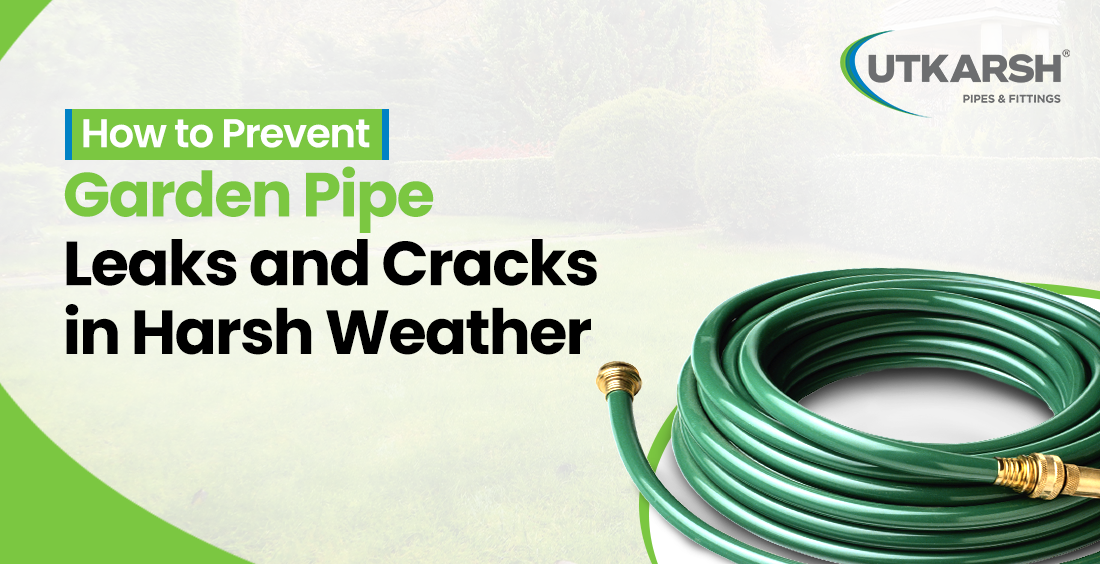
How to Prevent Garden Pipe Leaks and Cracks in Harsh Weather
Jul 17, 2025
A leak-proof garden pipe is a must-have when it comes to maintaining a beautiful garden, especially in the extreme heat, cold, or heavy rains. With the right maintenance tips and by choosing the right quality pipes from a trusted pipe manufacturer can easily prevent damage and extend the lifespan of your garden pipe. Harsh climate can wreak havoc on the material integrity of garden pipe. These are the few common reasons: UV Radiation: Prolonged exposure to the sun weakens the pipe’s outer layer Freezing Temperature: Water inside the pipe expands when frozen, leading to a crack. Excessive Heat: Heat softens the pipe material, making it more loose-fitting and leading to cracks. Improper Storage: Leaving the pipe tangled, kinked, or exposed can cause deformation. Regular care and smart usage can help you avoid leaks and extend your pipes usability. These are some important garden pipe maintenance tips: Choose Weather-Resistant Pipes: Invest in the best garden pipes for harsh weather, pipes that are UV resistant, flexible, and reinforced. High-quality PVC hose pipes from Utkarsh Pipes and Fittings are built to withstand all weather conditions, offering durability and high performance. Store Pipes Properly: Always drain the pipe completely and roll it loosely after use. Store in a shaded place or, preferably, indoors in a pipe hanger to prevent damage. Avoid Sunlight Exposure: Expose your pipe in a shaded area because constant UV exposure degrades material faster, especially PVC base pipe. Use Pipe Stands and Clips: Instead of laying the pipe directly on the ground, especially in areas prone to sharp rocks or high traffic, use pipe clips or stands. This prevents abrasion and punctures Install Nozzles and Shut-off Valves: Adding a good-quality nozzle or a shut-off valve at the end of the pipe helps control water flow and prevent pressure buildup, which causes leaks over time. Warning Signs of a Damaged Garden Pipe Over time, every best pipe needs replacement after long use. Identifying early signs of damage can help avoid water wastage and system inefficiencies. These are some of the most common indications that a garden pipe needs to be replaced. Persistent leaks despite patching Soft or brittle spots along the length Discoloration or UV damage Reduced water pressure due to internal wear At the time of replacement, it’s worth choosing a pipe that won’t let you down. Utkarsh Pipes and Fittings are built to handle tough weather, stay flexible, and deliver lasting strength, making them reliable for any garden setup. Utkarsh Pipe and Fittings is one of the leading garden pipe manufacturers in India, offering a premium quality solution. Our pipes are: Made with quality raw materials Weather- resistance with anti-crack formula Flexible, kink-free, and easy to handle Available in multiple sizes and thicknesses Whether you are a home gardener or a professional botanist, Utkarsh Pipes and fittings offers the best garden pipes for harsh weather, designed to perform under pressure and save your investment. Extreme weather should not disrupt your gardening joy or irrigation plans. With the help of these simple gardening pipe maintenance tips and investing in premium quality from a reliable pipe manufacturer like Utkarsh Pipe and Fittings, you can simply keep your pipe crack-free and fully functional for years. Need help choosing the right pipe for your needs?Why Garden Pipes Crack in Harsh Weather?
Essential Garden Pipe Maintenance Tips
Why Choose Utkarsh Pipes For Gardening?
Wrapping Up
Contact Utkarsh Pipes today and explore our range of pipes, which are weather-resistant and eco-friendly.
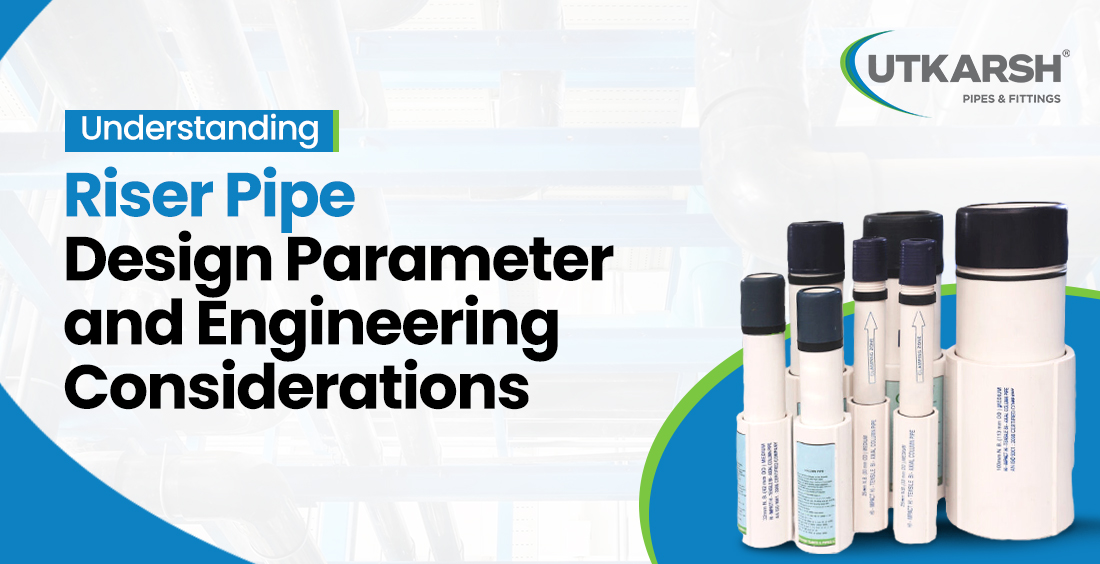
Understanding Riser Pipe Design Parameters and Engineering Considerations
Jun 26, 2025
For every water transportation system or underwater pump, riser pipes are the make-or-break factor. Such pipes are specifically made to carry water from deep underground sources to the top and provide a smooth connection while maintaining strength, dependability, and durability. Among industry giants, Utkarsh Pipes & Fittings is one such reliable manufacturer providing high-tech riser pipe solutions. From their advanced materials to state-of-the-art engineering, their riser pipes are designed to serve high-end industry expectations. This blog discusses the design specifications and engineering factors that go into riser pipes, highlighting the characteristics, spec requirements, and far-reaching applications of Utkarsh's products. We'll also emphasize how appropriate riser pipe installation and riser protection contribute to long-term performance. Riser pipes or column pipes are pipes that run vertically and are employed to connect submersible pumps to the ground surface. They are a vital component of borewell systems, which provide smooth water supply while taking care of the weight of the pump and the high pressure. Riser pipes also safeguard infrastructural items such as roads with huge fills to ensure that such spaces remain stable and intact. Being able to support water pressure and pump weight. Protection against environmental conditions such as corrosion and scaling. Conservation of a steady, leakage-free flow of water. Sustaining operations in deep depths or difficult environments. The performance of a riser pipe is highly dependent on its design, material, and correct installation. Utkarsh's riser pipes stand out in all these regards, making them best suited for a wide range of applications. Utkarsh pipes & fittings has become a top riser pipe supplier by integrating high-quality material, modern manufacturing techniques, and strict quality control. This is a summary of the key features of their riser pipes: 1. Best Material Composition High tensile strength for supporting heavy loads. Resistivity to corrosion, so the pipes can be used in alkaline as well as acidic conditions. Durability against wear and tear over extended use. 2. Innovative Thread Design The pipes feature square threads with male and female connectors, designed to: Provide a secure and smooth fit. Ensure leak-proof joints with industrial-grade rubber sealing rings. Minimize damage from pump vibrations, extending pipe life. 3. Technical Durability Utkarsh riser pipes undergo rigorous design and testing: They can safely withstand pump weight, water pressure, and additional shocks. Depth capabilities for various pipe types enable installation in jobs from 300 feet to more than 1200 feet. 4. Smooth Interior Surface Smooth internal finish of the pipes minimizes the chance of scale deposition, providing good water flow while reducing the frequency of maintenance. 5. Lightweight Construction Utkarsh riser pipes are light, making it easy to transport and install quickly without affecting durability or strength. 6. Built-in Riser Protection Utkarsh combines qualities such as galvanic and electrolytic erosion resistance, which improves the performance of the pipe under adverse conditions. The sealing rings, which are made of industrial quality, also contribute to the suitability of such pipes for prolonged use. Installation of riser pipes is important to ensure the effectiveness and durability of borewell and pump systems. Following are some important considerations for engineers to keep in mind: Depth and Pressure Utkarsh riser pipes come in designs according to depth needs: V4 Pipes: 300 feet or less. Medium Pipes: 400 feet or less. Standard Pipes: 850 feet or less. Heavy Pipes: More than 1200 feet. All are designed to manage respective water pressure and pump weight efficiently. Premium rubber sealing rings provide: Leak-proof performance, especially under high pressure conditions. Absorption of vibration caused by pumps, minimizing pipe wall stress. Compatibility with the environment Utkarsh riser pipes can be used in both acidic and alkaline conditions, which makes them useful for a wide range of tasks, including irrigation, industrial installations, and home water supply. Ease of Transportation and Installation Lightweight building of the pipes makes logistical issues easier to handle, and their compact handling mechanism ensures quicker setup. With correct riser pipe installation procedures, systems can be made to deliver maximum performance with minimum downtime. The flexibility of Utkarsh riser pipes renders them suitable for various industries:Why Riser Pipes Are Important in Engineering Systems
Primary Duties of Riser Pipes:
Characteristics of Column Riser Pipes
Utkarsh pipes are constructed from high-grade and high-strength imported additives. This material provides:Engineering Considerations for Riser Pipe Installation
Applications of Riser Pipes
Riser pipes allow water to be transported efficiently for irrigation, enabling sustainable agriculture.
- Chemical Industry
Riser pipes transport corrosive chemicals and chlorides in a safe manner while retaining integrity despite harsh conditions.
- Municipal Systems
Riser pipes provide uninterrupted flow of water systems, particularly in the supply of potable water or the management of sewage.
- Construction and Infrastructure
They play a crucial role in construction works, offering riser protection for buildings with tall fills.
- Submersible Pump Systems
Engineered for high-pressure applications, these pipes are a reliable option in residential, commercial, and industrial borewell setups.
Selecting the Right Riser Pipe
Selecting the appropriate pipe is based on considerations such as:
Installation depth.
Water pressure and discharge rate.
Environmental factors (acidic or alkaline).
Application-specific requirements.
When you buy a high-end riser pipe from Utkarsh pipes & fittings, you can be sure that it will work well, last a long time, and be cheap. Because they last a long time, don't leak, and are easy to install, their pipes are a smart choice for any project.
In conclusion
The majority of water management networks are built around riser pipes, and Utkarsh Pipes & Fittings is a model of excellence in this area. With high strength materials, sealed leak proof joints, and state of the art corrosion and scaling protection, their riser pipes are made to satisfy even the most exacting specifications. Utkarsh pipes & fittings offer dependable performance for many years in submersible city applications or large-scale irrigation projects.
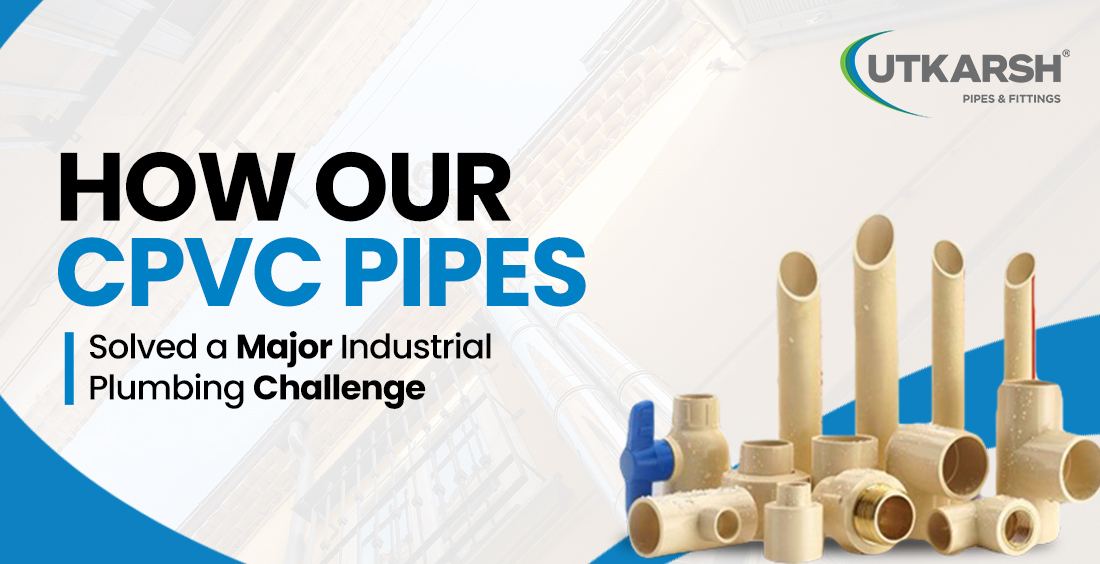
How Our CPVC Pipes Solved a Major Industrial Plumbing Challenge
Jun 24, 2025
To ensure maximum operational efficiency, safety, and long-term durability, an industrial plumbing system is selected. CPVC (Chlorinated Polyvinyl Chloride) pipes and fittings have emerged as a one-stop solution for different industries. Due to empowering features like robust structure, chemical resistance, and versatile adaptability. This piece of content would help you to understand the key advantages of using CPVC in industrial sectors and way out to mitigate the challenges with CPVC plumbing fittings. In this demand and supply eco-system, efficiency and durability are two non-negotiable features. With 5 decades of experience, Utkarsh-Pipes and Fittings stepped in with robust and lasting solutions, leveraging high-performance CPVC plumbing fittings. Utkarsh is actively transforming into a resilient and low-maintenance network-setting a new standard for industrial plumbing solutions. The plumbing network was traditionally built with metal piping, which deteriorated over the time due to constant exposure to high temperatures, UV rays, and chemical-laden fluids. Over the time it causes leakage, which puts the company at high maintenance costs. This complexity of the system demanded a sustainable solution that would be both heat-resistant and chemically stable, without compromising the existing layout. A wide range of industries rely on CPVC plumbing fittings for their strength, chemical resistance, and ability to perform under high temperatures. These fittings are the key component in delivering efficient and durable industrial plumbing solutions, especially where reliability and safety are non-negotiable. Industries that frequently use CPVC pipes and fittings include: Chemical Processing Units Food and Beverage Industry Pharmaceutical Manufacturing Textile and Dyeing Plants Pulp and Paper Industry Water Treatment Industry Commercial and Residential Complexes Hospital and Healthcare Facilities Hotels and Hospitality Sector The industrial demand for plumbing infrastructure needs a wider range of features to mitigate the unique challenges of industrial applications. These are the following reasons why CPVC stands out in industrial plumbing solutions: High Thermal Resistance: CPVC can handle hot fluid up to 93 degrees celsius, making it ideal for steam lines, hot water supply, and high-temperature industrial applications. Superior Chemical Resistance: The non-reactive nature makes CPVC plumbing fittings suitable for transporting acids, alkalis and corrosive fluid without degradation. Smooth Inner Surface: Minimizes friction and prevents scaling or clogging, ensures good flow, and reduces the maintenance time and cost. Durable and Flame Retardant: CPVC is self-extinguishing and maintains structural integrity under extreme conditions, enhancing workplace safety. Easy Installation: Lightweight design and solvent weld joining allow faster and leak-proof installation, reducing labour time and cost. Industrialists who are looking to upgrade their industrial plumbing solutions, Utkarsh Pipes and Fittings offers a perfect solution with the combination of performance, longevity, and value, making it an ideal choice for industrial plumbing solutions. Utkarsh CPVC manufacturer uses advanced technology and adheres to both national and international standards, including ASTM D 2846 & ISI 15778 certified pipes and fittings. These are some standout features that makes CPVC range the first choice for industries: High Heat Tolerance Corrosion Resistance Fire Retardant Smooth Internal Surface Wide Range of Fittings By combining all these amazing features with our proactive services and installation all over India. Utkarsh Pipes and Fittings continues to set a benchmark in industrial plumbing solutions. Industrial projects demand much more than just products - they require reliability, performance, and a partner who understands long-term value. This field Utkarsh Pipes and Fittings, stands as a testman for all kinds of piping and fittings delivered in all fronts.Major Challenge of Industrial Plumbing Solved by CPVC Plumbing
Which Type of Industry Approach CPVC Pumping Fittings
These sectors benefit significantly from the advanced engineering of CPVC plumbing fittings, making them a reliable choice for modern industrial plumbing solutions that demand long-term sustainability with minimum maintenance.Withstanding Industrial Demands: How CPVC Is Engineered for Performance
Why Utkarsh CPVC Pipes are Ideal for Industrial Applications:
Final Thoughts
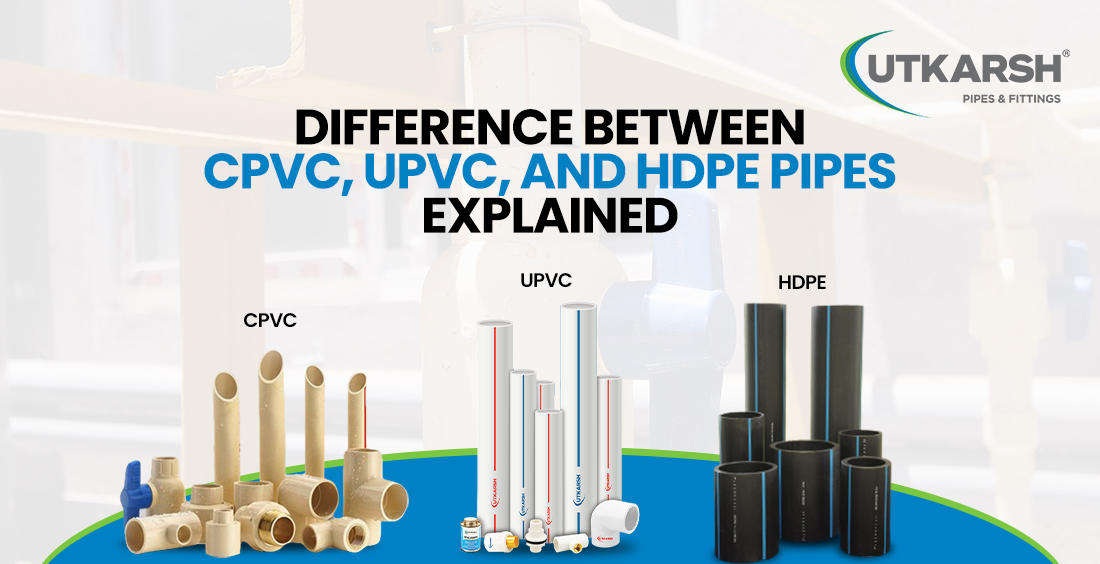
Difference Between CPVC, UPVC, and HDPE Pipes Explained
Jun 24, 2025
Ever wonder what’s hidden behind your walls, carrying water to your faucet, or in your bathroom, managing waste? The unsung heroes of any building are its plumbing pipes. Choosing the right type is important for a long-lasting, efficient, and safe water flow. Today, plastic pipes are often the go-to choice, replacing older metal options. They are lighter, resist rust, are easier to install, and are generally kinder to your budget. But with names like CPVC, UPVC, and HDPE floating around, it can get confusing. Let’s break down the difference between these common types of plastic pipes for plumbing in simple terms.
Plastic pipes have become the preferred choice, and they are steadily replacing old-school metal pipes. CPVC, UPVC, and HDPE are now the most common terms preferred for any piping solutions.
Why Plastic Pipes Rule Modern Plumbing
Some of the best features why these plumbing pipes have become so popular
- No Rust: Unlike iron or steel, plastics don’t corrode, ensuring cleaner water and longer life.
- Light Weight: Makes them much easier to transport, handle, and install.
- Smooth Inner Surface: Their smooth inner wall means less friction, allowing water to flow freely and efficiently.
- Chemical Resistance: They handle common water treatment chemicals very well
- Cost-Effective: Generally more affordable than metal alternatives.
Understanding the Different Types of Plumbing Pipes
1. CPVC (Chlorinated Polyvinyl Chloride) Pipes
The main feature of CPVC pipes is to tolerate heat, which is a limitation in the case of PVC. The “C” stands for Chlorinated, which is significant to tolerate the heat. Therefore, it is suitable for both hot and cold domestic water uses.
Common Uses: Entire domestic hot and cold water supply system within buildings, industrial liquid handling.
Key Benefits:
- Heat Resistance: It can withstand temperatures up to 200 degrees Fahrenheit, ideal for a hot water supply.
- Corrosion Free: Does not rust easily like metal pipe also guarantees long-lasting performance.
2. UPVC (Unplasticized Polyvinyl Chloride) Pipes
It is also known as Rigid PVC. The ”U” means no plasticizers (softening chemicals) are added.
Key Features:
- Super Strong and Stiff: Even more rigid and durable than standard PVC. Excellent for structural pressure.
- Weather Suitable: High resistance to sunlight (UV rays) and weathering, making it ideal for outdoor use.
- Chemical Resistance: Handle corrosive elements exceptionally well.
Common Uses: Main underground cold water supply lines, especially where high pressure or external exposure is a factor, industrial piping, and waste systems.
3. HDPE (High-Density Polyethylene) Pipes
Known for their flexibility and toughness. Usually black with distinctive raised stripes.
Key Features:
- The Flexibility: Can bend or curve, making it great for navigating around obstacles or uneven terrain without needing many fittings.
- Leak-Proof Joints: Uses heat fusion to weld joints, creating seamless, incredibly strong, leak-proof connections.
- Impact Resistance: Tough and resistant to cracks, even in freezing conditions.
- Corrosion and Chemical Proof: Excellent resistance to a wider range of chemicals and abrasion.
Common Uses: Main underground water supply lines (municipal and rural), gas distribution, slurry and mining pipelines, agricultural irrigation, and marine outfalls. Less common inside the house for standard hot/cold supply compared to CPVC.
PVC vs. CPVC vs. UPVC vs HDPE: A Quick Comparison
Features
CPVC
UPVC
HDPE
Best For
Hot and Cold water inside
Cold water, Outdoor/High Pressure
Underground mains, Gas, and Flexible needs
Temp. Range
Hot and Cold water
Cold water only
Hot and Cold water
Flexibility
Rigid
Very Rigid
Flexible
Key Strength
Hot Water Capability
Weather/UV Resistance
Impact Resistance, Leak-Proof Joints
Main Uses
Indoor Water Pipes
Outdoor Mains, Drainage
Underground Utilities
Features | CPVC | UPVC | HDPE |
Best For | Hot and Cold water inside | Cold water, Outdoor/High Pressure | Underground mains, Gas, and Flexible needs |
Temp. Range | Hot and Cold water | Cold water only | Hot and Cold water |
Flexibility | Rigid | Very Rigid | Flexible |
Key Strength | Hot Water Capability | Weather/UV Resistance | Impact Resistance, Leak-Proof Joints |
Main Uses | Indoor Water Pipes | Outdoor Mains, Drainage | Underground Utilities |
How to Choose the Right Pipe
There is no single “best” pipe. The right choice depends entirely on your project:
- Temperature: CPVC is essential for indoors as it is suitable for both hot and cold water. UPVC, or HDPE, is suitable for cold water.
- Location: CPVC is recommended for water flow. For outdoor exposure to the sun, UPVC is an excellent choice. And for buried underground, HDPE, UPVC are strong contenders.
- Pressure: To resist high pressure, UPVC or HDPE are excellent choices. Standard household uses can be done with CPVC, which works well.
- Flexibility: HDPE shows the major advantage of flexibility. Toughness and rigidity can be found in CPVC and UPVC.
- Leak Proof: HDPE is the answer for leakproof and comfortable welded pipe connections.
Trust the Expert for Quality Flow:
Understanding these different factors empowers you to make informed decisions, whether you are a homeowner planning a renovation or a professional specifying materials. Using the right type of plastic pipes for plumbing ensures safety, efficiency, and longevity for your plumbing system.
When quality and reliability are non-negotiable, choosing a pipe from a reputable pipe manufacturer is an essential choice to make. At Utkarsh Pipes and Fittings, we take pride in manufacturing a wide range of high-performance CPVC, UPVC, and HDPE pipes designed to meet diverse needs and stringent quality standards. Utkarsh pipes use premium materials and advanced processes to deliver pipes you trust for every application-from the main supply lines to your kitchen sink.
Explore our range and find the perfect pipe solution for your next project. Over the last five decades, Utkarsh Pipes and Fittings has been a partner for reliable, efficient, and long-lasting plumbing systems in Kolkata.
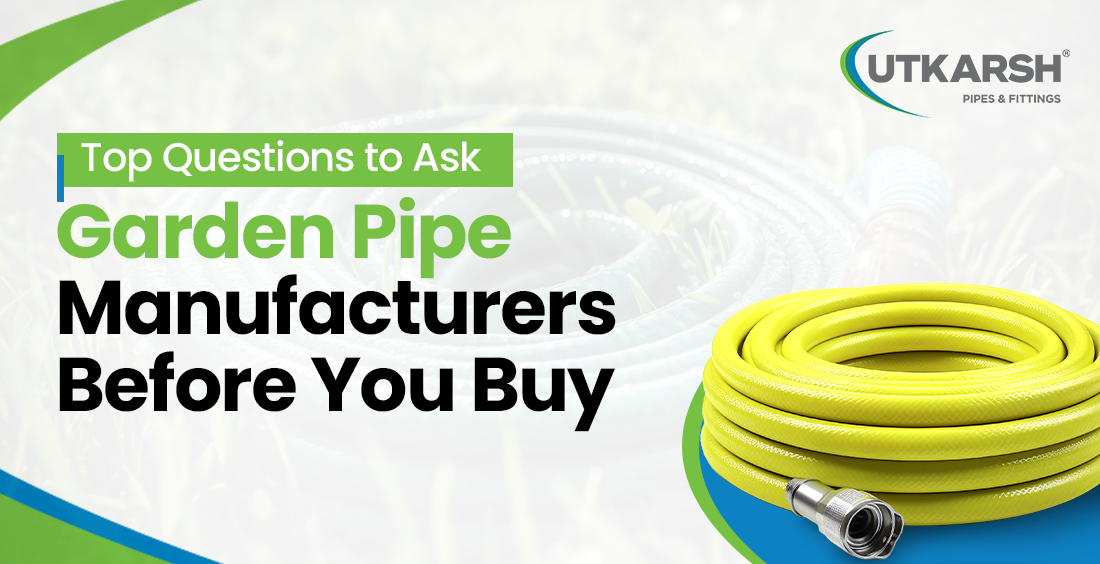
Top Questions to Ask Garden Pipe Manufacturers Before You Buy
May 27, 2025
Gardening becomes effortless when your tools work for you, including your choice of pipe. A flexible garden pipe can add to the smoothness of watering your plants by making it hassle-free and efficient. Asking the proper questions and getting the correct answers from the garden pipe manufacturers can help save you a lot of frustration in the future. Making the right decision out of so many options in the market becomes easier when you know what to look for. Here’s a complete garden pipe buying guide with the top questions you should ask to ensure you bring home the best. Out of all the guides available, this is one question that gets avoided the most. The durability and flexibility of the pipe are determined by the raw material it is made of. Typically, pipes made from virgin-grade plastic or good quality PVC tend to hold up better in terms of durability and efficiency. On the other hand, low-grade plastic pipes tend to crack, melt or stiffen over time, especially under extreme weather. Having the right garden pipe material can save you a lot in maintenance. India experiences a wide range of temperatures. So, ask if the flexible garden pipe can handle both scorching heat and chilly winters. Pipes that become stiff in winter or soften in summer are not ideal. Reliable garden pipe manufacturers will provide pipes that stay flexible and usable across all weather conditions. Twisting, kinking, or tangling is a common issue with low-quality pipes. Ask manufacturers how well their flexible garden pipe maintains shape and usability after repeated use. Good pipes should bounce back into shape without kinking. This is especially important if you have a larger garden that requires regular movement of the pipe. Pipe thickness determines durability. Thin pipes may be lighter but tend to wear out faster. Thicker pipes are generally more robust and longer-lasting. However, they shouldn’t be too heavy to carry around the garden. A reliable garden pipe buying guide would always suggest striking a balance between weight and durability. Ask if the pipe is UV-stabilized. Pipes exposed to sunlight every day should have protection against fading and weakening. UV protection ensures your flexible garden pipe maintains its strength and color even after years of outdoor use. It’s always wise to ask about product assurance. Good garden pipe manufacturers back their products with a clear warranty or quality guarantee. This shows confidence in their product and offers you peace of mind. Before you wrap up your decision, consider Utkarsh Pipes & Fittings, one of the leading garden pipe manufacturers in India. Their pipes are proudly made in India with a vision of building a greener future. These all-weather pipes can withstand extreme temperature variations without melting or becoming brittle. Made from superior garden pipe material, they resist twisting and tangling—even after extended periods of non-use. Plus, their vibrant colors don’t fade, thanks to high-quality pigments. With a diverse product range and dependable performance, Utkarsh stands out as a trusted name in every garden pipe buying guide. Choosing the right flexible garden pipe means asking the right questions before making a purchase. From material quality and weather resistance to UV protection and durability, each factor plays a role in how your pipe performs daily. Don’t settle for less—talk to trusted garden pipe manufacturers and let your garden thrive with the right tools by your side.1. What Material Is Used to Make the Garden Pipe?
2. Is the Pipe Resistant to Temperature Changes?
3. How Flexible and Tangle-Free Is the Pipe?
4. What Is the Pipe’s Wall Thickness and Weight?
5. Does the Pipe Have UV Protection?
6. Is There a Warranty or Guarantee Provided?
Why Choose Utkarsh Pipes & Fittings?
Concluding Remark
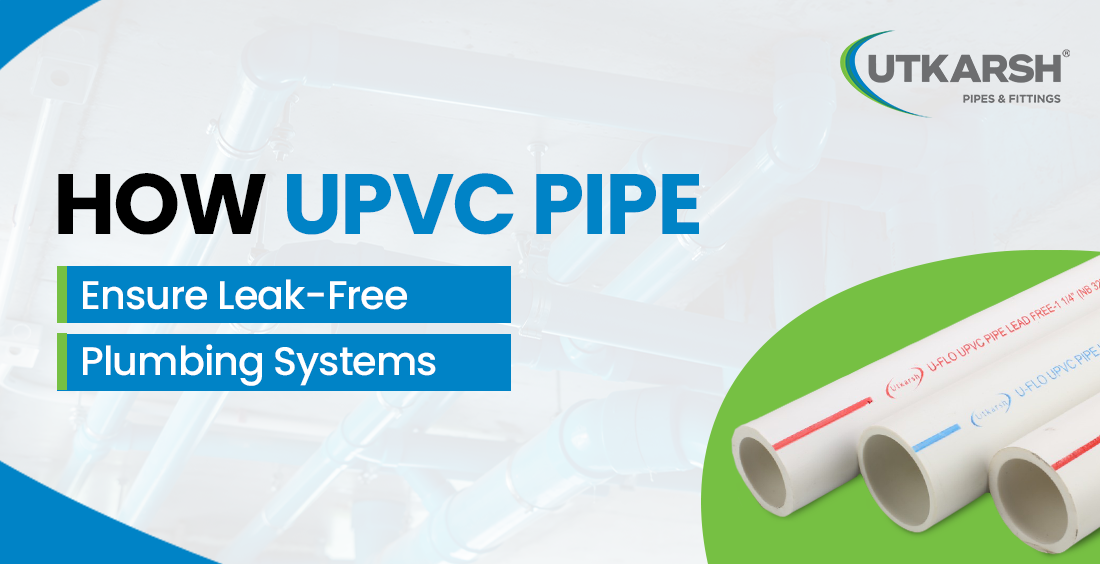
How uPVC Pipe Ensure Leak-Free Plumbing Systems
May 27, 2025
The best pipes for home plumbing for updating a water system are those that offer longevity, safety, and—above all—leak-free plumbing. Plumbing uPVC pipe enters at this point. Due to its many benefits that help create leak-proof systems, these pipes are frequently utilized in both residential and commercial plumbing systems. Let's analyze how uPVC pipes help create a leak-free plumbing system and also why they rank high in the best pipes for home plumbing. Leaks in plumbing joints are one of the most common problems, and with uPVC pipe for plumbing, the joints are manufactured to be close-fitting as well as seamless. These pipes use a solvent cement welding method which guarantees a perfect fit between the pipe and fitting. After curing, this bond is almost as strong as the pipe itself, and thus severely diminishes chances of leakage. That makes uPVC pipes the ideal choice for leak-free plumbing systems in homes and buildings. Unlike metal pipes, uPVC pipes do not corrode over time. They resist rust, scaling, and other chemical reactions. This quality ensures that there is smooth water flow while the pipe remains intact for years. In addition to no internal buildup, there is a minimal chance of pressure buildup and cracks which is very common when people face issues with leaking pipes. For homeowners who are looking for the best pipes for home plumbing, uPVC piping provides peace of mind with its sustained performance. Know more: uPVC Pipe Safety Standards - Regulations & Certifications uPVC pipe for plumbing is meant to endure extreme weather/ temperature. They do not expand or contract greatly and they retain structural form whether it be hot or cold seasons. This structural consistency aids in preventing joint movement and pipe breaks thereby minimizing instances for leaks. These pipes are especially useful for home plumbing pipes when there is a sudden flux in climate as these pipes have a long service life. When compared to other types of pipes, the thermal conductivity of uPVC pipes is lower. This property helps prevent cracks from forming due to temperature changes, which protects plumbing systems and augments their reliability. Due to the chronic risks associated with cracks, such as pipeline breaks, the use of uPVC pipe for plumbing certainly guarantees protection plumbing frameworks will last for many years. The inner surface of a uPVC pipe is extremely smooth, which reduces friction and allows water to flow easily. This not only improves water pressure but also helps maintain leak-free plumbing over time. Rough or corroded pipes often cause turbulence and eventual wear, which leads to leakage. uPVC prevents all that, making it a great long-term solution. Check this out: How often should you inspect UPVC pipes for signs of wear? To ensure your plumbing system remains durable and leak-free, it’s essential to choose quality products from trusted uPVC pipe fittings manufacturers. Utkarsh Pipes is one such name. A leading manufacturer and supplier of high-quality uPVC pipes, Utkarsh delivers products made from top-grade, lead-free materials. Their uFLO UPVC pipes are perfect for cold water supply, engineered to resist harsh chemicals and ensure long-lasting, leak-proof performance in both residential and chemical sector applications.
If
you’re looking to build a reliable and leak-free plumbing system, choosing the right materials is key. uPVC pipe for
plumbing offers several benefits — from strong joints and corrosion resistance to weather durability and chemical
safety. With trusted
uPVC pipe fittings manufacturers
offering high-quality options, making the right choice is easier than ever. For peace of mind and long-term
performance, uPVC pipes are truly among the best pipes for home plumbing.
1. Unsurpassed Jointing with No-leak Seal
2. Resistance to Corrosion and Other Chemicals
3. Durable and Weather-Resistant
4. Low Thermal Conductivity Prevents Cracking
5. Smooth Internal Surface for Steady Flow
Quality You Can Trust: Utkarsh Pipes & Fittings
Conclusion
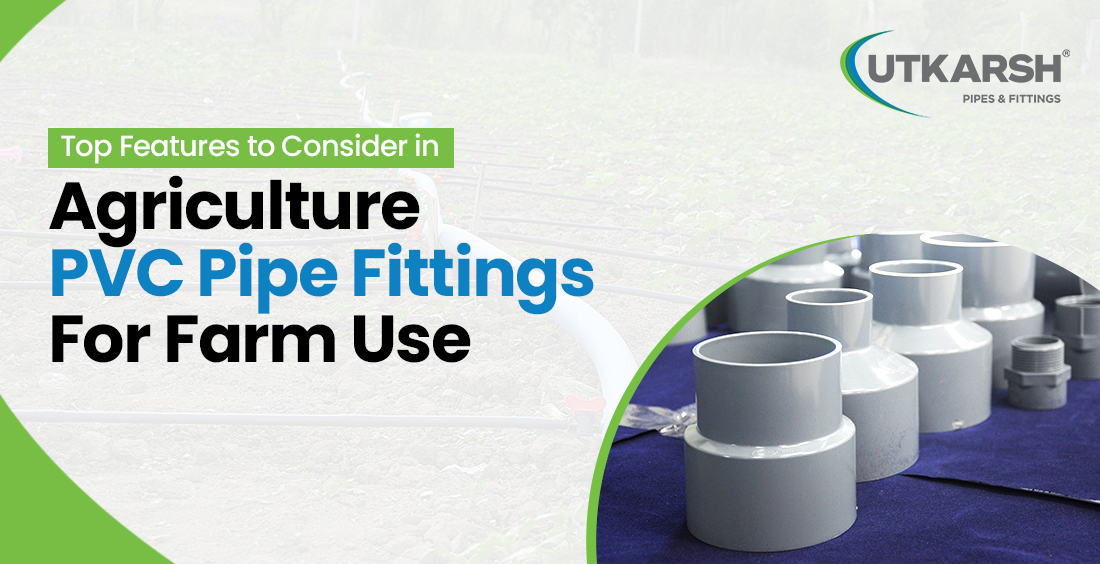
Top Features to Consider in Agriculture PVC Pipe Fittings for Farm Use
May 20, 2025
Agriculture PVC pipe fittings types serve the purpose of making certain that water supply is available in every part of a field. If you are installing a new irrigation line, or simply want to replace a few worn-out parts, the right agriculture PVC fittings have the potential to transform steady crop growth into patches devoid of crops in the field. Now, let’s understand what really differentiates one fitting from the others in an agricultural setting. Also read: How to Select the Right Agriculture PVC Pipe Fittings for Irrigation Irrigation fittings and agricultural profiles need to be tough. Each PVC irrigation pipe fitting will succumb to the sun, water pressure, changes in temperature, and at times even rough treatment during installation or maintenance, thus best quality PVC material is a must. It needs to be non-corrosive, UV-stabilized, and resistant to wear and tear over time. The right agriculture PVC pipe fittings types will guarantee years of service without the need for replacing or repairing them constantly. Improperly selected agricultural irrigation fittings will be a persistent source of irritation caused by leakage. Each drop of water is important on a farm. Good PVC irrigation pipe fittings have a reliable connection that prevents leaks and keeps the water where it needs to be, on the crops. Well-designed engineering guarantees tight joins even when different pressures act on them. Make sure you buy fittings with rubber ring joints or ones that can be solvent welded and thus be leak free. Not all farms have the same water pressure levels. Some use gravity-fed systems, while others rely on motorized pumps. Your agriculture PVC pipe fittings need to handle the specific pressure your farm system operates under. Choosing fittings rated for high-pressure systems can prevent blowouts and ruptures. Make sure to check pressure ratings and select accordingly. Nobody wants to wrestle with pipe fittings in the middle of a hot field. The best PVC irrigation pipe fittings are easy to install and don't require specialized tools. They should also be easy to disassemble for cleaning or replacement. Fittings with ergonomic design features or standardized sizing can save hours during installation and future maintenance. Before adding new fittings, it’s important to check compatibility with your current system. The PVC pipe fittings types available in the market can vary by size, threading, and joining method. Picking fittings that seamlessly fit into your existing PVC pipeline will save both time and money. Avoid forced fits—they only lead to cracks or leaks later. Farming often involves fertilizers, pesticides, and varying soil pH levels. Cheap or low-quality agriculture PVC pipe fittings may degrade quickly under such conditions. Go for fittings that are specifically rated for agricultural use—they resist chemical corrosion and remain intact even in challenging soil conditions. A single farm might need fittings for overhead sprinklers, underground drip lines, and drainage systems. That’s where the diversity in agriculture PVC pipe fittings types matters. Elbows, couplers, reducers, tees—each fitting serves a specific purpose. Choose a supplier that offers a complete range of PVC irrigation pipe fittings to match your farm’s varying irrigation needs. Know more: Application of Agriculture Pressure Pipes & Fittings As one of the leading producers of agricultural pressure pipes and fittings in India, Utkarsh Pipes & Fittings delivers more than just components—we offer reliability. Our wide selection ensures smooth and effective water delivery systems tailored to farming needs. Meticulously designed from Polyvinyl Chloride (PVC), our Grey Agricultural Pipes are engineered specifically for irrigation and drainage. Known for durability and application versatility, Utkarsh's agriculture PVC pipe fittings are designed to maintain efficient water flow, directly supporting higher productivity on farms. Smart irrigation starts with smart components. From pressure capacity and leak resistance to chemical durability and fitting compatibility, every factor plays a role in how effectively your water distribution system performs. Choosing high-quality PVC irrigation pipe fittings isn’t just a smart investment—it’s a silent partner in your farm’s success. With trusted brands like Utkarsh Pipes & Fittings offering reliable agriculture PVC pipe fittings, farmers are better equipped to irrigate with confidence.1. Material Quality and Durability
2. Leak-Proof Connections
3. Pressure Handling Capacity
4. Ease of Installation and Maintenance
5. Compatibility with Existing Pipes
6. Resistance to Chemicals and Soil Contaminants
7. Versatility in Application
A Trusted Name in Agricultural Piping: Utkarsh Pipes & Fittings
Conclusion
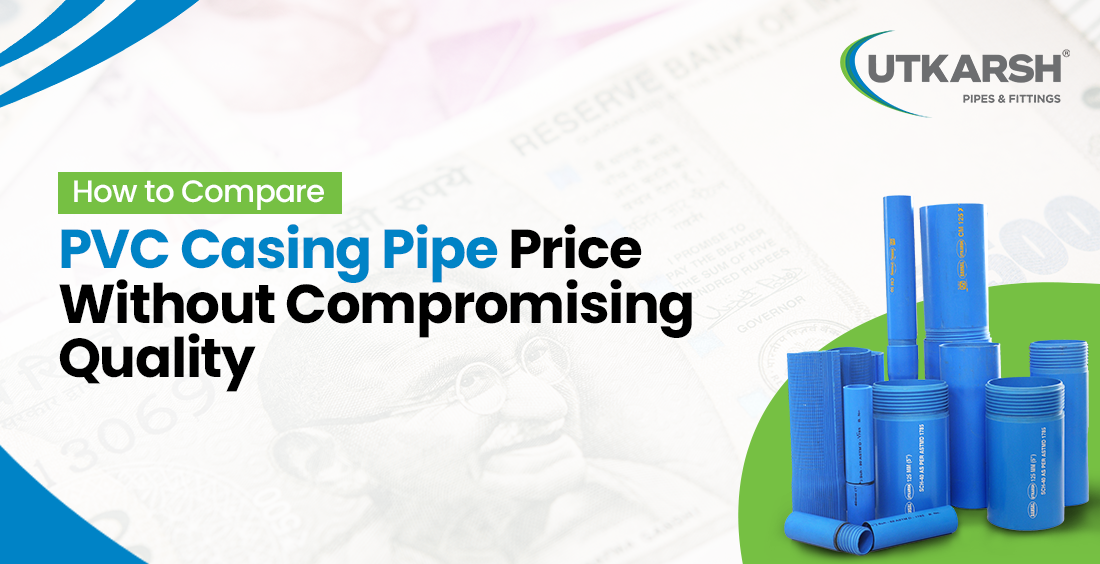
How to Compare PVC Casing Pipe Price Without Compromising Quality
May 15, 2025
Catering for a borewell pipe requires more considerations than just the price of the pipe. The cheapest option is never the best, and the quality can sometimes pose issues down the line which you never anticipated. You should balance price and performance to guarantee quality value. This is where choosing the right PVC casing pipe becomes pivotal. In this blog, we will assist you in ensuring that you do not compromise on quality while trying to save money. The borewell pipe looks appealing when it is cheaper, but there is nothing appealing about the price if the quality is bad. Always double check the specifications before purchase; focus on the material grade, thickness, and pressure resistance. Not all PVC casing pipes are the same. The initial cost of a PVC casing pipe can have poor upfront value due to lack of durability and frequent replacements. Also monitor the borewell pipe size. As indicated, cheaper alternatives will always lack some form of value. Cheap prices and poor quality always go hand in hand, and those pipes tend to lack durability of frequent replacements. You should not get lured into purchasing pipes with no brand name on them simply because of their lower borewell pipe price. This is because well-known manufacturers go through quality control checks and often follow ISI standards which impacts the pipe's performance in the long-run. In addition, a branded product also guarantees uniformity of borewell pipe diameter and strength in all batches. When evaluating brands, ensure to ask for product certificates and performance guarantees. This simple step can save you a lot of money in the future. Know more: IS 12818: PVC Casing Pipe Standards in India Not all pipes are made for all terrains. A casing pipe that performs well in hard rock might not work efficiently in sandy or loose soil. Compare how each option performs in your local geological setting. Pipes that are specifically designed for sandy or silt-heavy areas might be priced slightly higher, but they’re worth it. Check if the manufacturer provides data on pipe performance in specific conditions. If the borewell is being installed in a region with high soil collapse potential, investing in the right borewell pipe size and strength becomes absolutely essential. This is where real value kicks in. A slightly higher borewell pipe price often comes with better after-sales service, on-site consultation, and warranties. If you’re managing a large-scale project or installing borewells in multiple locations, this can be a game-changer. A warranty isn’t just a marketing gimmick — it’s a signal that the manufacturer stands by their product. Always include this in your comparison checklist. If your project requires multiple units, check if the manufacturer or supplier offers a transparent pricing structure for bulk purchases. Some brands offer volume-based discounts, which means your borewell pipe price per unit could drop significantly. Ensure that the pricing includes GST, transportation, and installation support — hidden costs can mess up your budget calculations if not accounted for early on. Check this out: What Affects PVC Casing Pipe Price? Key Cost Factors Explained Before you make your final choice, consider pvc casing pipe options from Utkarsh Pipes & Fittings, a trusted name in India’s borewell and construction industry. Known for their durable and versatile products, Utkarsh manufactures casing pipes that are especially reliable for borewells in sandy-loose and highly collapsible soil conditions. Whether you're concerned about long-term performance or structural stability, Utkarsh delivers quality backed by years of expertise. Price comparison is not just about finding the cheapest option — it's about identifying the best value. By checking specifications, ensuring consistent borewell pipe size, evaluating performance in local conditions, and trusting reputed manufacturers, you can confidently choose a PVC casing pipe that fits both your budget and your expectations. Don’t let a low borewell pipe price fool you — look deeper, compare smarter, and invest in a solution that lasts.1. Examine Specifications of the Pipe and Not Just Pricing
2. Compare Pipes from Trusted Brands Only
3. Evaluate Performance in Specific Soil Conditions
4. Don’t Ignore After-Sales Support and Warranty
5. Bulk Purchase Benefits and Transparent Pricing
Choosing the Right Manufacturer Matters
Conclusion
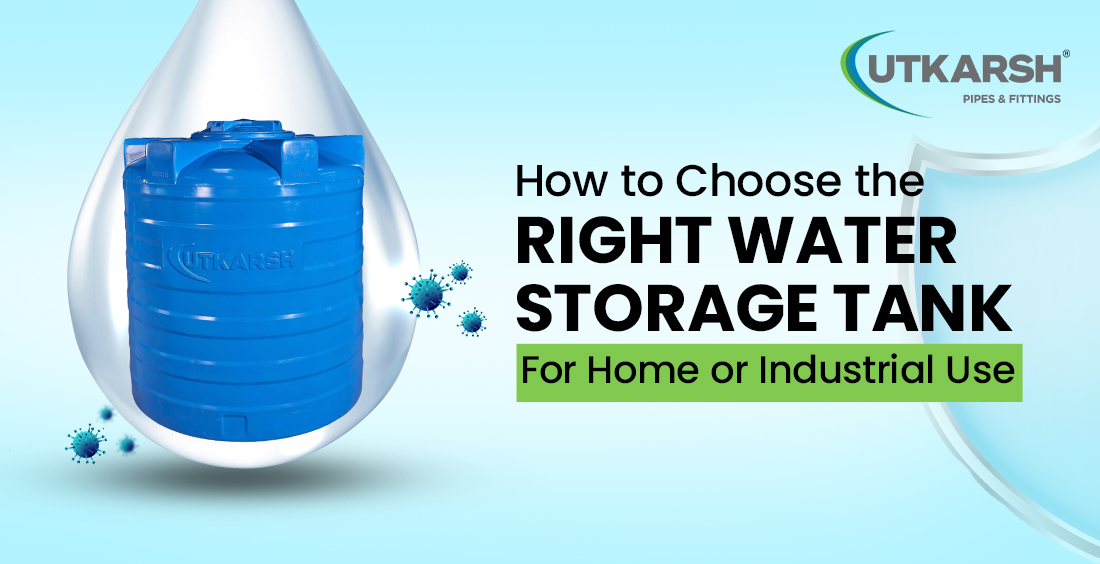
How to Choose the Right Water Storage Tank for Home or Industrial Use
Apr 25, 2025
Selecting a water storage tank is, surprisingly, a tricky decision. From the outset, it sounds easy with so many options like stainless steel or plastic, but each and every option tries to market themselves as the “best” leading to unnecessary confusion. And just when you think you’ve narrowed it down, the debate of stainless steel water tank vs plastic hits you from every direction. This blog strives to ensure that from the greatest noise in the market, you need clarity regarding how to make the right water tank selection, whether for your personal use or for industrial purpose. The first step in water tank selection is to identify where or how you intend to use it. In a domestic setting, considerations include design and aesthetic values as well as hygiene. Industrial settings have a different sphere of consideration. In this case, key focal areas deal with volume, durability, temperature resistance, and structural strength. Don’t eyeball it. Use actual calculations based on daily water usage and storage needs during supply cuts or power failures. A family of four might require 1000–2000 liters, while industrial setups might need several thousand liters daily. Buying the wrong size can either waste space or leave you constantly low on water. Not all materials react the same to environmental stress. This is where the stainless steel water tank vs plastic discussion comes into play. Stainless steel is more robust, long-lasting, and better at keeping water cool. Plastic is lighter, more affordable, and easier to install. But which one suits your use-case best? Hold that thought—we’ll compare them in detail in a moment. Is your tank going on a rooftop? Underground? Near a production unit? The installation spot determines the tank’s design, strength, and UV resistance. Outdoor tanks need UV protection, while underground tanks must handle external pressure. Always look for certified water storage tanks that meet BIS (Bureau of Indian Standards) or equivalent norms. These guarantee the tanks are tested for health and durability. Some tanks need regular cleaning and inspection; others are designed to minimize bacterial or algae growth. Consider your maintenance bandwidth before making your final water tank selection. Now talk about the most asked question: stainless steel water tank vs plastic. While both have their merits, plastic water tanks offer practical advantages that make them a more suitable and popular choice for most users. Cost-Effective: Plastic tanks are significantly more budget-friendly, accessible for both home and industrial use without compromising on quality. Lightweight and Easy to Handle: Unlike stainless steel, plastic tanks are easier to transport, install, and reposition if needed. This makes them especially ideal for rooftop or modular setups. Design Flexibility: Available in a wide variety of sizes, colors, and shapes, plastic water tanks easily blend into residential and commercial environments. Advanced Protection: High-quality plastic tanks—like those from Utkarsh Pipes & Fittings—are engineered with UV protection and anti-microbial properties, making them safe for long-term water storage. Durability with Strength: Modern plastic tanks are designed for strength too. Utkarsh’s six-shoulder design ensures superior compressive strength, enhancing long-term durability. While stainless steel tanks are known for their strength and resistance to corrosion, they often come at a much higher price point. They’re also heavier and more challenging to install. For users seeking a high-performance, low-maintenance solution at a reasonable cost, plastic tanks come out ahead—especially when sourced from trusted manufacturers. In the stainless steel water tank vs plastic debate, plastic proves to be the more versatile and value-driven choice, particularly when backed by innovation and quality manufacturing like that of Utkarsh Pipes & Fittings. Speaking of quality—if you're in the market for dependable water storage tanks, check out Utkarsh Pipes & Fittings. We’re one of the top water tank manufacturers in India, known for prioritizing safety and purity at every step of the manufacturing process. Featuring a unique six-shoulder design, these tanks offer impressive compressive strength. Plus, they are resistant to micro-bacterial and fungal growth, corrosion, and UV rays. With a wide variety of tank sizes and styles, we make water tank selection a much simpler job.Step-by-Step Guide to Water Tank Selection
Define Your Usage: Domestic or Industrial?
Calculate the Required Capacity
Check Material Compatibility
Assess the Location of Installation
Prioritize Safety Standards and Certifications
Look into Maintenance Requirements
Stainless Steel Water Tank vs Plastic – Why Plastic is the Smarter Choice
Why Choose Plastic Water Tanks?
What About Stainless Steel?
Utkarsh Pipes & Fittings: A Trusted Name in Water Storage Tanks
Concluding Remark
Choosing the right water storage tank isn’t a one-size-fits-all decision. It’s about matching your needs with the right material, size, and design. From identifying your usage type to considering safety standards and finally weighing the stainless steel water tank vs plastic decision—you now have a roadmap to follow.
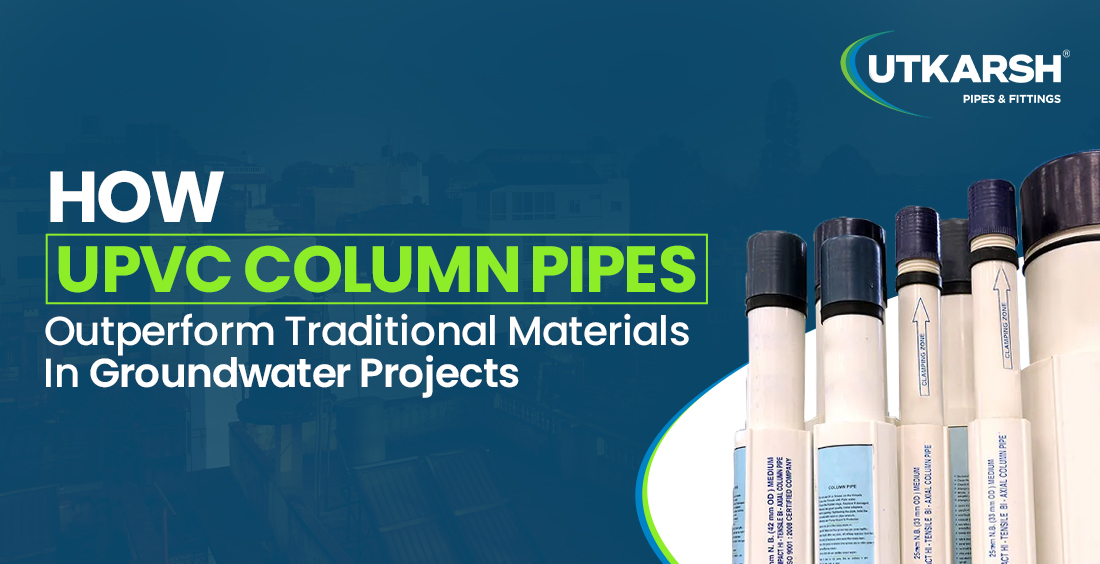
How uPVC Column Pipes Outperform Traditional Materials in Groundwater Projects
Apr 25, 2025
While metal pipes undergo rusting and concrete pipes undergo cracking, the UPVC pipe maintains its durability, remaining intact even in the harshest groundwater conditions. Concrete and metal pipes don’t cut it where pipe water requires reaching out deep down, over and over again. In this case, the uPVC column pipes elongate and don’t lose their strength. These pipes are built to last and are aimed to outperform. Now let’s analyze how and why professionals around the world are relying heavily and swiftly on column pipes made out of UPVC over traditional materials used in groundwater projects. Column UPVC pipes do not rust and get corroded by rich minerals in groundwater like metal pipes do. Unlike column pipes, UPVC pipes are resistant to rusts, electric chemical actions, and damage, which ensure they perform well even under rigid conditions throughout its lifetime. Because the column pipes made from UPVC don’t respond to rusting, servicing the area where clean water is provided and pollution free, with maintenance guarantee, becomes easier. The durability of this type of uPVC pipe results in reduced expenditure, enhanced infrastructure for the water supply, dependable treatment, and fewer interruptions during service. Also know: Why Column Pipes Are the Backbone of Borewell Water Systems? Traditional materials like iron or concrete are heavy, difficult to transport, and cumbersome during setup. In contrast, uPVC column pipes are lightweight, making them easier to handle and install without requiring heavy machinery. This ease of handling contributes significantly to pipe installation efficiency. The reduced weight lowers transportation costs and minimizes the risk of on-site injuries. Yet, despite being lightweight, these pipes are incredibly strong—perfect for deep borewell installations and high-pressure pump systems. Thanks to their smooth inner walls, uPVC column pipes offer minimal friction loss, which improves water flow rates and pump performance. This translates to energy efficiency and lower electricity bills over time. With traditional pipes, rough inner surfaces can lead to sediment buildup, reducing flow and eventually blocking the system. That’s not the case with uPVC. These pipes maintain their flow efficiency over the years, adding to both upvc pipe durability and system longevity. Time is money, especially in infrastructure projects. uPVC column pipes are designed for quick assembly with leak-proof joints and minimal fittings. Their threaded couplers and rubber sealing systems make installation fast, easy, and secure. Contractors appreciate this level of pipe installation efficiency, as it speeds up project timelines and reduces labor costs. There’s no need for welding, coating, or complicated sealing techniques—just a clean, straightforward install. Sure, initial costs matter—but long-term performance is where real savings show. With upvc pipe durability, you're investing in a material that demands less upkeep, resists damage, and holds up under high pressure. Traditional pipes might need regular inspections, replacements, or even full system overhauls. But with uPVC column pipes, maintenance is minimal, and lifespan is significantly extended. That’s peace of mind—without the maintenance headaches. Made with superior uPVC compound, our column pipes feature heavy-duty sealing rings crafted from certified industrial-grade rubber. These rings don’t just keep things leak-proof—they absorb pump vibrations, extend pipe life, and guarantee a hassle-free water supply. With Utkarsh Pipes & Fittings, you’re not just buying pipes; you’re investing in dependable, long-term upvc column pipes performance. Read more: Maintenance Tips for Long-Lasting Column Pipe Performance | Utkarsh Pipes & Fittings In every critical metric—upvc pipe durability, hydraulic performance, corrosion resistance, and pipe installation efficiency—uPVC outshines traditional materials. For groundwater projects that demand strength, speed, and reliability, uPVC column pipes are the smart, future-ready choice. Make the switch, and experience how modern materials can transform old challenges into new solutions.1. Greater Resistance towards Chemicals and Corrosion
2. Lightweight Yet High-Strength Structure
3. Excellent Hydraulic Performance
4. Improved Pipe Installation Efficiency
5. Long-Term Cost Benefits
Conclusion
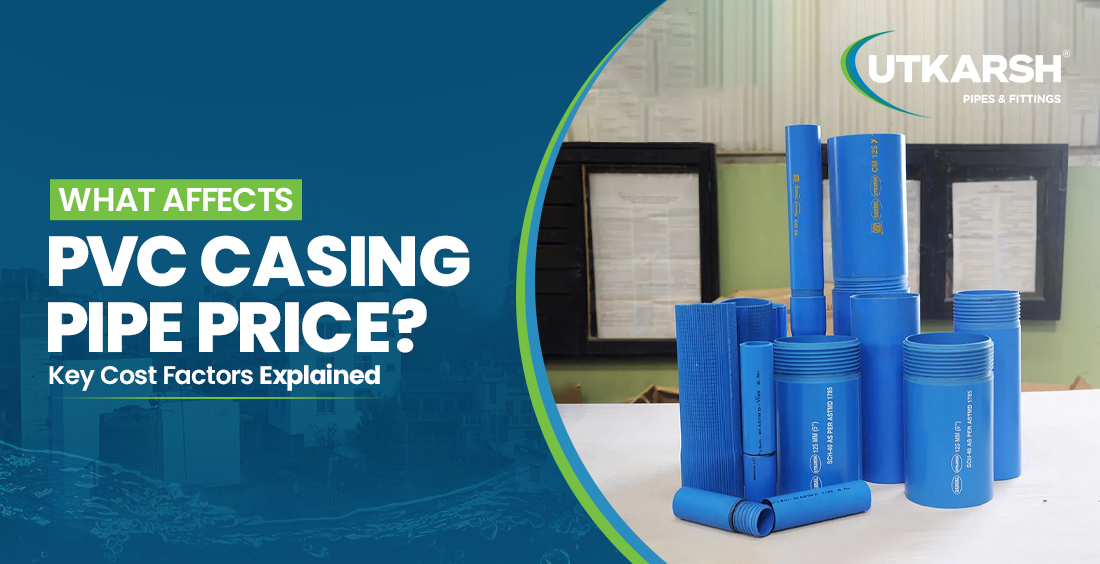
What Affects PVC Casing Pipe Price? Key Cost Factors Explained
Apr 25, 2025
There’s always that one element beneath the surface that decides the success of your borewell: the borewell casing pipe. Often overlooked but absolutely essential, this pipe forms the backbone of any water extraction setup. And while picking a good one may seem simple, the pvc casing pipe price can swing based on a bunch of things that aren’t always obvious upfront. If you’ve ever wondered why borewell pipe cost varies so much from one supplier to another, or what drives the pricing trends, you’re in the right place. The very foundation of a pvc casing pipe price depends on its material composition. Pipes made from virgin PVC (unrecycled and pure) tend to cost more than those made from reprocessed materials. The reason? Virgin PVC offers better durability, higher resistance to chemical corrosion, and longer lifespan. These are non-negotiables for a borewell casing pipe, especially in deep installations where pressure and water conditions can be tough. This is the point where raw borewell pipe cost begins to vary. Increasing wall thickness and pipe diameter increases the volume of raw material required, and more material means higher costs. Besides cost, thicker pipes are able to resist underground pressure better, particularly in areas with loose or collapsible soil. So, if you’re seeking thinner pipes to save costs, the expense in repairs down the line may be more costly. Pipes are generally sold in standard lengths, but sometimes projects require custom sizing or longer continuous runs. Longer pipes or custom-cut sections can raise the borewell pipe cost due to added labor or changes in the manufacturing process. Also, transporting longer lengths can add logistical expenses, which often reflect in the final price tag. A pvc casing pipe price that seems high might actually reflect quality assurance. Pipes that meet IS (Indian Standards) or BIS (Bureau of Indian Standards) certifications ensure durability, safety, and regulatory compliance. These certified pipes are tested for pressure endurance, material strength, and chemical resistance—making them ideal for borewell use, but also slightly pricier. Learn more: IS 12818: PVC Casing Pipe Standards in India This is one of those hidden cost factors. If the manufacturing unit or warehouse is far from your project site, expect to pay more. Transportation and handling charges play a big role in the final borewell pipe cost, especially for bulk orders or remote locations. Local availability can help reduce this cost significantly. Just as not all pipes are manufactured the same, so are brands. Most manufacturers will sell their products at a premium price, but reputable ones will provide warranty and quality service. The added expense for the pvc casing pipe will purchase better performance from your borewell casing pipe in the long run. Of all the trusted brands, Utkarsh Pipes & Fittings is one of the most noted. It has earned trust as a PVC casing pipe manufacturer since we consider every single one of our products as meeting quality requirements. Our pipes offer multifunctional industrial use and are also heralded for being the best borewell pipes. In case you are looking for strength and dependability in areas of soil with high collapsibility, collapse prone zones, Utkarsh borewell casing pipes are the solution. Also read: Why Column Pipes Are the Backbone of Borewell Water Systems? The pvc casing pipe price isn't just a number—it’s a reflection of quality, durability, logistics, and trust. From material grade and thickness to certifications and brand credibility, multiple factors come into play. Choosing the right borewell casing pipe means balancing cost with performance. Always remember: cutting corners today might cost you double tomorrow. So, before you decide based solely on the lowest borewell pipe cost, consider what’s really going underground. Because once it’s buried, you’ll want it to stay there—strong, stable, and leak-free—for a long, long time. Of course, the popularity of PVC is due to its flexible nature, sturdy construction and application in plumbing, construction, electrical, and industrial uses. The future of PVC is bright with its increased need, recyclability, and use in building and facilities maintenance. Depending on the usage, soil quality, and installation, PVC pipes can last anywhere from 50 to 100 years.Material Quality & Grade
Diameter and Wall Thickness
Length of the Pipe
IS Mark Certification and Standards
Location and Delivery Charges
Warranty and Brand Recognition
Reliable Pipes Come From Reliable Manufacturers
Wrapping Up
FAQs:
Is PVC popular?
What is the life expectancy of PVC?
How long do PVC pipes last?
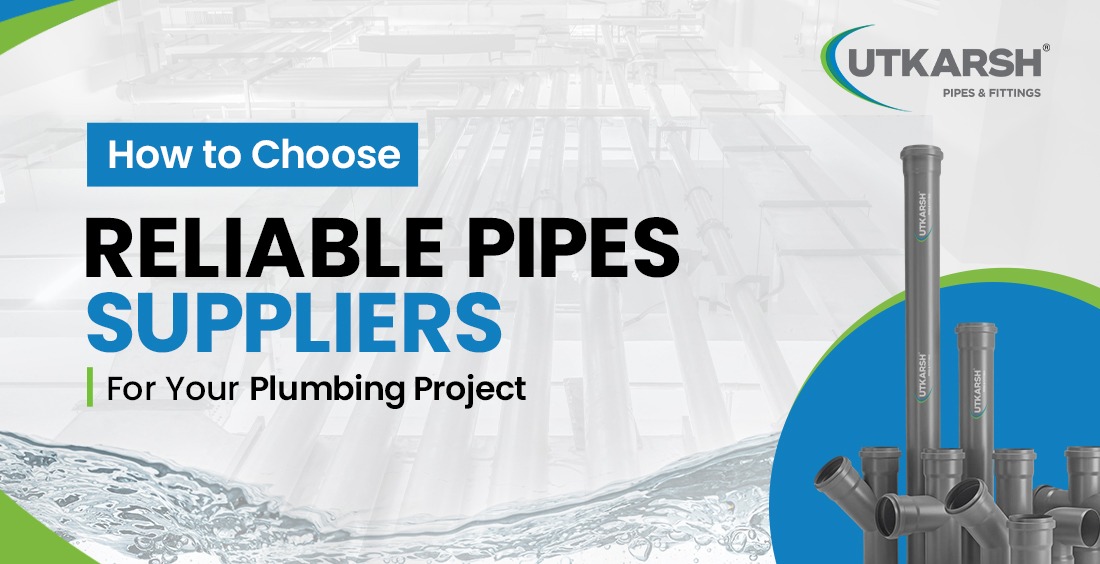
How to Choose Reliable Pipes Suppliers for Your Plumbing Projects
Apr 25, 2025
Sometimes plumbing projects can go awry, and if that has happened to you, there’s a good chance your materials and plumbing supplies had a lot to do with it. There are many different suppliers, but what is needed is to get the job done, meaning that steps need to be followed right from the start, such as choosing the right pipe distributors. Everything from simple residential renovations, to large-scale commercial setups require the right pipes to be chosen, and those are literally the lifelines of the whole plumbing system. That is the reason why reliable plumbing suppliers are not just a box to check off, instead they form the foundation of the reliability and success of the project. Now, how do you filter the not so good options from the great ones? This checklist should help you out: Word travels fast—especially in the construction world. Ask around or look up reviews online. Reliable plumbing suppliers often have a track record that speaks for itself. You’ll want to go with pipe distributors who’ve worked with well-known builders, contractors, or even government projects. Don’t ignore red flags like delivery delays or quality complaints. A good reputation doesn’t happen overnight, and it’s usually built on consistent quality and service. A good supplier doesn’t just sell pipes—they offer solutions. The best pipe distributors will stock everything from uPVC, CPVC, and SWR pipes to fittings, valves, and accessories. Why does this matter? Because running from one place to another to source matching components is not only time-consuming but risky. Compatibility is key, and sourcing all your supplies from one trusted place ensures everything fits and functions smoothly. Don’t just take their word for it. Reliable plumbing suppliers will always have certifications and compliance documents to show that their products meet national or international standards. These could be ISI marks, ISO certifications, or other recognitions. It’s not about paperwork for the sake of it—it’s about knowing that the pipes won’t crack under pressure, leak after a few months, or cause long-term damage. For more details, click here: IS 12818: PVC Casing Pipe Standards in India Plumbing isn’t always plug-and-play. There are slope angles, pressure ratings, load-bearing calculations—and sometimes you need advice. A great pipe distributors team will offer technical support and suggestions based on your specific project. Whether it’s helping you select the right grade of pipe or giving tips on fittings, having a knowledgeable team backing you up makes a huge difference. Delays cost money. You want your materials ready when your team is ready to install them. This is where the efficiency of your pipe and fittings suppliers really shows. Check if they maintain a strong inventory and have logistics in place to deliver on time. A supplier who always runs out of stock or can’t give you a clear ETA isn’t worth the headache. Reliable pipe distributors are clear about their pricing. They don’t sneak in hidden charges or make you chase them for quotes. If you’re ordering in bulk, many suppliers will also offer better rates or bundle deals. That’s another reason why working with well-established reliable plumbing suppliers is smart—they understand your needs and offer practical solutions, not just products. A name worth knowing in this space is Utkarsh Pipes & Fittings. As one of the top pipe and fittings suppliers, we tick every box—from quality and variety to timely delivery and expert support. With 50+ years of manufacturing legacy, our range includes uPVC, CPVC, PVC, SWR, borewell, and HDPE pipes, plus water tanks—built for everything from homes to industries. Check this out: How CPVC Pipes Help in Reducing Water Wastage and Leakages? This one’s often overlooked but super effective. Ask your shortlisted pipe distributors to share samples. This way, you can physically inspect the product—check its build, flexibility, thickness, and overall finish. It’s better to invest a little time upfront than regret a large purchase later. Most reliable plumbing suppliers will happily provide samples because they know their quality speaks for itself. Your plumbing project deserves materials that will last, perform, and give you peace of mind. Choosing the right pipe distributors is about doing a little research and trusting suppliers with a proven track record. Reputation Says a Lot – Start with Pipe Distributors Who Are Talked About for the Right Reasons
Wide Range of Products
Certifications & Quality Standards
Customer Support & Technical Guidance – Real Help When You Need It
Timely Delivery & Stock Availability
Transparent Pricing & Flexible Bulk Deals
A Trusted Name That Does It All
Bonus Tip: Ask for a Sample Before Placing Big Orders
Conclusion
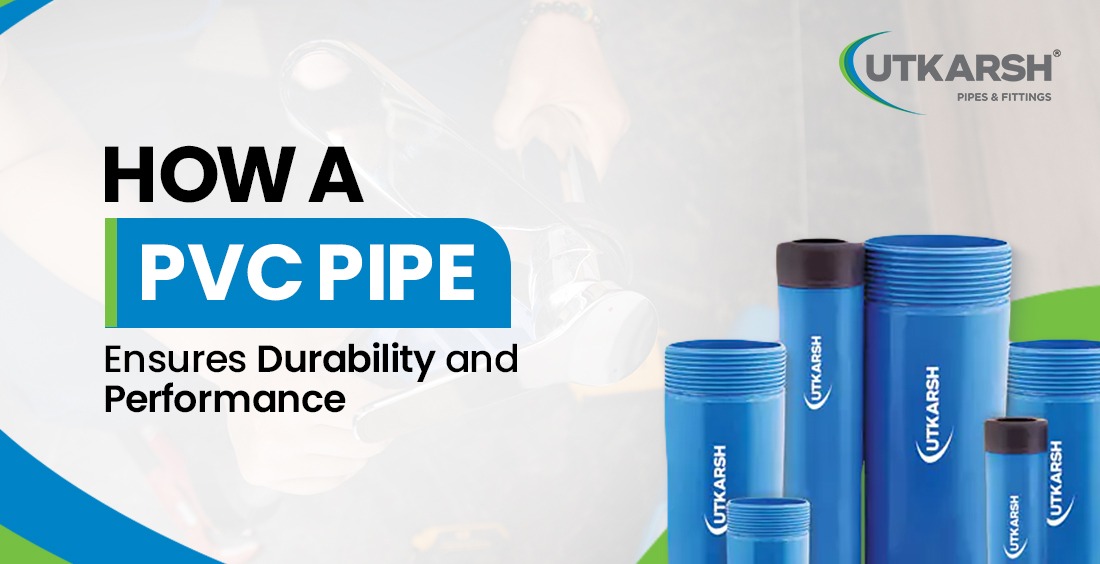
How a PVC Pipe Ensures Durability and Performance
Apr 14, 2025
Have you ever wondered how PVC pipes are able to withstand rot while being buried underneath roads or kept under the kitchen sink? The PVC pipe production process effectively integrates raw materials, mechanical engineering, and quality assurance, which is the reason, unlike many other materials, it does not require maintenance.
Before we dissect how exactly a pipe is designed to endure strong pressure, let’s focus on what makes a PVC pipe robust.
It All Starts with the Right Recipe – The Core of the PVC Pipe Production Process
Durability of products always starts from the blend of raw materials, and in the case of PVC, it begins with resins. The PVC pipe production process starts with routers and ducting polyvinyl chloride resin and combining it with stabilizers, lubricants, and impact modifiers. But why all these additions? Every ingredient in the mix comes with a purpose that maintains the longevity of the pipe, its resistance to sunlight, and how well it withstands pressure.
The outcome would be a malleable pipe capable of withstanding high pressure and expanding strength and flexibility attributes.
Extrusion - the Stage where the Pipe Shape is Formed
The next stage is referred to as extrusion. During the extrusion stage of the PVC pipe production process, the temperature of the mix is increased. This is done by putting it into a high-temperature extruder which melts the blend. The blend is then poured through a die which gives it the shape of a cylindrical pipe.
Temperature and pressure control also contributes to the overall quality of the piping. Proper settings guarantee that the surfaces are even, walls do not crack, thickness is uniform, and smooth surfaces are achieved. The pipe design affects the durability of the pipe in regards to water pressure, soil shift, and general usage.
Cooling and Sizing – Locking in the Strength
The next step in the PVC pipe production process is where things literally cool down. After shaping, pipes are cooled using a vacuum sizing process and water baths to lock in their dimensions and mechanical strength.
Here, the pipes are also aligned precisely to avoid bending or warping. This ensures they stay straight and fit seamlessly into systems, reducing stress on joints and fittings.
Quality Assurance in PVC Pipe Manufacturing – No Compromise
This is where the magic gets verified. Quality assurance in pvc pipe manufacturing isn’t a one-time test but an ongoing process. Each batch of pipes is tested for tensile strength, impact resistance, hydraulic pressure, and UV resistance.
Whether it’s for home plumbing, agricultural irrigation, or industrial pipelines — quality tests make sure the pipe is ready for the job. The pipes that don’t pass? They don’t leave the facility.
Strong quality assurance practices ensure every PVC pipe offers the kind of performance users expect — leak-free, durable, and safe.
Know more: How PVC Pipe Thickness Affects Quality and Durability | Utkarsh India
Smooth Interiors = Better Performance
Another perk of the PVC pipe production process is how it creates ultra-smooth interiors. This smoothness reduces friction and lets water or fluids flow faster with less resistance. That means less energy is needed for pumping, fewer clogs, and better long-term efficiency.
This detail might seem small, but it’s a big reason why PVC pipes outperform alternatives in real-world usage.
Customization for Specific Applications
A great advantage of the modern PVC pipe production process is customization. Pipes can be manufactured in different diameters, pressure ratings, and lengths depending on their use.
Thanks to quality assurance in pvc pipe manufacturing, even customized pipes go through the same strict tests. So, whether it’s a lightweight casing pipe for a borewell or a heavy-duty pipe for municipal drainage, performance is never compromised.
Before we wrap up, here’s a name that gets durability and performance just right — Utkarsh Pipes & Fittings. As a trusted pvc pipe manufacturer, we’ve built a reputation for delivering consistent quality across a wide range of products.
Our uFLO uPVC pipes, cPVC pipes, and PVC Casing pipes are designed with care and go through a precise pvc pipe production process to meet industry standards. Backed by strict quality assurance in pvc pipe manufacturing, our pipes are built for long-term reliability in any condition.
Check this out: The Lifespan of uPVC Pipes: Tips for Long-Lasting Performance
Summary
PVC pipes are more than just plastic tubes — they’re a result of innovation, testing, and careful production. The PVC pipe production process ensures every pipe is crafted for performance, and with tight quality assurance you know you’re getting value for money.
FAQs:
What are the performance characteristics of PVC?
PVC offers high durability, corrosion resistance, chemical resistance, low maintenance, smooth flow, and strong mechanical strength, making it ideal for long-term use.
What is the strength of a PVC pipe?
The strength of PVC pipe typically ranges from 7,000 to 8,000 psi (pounds per square inch) in tensile strength, making it highly durable and resistant to pressure and impact.
Do all PVC pipes go through the same testing process?
In standard practice, yes. Reputable manufacturers include quality assurance in pvc pipe manufacturing across all product lines to ensure consistency and durability regardless of pipe type or size.
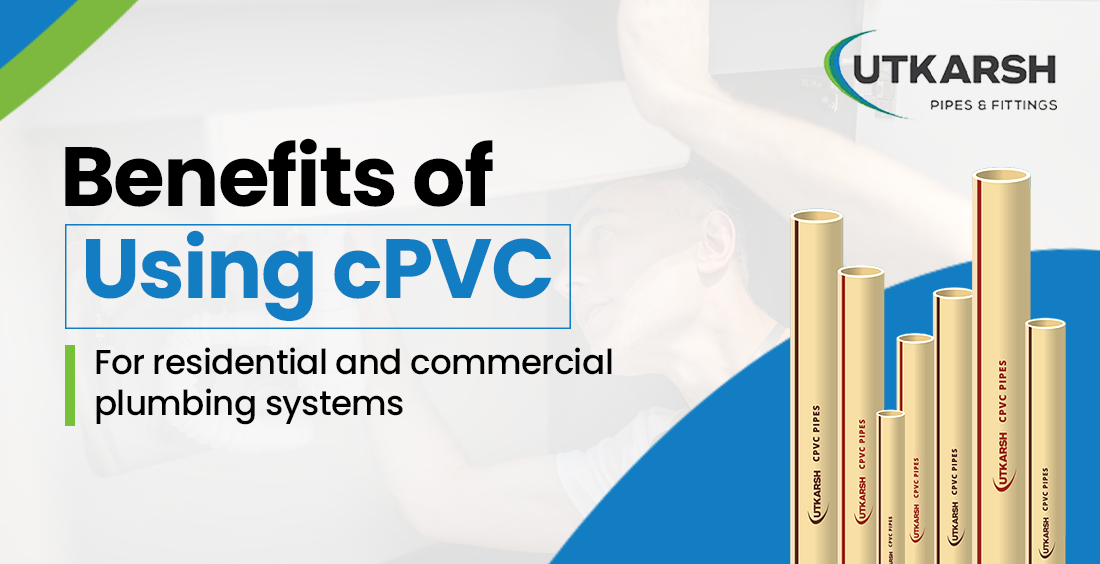
Benefits of Using cPVC for Residential and Commercial Plumbing Systems
Mar 31, 2025
Plumbing might not be the first thing on your mind when building or renovating, but get it wrong, and you’ll definitely notice. Leaky pipes, rusted fittings, and high maintenance costs can turn into an expensive nightmare. That’s why choosing the right material is a game-changer.
Ever wondered what is cPVC used for and why it’s replacing traditional plumbing materials? Whether it’s for a home, office, or industrial setup, cPVC pipes and fittings offer a powerful mix of durability, safety, and cost efficiency. Unlike metal, they don’t rust. Unlike regular PVC, they can handle hot water. And unlike other plastic pipes, they’re fire-resistant.
If you want a plumbing system that lasts, performs well, and requires minimal upkeep, let’s break down why cPVC pipes and fittings are the smart choice for both homes and businesses.
Why Choose cPVC Over Other Plumbing Materials?
Traditional plumbing materials like metal or PVC have been around for years, but cPVC offers a combination of advantages that make it stand out.
Resistant to High Temperatures: Unlike regular PVC, cPVC pipes and fittings can handle hot water flow without warping or degrading.
Corrosion-Free Performance: No rust, no scaling, and no chemical reactions—cPVC remains intact for years.
Long-Term Durability: cPVC lasts longer than traditional metal pipes, making it a cost-effective investment.
Easy Installation & Maintenance: Lightweight, flexible, and easy to work with—perfect for quick plumbing jobs.
Now, let’s dive deeper into the benefits of cPVC for both homes and commercial buildings.
1. cPVC Pipes and Fittings Ensure Clean, Safe Water Supply
One of the biggest concerns in plumbing is water contamination. Metal pipes tend to corrode, leading to rust and possible water contamination. cPVC, however, is non-toxic and doesn’t react with water, ensuring a clean, safe, and hygienic supply for homes and businesses.
For commercial buildings like hotels and hospitals, where water quality is crucial, cPVC pipes and fittings are an excellent choice.
2. Handles Hot and Cold Water Systems with Ease
Many plumbing materials weaken when exposed to hot water over time. But what is cPVC used for? One of its key applications is hot water systems.
cPVC can withstand temperatures up to 93°C (200°F), making it ideal for homes, commercial kitchens, laundromats, and industrial settings that require a reliable hot water supply.
Unlike metal pipes, cPVC doesn’t expand and contract as much with temperature changes, reducing the risk of cracks and leaks.
3. Corrosion and Chemical Resistance for Longevity
Traditional metal pipes are prone to rust, scaling, and chemical reactions that degrade their lifespan. In contrast, cPVC pipes and fittings are completely resistant to:
Rust and corrosion
Chlorine in water
Acidic and alkaline substances
Hard water deposits
This makes them perfect for factories, chemical plants, and water treatment facilities, where exposure to chemicals is common.
4. Lightweight Yet Strong – A Plumber’s Best Friend
Installing heavy metal pipes requires specialized tools, extra labor, and significant installation time. cPVC is lightweight yet incredibly strong, making it easier to handle and install.
For both residential and commercial applications, this means:
Quicker installation
Lower labor costs
Less maintenance required over time
5. Fire Safety Advantages Over Other Plastics
Fire safety is a major concern in any building. Unlike other plastic pipes, cPVC pipes and fittings are inherently fire-resistant. They don’t support combustion and have a self-extinguishing property, meaning they won’t fuel a fire if exposed to flames.
This feature makes cPVC a safer option for residential high-rises, commercial buildings, and industrial facilities.
6. Cost-Effective with Lower Maintenance Needs
With cPVC, you save money in multiple ways:
Lower installation costs due to its lightweight nature
Minimal repairs since it doesn’t corrode or leak easily
Longer lifespan, reducing the need for replacements
For commercial buildings, these savings add up significantly over time, making cPVC one of the most cost-efficient plumbing solutions available.
Utkarsh Pipes and Fittings – A Trusted Name in cPVC Solutions
Before wrapping up, let’s talk about one of the most trusted cPVC pipe manufacturers —Utkarsh Pipes and Fittings. Our cPVC pipes and fittings are designed for durability, efficiency, and cost-effectiveness, making them perfect for residential, commercial, and industrial applications.
What makes our products stand out?
Enhanced durability – Built to last longer than conventional piping solutions
Complete quality assurance – Manufactured to meet IS standards
Sourced from premium raw materials – We use high-quality CPVC resins from Japan
Advanced manufacturing processes – State-of-the-art equipment ensures superior product quality
Global quality benchmarks – Our cPVC pipes adhere to international standards
As a leading CPVC pipe company in India, Utkarsh is committed to providing top-quality plumbing solutions that guarantee long-term performance and reliability.
Conclusion
So, what is cPVC used for? From homes and apartment complexes to commercial kitchens and industrial plants, cPVC pipes and fittings offer unmatched benefits. They’re corrosion-resistant, fire-safe, lightweight, and built to handle both hot and cold water systems efficiently.
If you’re planning a plumbing upgrade or looking for a reliable, long-lasting solution, cPVC is a smart investment. And for the best quality pipes, Utkarsh Pipes and Fittings ensures you get nothing but the best.
FAQs:
Can CPVC be used in commercial buildings?
Yes, CPVC can be used in commercial buildings. Its high heat resistance, corrosion-free properties, and fire safety make it ideal for hotels, hospitals, offices, and industrial facilities. CPVC pipes and fittings handle both hot and cold water efficiently, require minimal maintenance, and offer long-term durability, making them a cost-effective plumbing solution for commercial applications.
What is CPVC piping mainly used for?
CPVC piping is mainly used for hot and cold water distribution in residential, commercial, and industrial plumbing systems. It is also widely used in chemical processing, fire sprinkler systems, and water treatment plants due to its high-temperature resistance, corrosion-free properties, and durability.
Does CPVC have a fire rating?
Yes, cPVC has a fire rating and is naturally fire-resistant. It does not support combustion and will self-extinguish once the flame source is removed, making it a safer choice for plumbing in residential and commercial buildings.
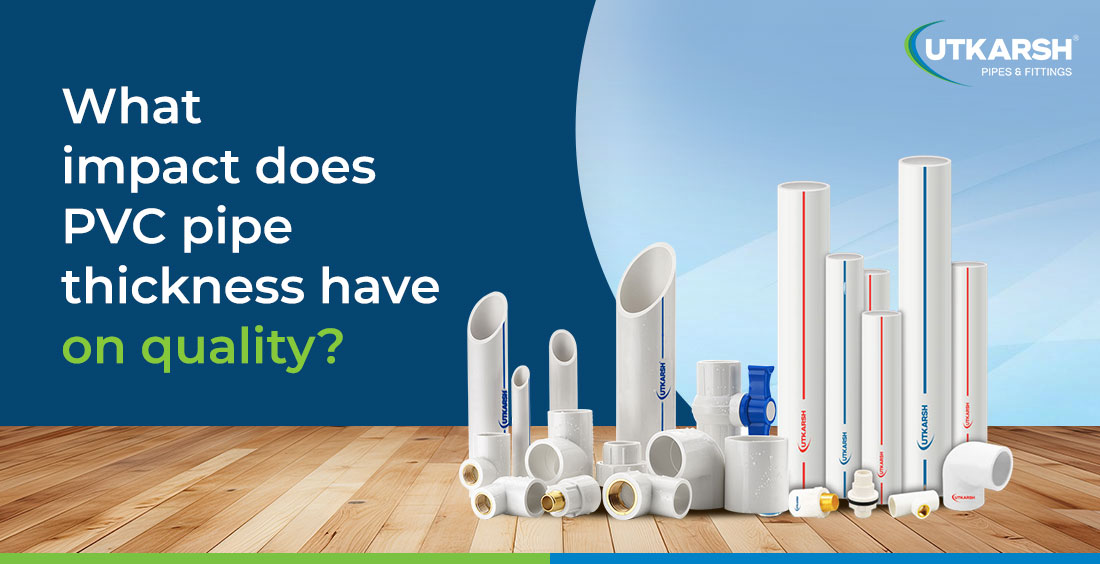
What impact does PVC pipe thickness have on quality?
Mar 31, 2025
The thickness of PVC pipes directly determines their strength, durability, and long-term performance. Whether you need plumbing solutions for your home, irrigation systems for your farm, or reliable piping for industrial applications, choosing the correct pipe thickness saves you from costly repairs, leakages, and early replacements down the line. In this post, we'll explore exactly why thickness matters and how you can confidently identify the right PVC pipes.
Why Does Pipe Thickness Matter?
1. Strength and Durability
Thicker PVC pipes handle higher pressure - this makes them ideal for applications where strong water flow or external force is involved. In irrigation, for example, pipes must endure constant water pressure, fluctuating temperatures, and occasional mechanical stress from vehicles or animals. A thicker pipe resists these forces better and lasts longer.
2. Resistance to External Pressure
In underground applications, soil movement, heavy loads, and moisture exposure put pipes under stress. Thin-walled pipes may crack under such conditions - which can lead to leaks and costly repairs. Opting for thicker pipes ensures resistance to these external pressures.
3. Longevity and Reduced Maintenance Costs
Thicker pipes have a longer lifespan since they resist wear and tear better than their thinner counterparts. Opting for pipes with higher thickness means fewer chances of cracks, leaks, and breakages, thereby reducing maintenance costs in the long run.
4. Temperature Resistance
Indian summers can be harsh, with temperatures soaring above 45°C in many regions. Thin PVC pipes tend to warp or become brittle under extreme heat. Thicker pipes withstand temperature variations better.
5. Higher Pressure Rating
A pipe with higher thickness can handle greater pressure. It is suitable for applications such as borewell connections, municipal water supply, and industrial use.
How to Choose the Right PVC Pipe Thickness
Choosing the appropriate PVC pipe thickness is crucial for ensuring performance, safety, and longevity. The right thickness depends largely on the application. Here's a quick guide to help you decide:
Household Plumbing: Medium-thickness pipes are generally sufficient for everyday water supply and drainage.
Industrial or High-Pressure Systems: Use pipes with greater wall thickness to withstand higher pressure and stress.
Underground Installations: Opt for extra-thick pipes to resist soil pressure and external impact.
Irrigation Systems: Pressure-rated pipes are ideal for maintaining a consistent water flow over long distances.
Common Myths About PVC Pipe Thickness
1. Thicker Pipes Are Always Better
While thickness improves durability, choosing an unnecessarily thick pipe for a low-pressure system wastes money. Assess your needs before selecting.
2. Thin Pipes Are Just as Strong
Not true. Thin pipes may work for short-term applications but fail under stress.
3. All PVC Pipes Are the Same
Pipes differ in quality, material composition, and thickness. High-quality pipes following BIS (Bureau of Indian Standards) regulations ensure consistent performance.
At Utkarsh India, we are committed to delivering excellence in PVC piping solutions. As one of the trustworthy PVC pipe manufacturers and PVC fittings manufacturers, our products offer reliability and long-term performance across various applications. Our manufacturing facilities adhere strictly to Indian and international quality benchmarks, including ISO, EN, BIS, BS, and DIN. With a strong Pan-India distribution network supported by more than 10,000 trusted channel partners, we have established our presence not only nationally but also globally—exporting our superior-quality products to over 35 countries worldwide.
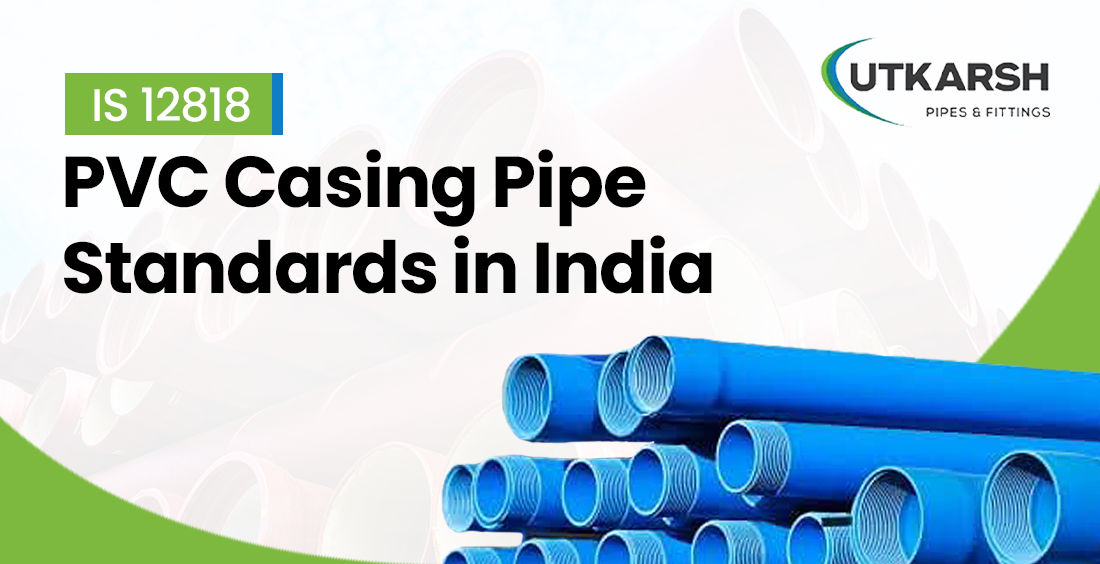
IS 12818: PVC Casing Pipe Standards in India
Mar 31, 2025
Borewells and deep-soil water reserve extraction require casing pipes made from PVC owing to their effectiveness in purpose. Pipes should have adequate strength and high withstand capabilities as risk of collapse can occur from rough conditions. Like many other products, the Council of India maintains standards for these goods and has set IS 12818 which specifies the criteria for PVC casing pipes pertaining to borehole operations and others like it.
Whether you are dealing with borewell piping systems or planning to install a borewell, knowing IS 12818 will be of paramount importance. This document contains all the specifics related to these standards like their relevance in the civil construction business, the operational success, tangible value in the market, and the cost of PVC casing pipes.
IS 12818 Standards for PVC Casing Pipes
The IS 12818 standard sets the technical guidelines for the design of PVC casing pipes with regard to their performance and safety. Meeting these standards helps boost the structural strength of the pipe, lower the risk of failure, and boosts its versatility for different uses.
1. Categories of PVC Casing Pipes as per IS 12818
The Bureau of Indian Standards (BIS), also subdivided PVC casing pipes into smaller sections to aid with the classification of wider pipes.
CS (Casing Shallow): Used to bore shallow wells where soil pressure is minimal.
CM (Casing Medium): Intended for use where soil pressure is moderate and additional support within the pipe is required.
CD (Casing Deep): Used for deep boreholes where the soil pressure and physical conditions surrounding the pipe are extreme.
SC (Screen Casing): Comes with perforations to filter sand and other particles, ideal for wells with loose soil.
Understanding these categories helps in choosing the right pipe based on soil conditions and borewell depth.
2. Material and Durability Requirements
PVC casing pipes have to observe a very strict set of guidelines when it comes to material compliance set by the IS 12818 ruling. The following criteria need to be checked:
High Quality Virgin PVC - It's critical to employ an unplasticized polyvinyl chloride (UPVC) to endure the strength requirement of the pipes.
Chemical resistance – The pipes should not erode and is resistant to the compounds found in groundwater and hence pipes must noncorrosive.
Impact strength – The material should possess sufficient strength to withstand external forces and underground pressure.
UV protection – For pipes which are placed above the ground, additional protection from ultraviolet sunlight should be used.
Meeting these guidelines set by the ruling ensures a free maintenance and extended life for the borewell system.
Also know the Factors Affecting the Lifespan of PVC Casing Pipes
3. Threading and Jointing Specifications
Proper connection and installation of PVC casing pipes are crucial to prevent leaks and maintain water quality. IS 12818 specifies:
Threaded Joints: Pipes must have high-precision threads for secure fitting.
Leak-Proof Sealing: The joints should prevent contamination and water leakage.
Easy Installation: Pipes should be lightweight and easy to handle without requiring heavy equipment.
4. PVC Casing Pipe Price and Factors Affecting Cost
The PVC casing pipe price varies based on several factors:
Pipe Category: Deep casing pipes (CD) cost more than shallow casing pipes (CS) due to added strength.
Diameter and Thickness: Larger diameters and thicker pipes increase the price.
Brand and Quality: Well-known PVC casing pipe manufacturers may charge a premium for superior quality and certification compliance.
Market Demand and Supply: Seasonal demand and raw material costs influence pricing.
Before purchasing, compare prices from multiple suppliers and ensure the pipes meet IS 12818 standards for the best value.
Why Choosing the Right PVC Casing Pipe Matters
Selecting the right PVC casing pipe impacts the efficiency and lifespan of your borewell system. Here’s why it’s important:
Prevents Borewell Collapse: Pipes with proper thickness and strength can withstand soil pressure.
Enhances Water Flow: High-quality materials reduce friction loss and improve water extraction efficiency.
Minimizes Contamination: Properly sealed pipes prevent chemicals and debris from entering the water source.
Cost-Effective: Investing in IS 12818-compliant pipes reduces the need for frequent replacements.
Check this out: 15 Benefits of Using Casing Pipes in Borewell Installation
Utkarsh Pipes and Fittings – Reliable PVC Casing Pipe Manufacturers
At Utkarsh Pipes and Fittings, we provide PVC casing pipes that meet and exceed IS 12818 standards. Whether you need pipes for borewells or areas with loose and sandy soil, our products offer exceptional durability and performance.
Best-fit for borewells – Our pipes ensure stability in highly collapsible soil.
High strength & reliability – Made from premium-grade UPVC, they offer unmatched durability.
Versatile applications – Suitable for deep and shallow borewells, agricultural needs, and industrial setups.
Trusted by industries – Our casing pipes are widely used in residential, commercial, and municipal water projects.
When you need PVC casing pipe manufacturers that prioritize quality, reliability, and performance, Utkarsh Pipes and Fittings is the name to trust.
Conclusion
Choosing PVC casing pipes that adhere to IS 12818 standards is crucial for borewell efficiency and long-term performance. Understanding the categories, material specifications, and pricing factors ensures you make an informed decision. Always buy from trusted PVC casing pipe manufacturers like Utkarsh Pipes and Fittings to guarantee quality and durability.
FAQs:
Is ISI mark mandatory for PVC pipes?
Yes, an ISI mark is mandatory for PVC pipes used in critical applications like borewells, drinking water supply, and plumbing, as it ensures compliance with BIS standards for quality and safety.
What are the standard sizes of casing pipe?
The standard sizes of casing pipes as per IS 12818 range from 100 mm (4 inches) to 400 mm (16 inches) in diameter, with varying wall thicknesses depending on the category (CS, CM, CD, SC).
How to size a casing pipe?
To size a casing pipe, consider the borewell diameter, depth, and soil conditions. The casing pipe should be at least 1-2 inches larger than the pump diameter to allow proper water flow. Choose the pipe thickness based on soil pressure—CS for shallow, CM for medium, and CD for deep borewells as per IS 12818 standards.
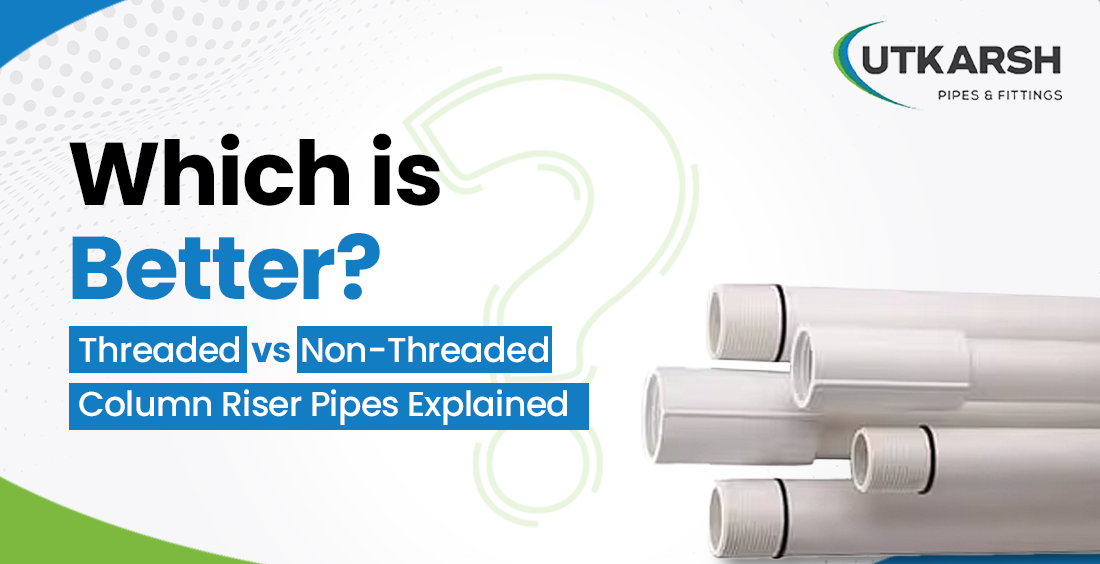
Which is Better? Threaded vs. Non-Threaded Column Riser Pipes Explained
Mar 31, 2025
Water does not magically appear at your tap. It requires an entire system to transport water from deep underground to your home, farm or factory. The foundation of this system are Column Riser Pipes, the feel that is often neglected to mention, which carry water through Borewells to the surface using pumps. But there’s a big question that many face while pondering this concept: Should you go with Threaded Column Riser Pipes or go with non threaded options?
This is not simply a choice of procedure, it relates to how smooth your water flow will be, how much repairs you will be needing, and your overall expenditure of maintenance. Your selection doesn’t need to be too complicated either, as the type of riser pipe you choose can help save you from a lot headaches down the line, from simple water usage to powering an entire agricultural field.
Let’s break down both options and help you figure out which one’s the right fit for you!
What Are Column Riser Pipes?
Moving on from our main subject of discussion, Column Riser Pipes are relatively simple to define. These pipes connect a submersible pump in a borewell to ground level to ensure water flows through the pipe without restrictions. They possess the capability to bear the weight of the pump as well as handle the pressure of water within while also going through processes of limitless corrosion over time.
Modern systems use uPVC Column Pipes because of their strength, lack of corrosion, and low weight. The larger issue is deciding between threaded or non-threaded riser pipes. Let's examine the differences.
Threaded Column Riser Pipes: Pros & Cons
What Are Threaded Column Riser Pipes?
Threaded pipes come with screw-like ends. They are manually tightened and locked into place. The threads create a secure joint, holding each pipe segment together tightly.
Benefits of Threaded Column Riser Pipes
Strong, Secure Connection: The threaded design ensures a firm connection, reducing the chances of disconnection, especially under high pressure or vibration from the pump.
Easy to Install & Replace: Threaded pipes are simple to assemble. You don’t need special adhesives—just screw the joints tight.
Leak-Resistant: Proper threading, especially in high-quality uPVC Column Pipes, minimizes leakage risk. Additionally, sealing tapes or rings can further enhance tightness.
Perfect for Deep Borewells: Since deep borewells require strong connections, threaded Column Riser Pipes can handle greater depths and pressures without loosening.
Drawbacks of Threaded Column Riser Pipes
Thread Wear Over Time: Repeated dismantling and assembling may wear out the threads.
Alignment Issues: Incorrect tightening might misalign the pipes, leading to inefficiencies.
Non-Threaded Column Riser Pipes: Pros & Cons
What Are Non-Threaded Column Riser Pipes?
Non-threaded pipes use push-fit, clamp, or other joint mechanisms instead of screw threads. They rely on seals, rings, or clamps to stay connected.
Benefits of Non-Threaded Column Riser Pipes
Quick Assembly: These pipes offer a faster installation process—just push and lock, no threading required.
Less Risk of Thread Damage: Since there are no threads, there’s no worry about thread wear or alignment issues.
Cost-Effective for Shorter Runs: If you're working with shallow borewells or lower depths, non-threaded riser pipes are budget-friendly and efficient.
Smooth Flow: Fewer threads can sometimes mean slightly smoother water flow without minor obstructions caused by misaligned threads.
Drawbacks of Non-Threaded Column Riser Pipes
Less Secure for Deep Installations:
Non-threaded joints may not handle deep borewell pressures as well as threaded ones.More Dependent on Seal Quality:
The performance largely depends on how good the seals and rings are.
Threaded vs. Non-Threaded: How to Choose?
Here are actionable tips to help you decide:
1. Check Borewell Depth
Shallow Borewell (Up to 200 feet): Non-threaded uPVC Column Pipes work fine for lower depths where water pressure isn't extremely high.
Deep Borewell (200+ feet): Threaded Column Riser Pipes are a safer bet for high-pressure, high-load scenarios.
2. Consider Maintenance Requirements
If frequent dismantling and reinstalling is necessary (say, for pump maintenance), Non-Threaded Riser Pipes might save time.
But if you need a long-term, stable solution with minimal future adjustments, go for Threaded Column Riser Pipes.
3. Budget & Application Type
For Residential Use: Both types are viable. Non-threaded pipes are slightly cheaper upfront.
For Agricultural or Industrial Use: Threaded uPVC Column Pipes provide better durability and can handle greater usage demands.
4. Look for Quality Seals and Rings
Regardless of which type you choose, always check if the pipes come with industrial-grade rubber sealing rings. These rings absorb pump vibrations, reduce leakage, and extend the pipe’s lifespan—especially crucial for non-threaded systems.
Why Quality Matters: Utkarsh Pipes & Fittings
Choosing between threaded and non-threaded is important, but even more critical is who you’re buying from. Low-quality riser pipes—regardless of type—can lead to leaks, pump damage, and costly repairs.
This is where Utkarsh Pipes and Fittings steps in as a trusted name. As one of India’s leading manufacturers and suppliers of Column Riser Pipes, we offer a complete range tailored to various needs.
Made from superior uPVC compounds, Utkarsh’s uPVC Column Pipes feature heavy-duty sealing rings crafted from certified industrial-grade rubber. These rings effectively absorb pump vibrations, create leak-proof joints, and boost the longevity of each riser pipe.
Each pipe is manufactured using top-quality materials sourced from reputed industry leaders, ensuring that they meet—and exceed—industry standards. Whether you’re dealing with residential, agricultural, or industrial applications, Utkarsh pipes and fittings ensures smooth and superior performance every time.
Know more: 6 Things to Know About CPVC Pipes and Fittings by Utkarsh Pipes
Final Thoughts: Which Riser Pipe Is Better?
There’s no one-size-fits-all answer. Your choice boils down to:
Depth of installation
Budget
Ease of maintenance
Long-term durability
If you want the extra security and strength for deeper borewells or heavy-duty use, threaded Column Riser Pipes are your best bet. If you prefer quick installation and lower costs, non-threaded might be right.
Whichever you choose, always prioritize quality materials like those from Utkarsh Pipes & Fittings to ensure leak-proof, vibration-absorbing, and long-lasting performance.
FAQs:
What is the purpose of a pipe riser?
A pipe riser is a vertical pipe that carries fluids, usually water, from lower levels to higher levels, ensuring smooth and efficient flow.
What is the difference between a pipe and a riser?
A pipe is a general term for any hollow cylinder used to transport fluids like water, gas, or oil. It can run horizontally, vertically, or underground.
A riser, on the other hand, specifically refers to a vertical pipe that carries fluids upward, typically from a lower level to a higher level—like from a borewell to the surface. So, while all risers are pipes, not all pipes are risers.
Can riser pipes be used for industrial applications?
Yes, riser pipes are used in a variety of industries, including agriculture, municipal water supply, mining, and construction, wherever there’s a need to transport water vertically or under pressure.
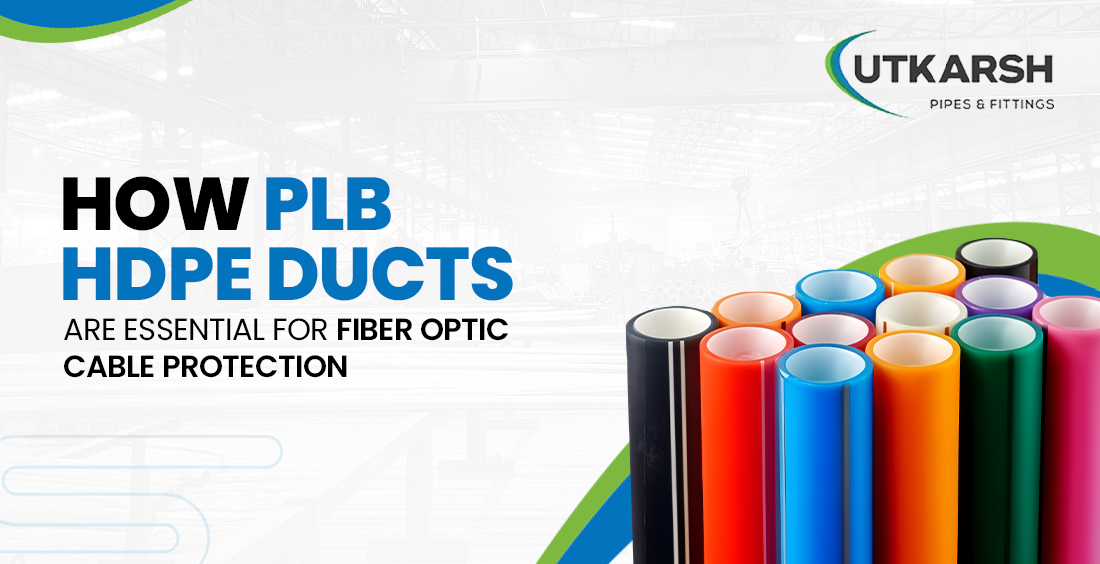
How PLB HDPE Ducts are essential for fiber optic cable protection
Mar 28, 2025
Staying connected in today’s world greatly depends on the strength and stability of the network in existence today. Fiber optic cables carry everything from online transactions to video calls. But these delicate cables are very likely to be damaged physically, damaged by stress factors, or even wear down over time. The same goes for these cables. That is why a fiber optic cable protection tube comes in as an unsung hero, shielding these critical lines from damage and ensuring they work without failures. PLB HDPE ducts stand out among other competing products because they provide unparalleled protection along with flexibility and longevity.
Are you curious about how these ducts make an impact? Allow us to explain.
What Are PLB HDPE Ducts?
PLB means permanently lubricated, while HDPE means High Density Polyethylene.. A PLB HDPE duct is a composite pipe that is used for the transmission of fiber optic and copper cable,s providing enhanced protection because of a dual-layer construction. Because of their durability and long service life, these ducts are popular.
The inner layer of these ducts is coated with a permanent lubricant, usually silicone-based, reducing friction and making it easier to install cables over long distances. The outer layer is made from virgin, UV-resistant HDPE material, maximizing resistance to mechanical damage, sunlight, chemicals, and environmental stress.
Check this out: PLB HDPE Duct – Best for Telecom & Power Cabling | Utkarsh Pipes & Fittings
Why PLB HDPE Ducts Are the Bodyguards of Fiber Optic Cables
1. Superior Mechanical Protection
Fiber optic cables are extremely delicate when it comes to any form of mechanical impact. Rocks, soil movement, road construction, or heavy vehicles traveling over them can be catastrophic. The thick, robust outer ply of PLB HDPE ducts shields the cable from direct contact with all forms of external force and protects against crushing, kinking, or stretching of fiber optic cables.
Pro tip: Always go for high-grade fiber optic cable protection tubes made of virgin HDPE for uncompromised strength.
2. UV and Weather Resistance
If the fiber optic cables are exposed to direct sunlight or extreme weather, they deteriorate over time. UV rays can break down plastic materials, leading to cracks or leaks. The outer HDPE layer in PLB HDPE ducts is UV-stabilized, making them perfect for outdoor, aerial, or open-field installations.
Actionable Tip: Choose a PLB duct pipe manufacturer that guarantees UV-grade material usage to extend the life of your ducts.
3. Ease of Cable Installation
Cable installation becomes challenging over long stretches, especially if friction is high. The inner silicon-lubricated layer of a fiber optic cable protection tube significantly reduces the internal coefficient of friction (ICF), allowing cables to glide smoothly without risking bends or breaks.
This translates to lower labor costs, faster installation, and less strain on the cables themselves.
4. Chemical & Corrosion Resistance
Soil environments and industrial zones may contain chemicals or corrosive elements. HDPE is known for its chemical inertness, meaning it won’t react with acids, alkalis, or other harmful substances.
Solution: Always check with your PLB duct pipe manufacturer about the chemical resistance properties of their product before purchasing.
5. Flexibility and Lightweight
Fiber optic routes are rarely straight—they require bends, turns, and adjustments based on the geography. PLB HDPE ducts offer excellent flexibility without compromising strength. Their lightweight nature also simplifies transport, handling, and installation.
Quick Tip: Confirm the flexibility rating and bending radius specification from your PLB HDPE ducts manufacturer to ensure compatibility with your project.
Smart Buyer’s Checklist: What to Keep in Mind Before Picking PLB HDPE Ducts
To get the best performance, you need to factor in a few critical points:
Diameter & Length: Larger diameters support easier pulling of multiple cables.
ICF Value: A lower internal coefficient of friction value makes installation smoother.
Compliance Standards: Ensure the ducts meet global & TEC standards.
PLB HDPE Ducts Price: Prices can vary based on features, thickness, and customizations. Compare options from trusted suppliers.
Do you know What are the environmental benefits of using HDPE pipes? Click here to know more.
Why Utkarsh Pipes and Fittings Should Be Your First Choice – Quality & Affordability at the Same Place
Selecting the right PLB HDPE ducts manufacturer is crucial for long-term cable protection. Utkarsh Pipes and Fittings is India’s leading name in this space, known for delivering top-grade engineering products.
At Utkarsh, we manufacture premium PLB HDPE ducts using virgin, UV-grade HDPE materials. Our ducts consist of two concentric layers:
The outer HDPE layer delivers superior mechanical, UV, and chemical resistance.
The inner silicon-lubricated layer minimizes friction, ensuring effortless cable insertion.
Our products strictly adhere to global and TEC standards, ensuring durability and performance across fiber optic and copper cable deployments. Whether you're handling large-scale telecom projects or local network setups, Utkarsh offers the best solutions.
Moreover, we understand the importance of cost-effectiveness. The PLB HDPE ducts price at Utkarsh is competitive, balancing premium quality with value for money. We encourage comparing prices, diameters, and features so you can confidently choose the best-fit product.
The Bottom Line
Investing in a high-quality fiber optic cable protection tube is non-negotiable if you want long-lasting, uninterrupted cable performance. PLB HDPE ducts provide unmatched protection against mechanical, environmental, and chemical stressors.
Choosing a reliable PLB HDPE ducts manufacturer like Utkarsh Pipes and Fittings ensures that your network infrastructure is built on a solid foundation. Alongside superior quality, we offer competitive PLB HDPE ducts price options so you never compromise on protection or budget.
Looking to strengthen your fiber optic cable protection? Reach out to Utkarsh Pipes and Fittings today and get the best value PLB HDPE ducts tailored to your project needs.
FAQs:
What is the best way to protect fiber optic cable?
The best way to protect fiber optic cable is by using PLB HDPE ducts or a fiber optic cable protection tube, which shield the cables from physical damage, environmental factors, and ensure smooth, long-lasting performance.
What can damage fiber optic cable?
Fiber optic cables can be damaged by physical impact, excessive bending, moisture intrusion, rodent attacks, UV exposure, and chemical corrosion.
Does fiber optic need surge protection?
Yes, fiber optic cables themselves don’t conduct electricity and typically don’t need surge protection. However, the connected electronic equipment like transceivers, network switches, and media converters can be vulnerable to power surges, so surge protection is recommended for those components.
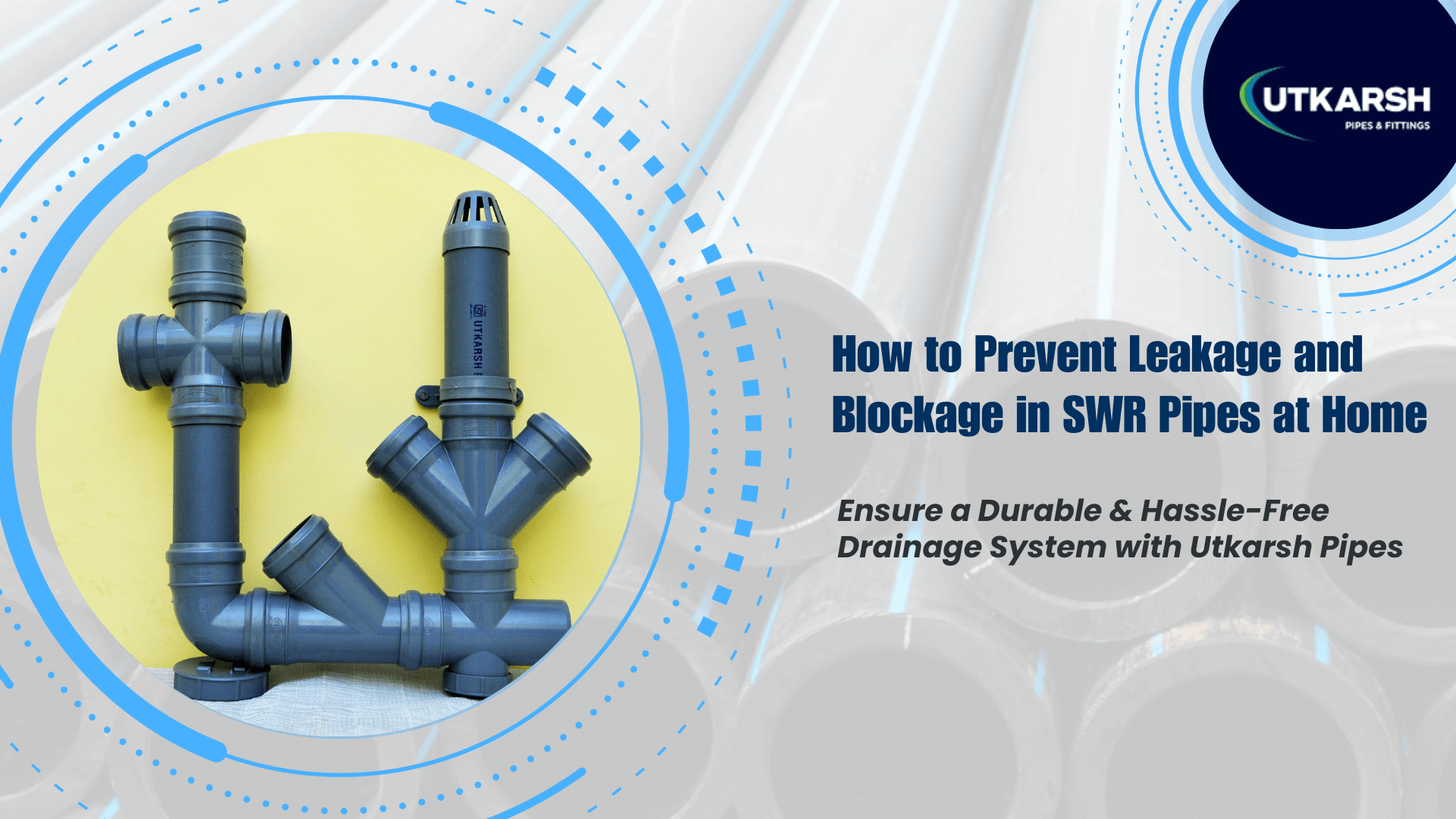
How to Prevent Leaks and Blockages in SWR Pipes at Home: A Comprehensive Guide
Mar 27, 2025
SWR (Soil, Waste, and Rain) pipes are essential for an efficient drainage system in residential and commercial buildings. Proper installation and maintenance of SWR pipe fittings ensure a leak-free and clog-free drainage system, reducing the chances of expensive repairs. In this blog, we will explore effective ways to prevent leakage and blockage in SWR pipes and highlight premium-quality solutions from Utkarsh Pipes, one of the leading SWR pipe manufacturers in India.
Common Causes of Leakage and Blockage in SWR Pipes
Before discussing the solutions, it is crucial to understand the primary reasons behind leakage and blockage in SWR pipes:
- 1. Poor Installation – Incorrectly joined SWR pipe fittings may lead to water leakage.
- 2. Clogging Due to Debris – Accumulation of hair, grease, and solid waste can block the pipe.
- 3. Low-Quality Pipes – Substandard SWR pipes are more prone to cracks and leaks.
- 4. Tree Root Intrusion – In outdoor drainage, tree roots can infiltrate and damage pipes.
- 5. Temperature Fluctuations – Extreme weather conditions can cause pipe expansion and contraction, leading to leaks.
Tips to Prevent Leakage in SWR Pipes
1. Choose High-Quality SWR Pipe Fittings
Investing in high-quality SWR pipes and fittings from reputed SWR pipe manufacturers in India, like Utkarsh Pipes, ensures durability and resistance to leakage. Their pipes are made from top-grade PVC material, offering long-term performance.
2. Ensure Proper Pipe Installation
Hiring experienced professionals for pipe installation is crucial. Here’s how you can prevent leaks during installation:
- Use the correct solvent cement for joining pipes.
- Avoid misalignment and ensure proper sloping for smooth water flow.
- Inspect and tighten joints to prevent gaps.
3. Regular Inspection and Maintenance
Performing routine checks on SWR pipes can help identify leaks early. Look for:
- Visible cracks or water stains near the joints.
- Unpleasant odors indicating minor leaks.
- Any moisture accumulation around pipe areas.
4. Use Leak-Proof Fittings
Opt for leak-proof and UV-resistant SWR pipe fittings from Utkarsh Pipes, which are designed to withstand external pressure and prevent leakage in different weather conditions.
Tips to Prevent Blockage in SWR Pipes
1. Install Drain Filters
Drain filters help prevent solid debris, hair, and grease from entering the pipes. Regularly clean the filters to ensure smooth drainage.
2. Avoid Disposing of Non-Biodegradable Waste
Do not flush items like sanitary napkins, plastic, or heavy grease into the drainage system, as they can cause blockages over time.
3. Conduct Periodic Cleaning
Use warm water and mild drain cleaners to flush out minor buildups inside SWR pipes. Avoid harsh chemicals that may damage the pipe material.
4. Ensure Proper Ventilation
A well-ventilated SWR system prevents airlocks, which can lead to slow drainage and eventual blockage. Properly positioned vent pipes help maintain an efficient drainage flow.
5. Seek Professional Help for Stubborn Clogs
If you notice slow drainage or complete blockage, seek professional plumbing services for thorough cleaning using pressure jetting or drain snaking.
Why Choose Utkarsh Pipes for SWR Pipe Fittings?
Utkarsh Pipes is a leading SWR pipe manufacturer in India, offering premium-quality, durable, and leak-proof drainage solutions. Here’s why their products stand out:
- High-Grade PVC Material: Resistant to corrosion, weather changes, and external pressure.
- Leak-Proof and Easy-to-Install Fittings: Ensures secure connections with no leakage.
- Eco-Friendly and Cost-Effective: Long-lasting pipes with minimal maintenance costs.
- ISI-Certified Products: Ensuring superior quality and compliance with industry standards.
Conclusion
Preventing leakage and blockage in SWR pipe fittings is essential for maintaining an efficient and hassle-free drainage system. By choosing high-quality SWR pipes from trusted SWR pipe manufacturers in India, like Utkarsh Pipes, and following proper installation and maintenance practices, you can ensure a long-lasting plumbing system in your home. Invest in the best-quality pipes today for a smooth and leak-free drainage experience!
For reliable SWR pipe solutions, explore Utkarsh Pipes' products and make a smart choice for your home.
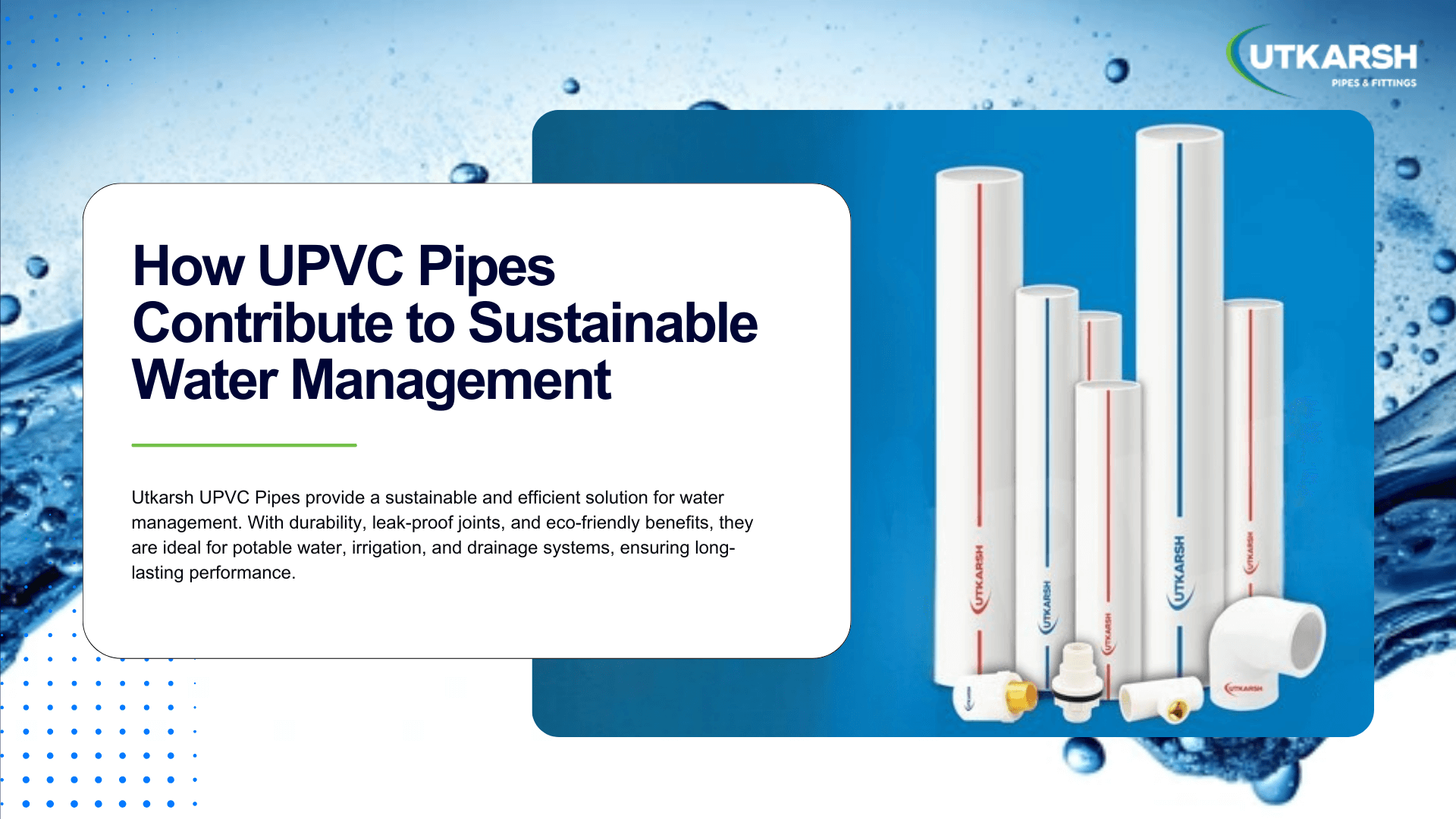
How UPVC Pipes Contribute to Sustainable Water Management
Mar 21, 2025
Water is one of the most precious resources on Earth, and its sustainable management is critical for future generations. As the global population grows, the demand for efficient and eco-friendly water distribution systems is increasing. One of the most effective solutions in this regard is the use of UPVC pipes. These pipes have revolutionized the water management industry with their durability, cost-effectiveness, and environmental benefits.
Understanding UPVC Pipes and Their Role in Water Management
Unplasticized polyvinyl chloride (UPVC) pipes are a superior alternative to traditional piping materials like metal and concrete. Unlike standard PVC pipes, UPVC pipes do not contain plasticizers, making them stronger and more resilient. Their excellent chemical resistance and non-toxic nature make them ideal for transporting potable water, irrigation, and drainage systems.
Key Benefits of UPVC Pipes for Sustainable Water Management
1. Long Lifespan and Durability
One of the biggest advantages of UPVC pipe usage is its long lifespan. These pipes are resistant to corrosion, rust, and chemical degradation, making them ideal for long-term water management solutions.
Compared to metal pipes, which may corrode over time, UPVC pipes can last up to 50 years with minimal maintenance.
2. Eco-Friendly and Energy-Efficient
UPVC pipes contribute to sustainability by reducing the carbon footprint associated with water transportation. Their lightweight nature requires less energy for manufacturing, transportation, and installation. Additionally, UPVC pipes are recyclable, further minimizing their environmental impact.
3. Leak-Proof and Efficient Water Distribution
Water leakage is a major concern in traditional piping systems. UPVC pipes have excellent joint integrity, reducing water loss and ensuring efficient water distribution. This is particularly important in urban and rural water supply networks, where leakage leads to significant wastage.
4. Non-Toxic and Safe for Drinking Water
Ensuring water quality is a top priority in any water management system. UPVC pipes are non-toxic, do not leach harmful chemicals, and do not promote bacterial growth. This makes them perfect for transporting drinking water safely.
5. Cost-Effective Installation and Maintenance
Compared to other materials, UPVC pipe usage offers significant cost savings. Their lightweight structure makes them easy to transport and install, reducing labor and equipment costs. Additionally, their low maintenance requirements mean fewer expenses over time.
UPVC Pipes in Different Water Management Applications
1. Potable Water Supply
UPVC pipes are widely used in municipal and residential water supply systems. Their ability to maintain water quality and withstand high pressure makes them a reliable choice for delivering clean drinking water.
2. Irrigation Systems
Agricultural irrigation relies heavily on efficient water distribution, and UPVC pipes are a preferred solution. Their smooth interior prevents clogging, ensuring a steady water flow for crops and plantations.
3. Drainage and Sewage Systems
Proper wastewater management is crucial for sustainability. UPVC pipes are resistant to chemical reactions, making them ideal for sewage and drainage systems. Their durability ensures long-term efficiency in managing wastewater.
4. Industrial Water Management
Industries require robust piping systems for water transportation and chemical processing. UPVC pipes, with their corrosion-resistant properties, are a preferred choice in industrial applications.
Why Choose Utkarsh UPVC Pipes?
Utkarsh Pipes' uFLO UPVC Pipes & Fittings offer several advantages, making them an ideal choice for sustainable water management solutions:
- Low Thermal Conductivity: With low thermal conductivity, Utkarsh uFLO pipes reduce heat loss, making them energy-efficient and suitable for cold water transportation.
- Solvent Weld Joining: The pipes are joined using solvent weld technology, providing a strong, durable bond for secure and long-lasting installations.
- Lead-Free & Non-Toxic: Utkarsh uFLO uPVC pipes are 100% lead-free, non-toxic, and ensure no odour or taste contamination, making them ideal for safe drinking water applications.
- UV & Weather Resistant: These pipes are resistant to UV rays and extreme weather conditions, ensuring long-lasting durability even in harsh outdoor environments.
- Chemical & Corrosion Resistant: Designed to withstand exposure to various chemicals, Utkarsh uFLO pipes offer superior resistance to corrosion, ensuring smooth water flow without degradation.
- Leak-Proof Joints: Featuring leak-proof joints, these pipes offer secure and reliable water transportation, minimising the risk of water wastage.
- High Pressure Resistance: These uPVC pipes are pressure-resistant, ensuring reliable performance even in high-pressure domestic water supply systems.
Conclusion
Sustainable water management is essential for conserving resources and ensuring long-term environmental health. UPVC pipes play a crucial role in achieving this goal by offering durability, energy efficiency, and eco-friendly benefits. Whether for potable water supply, irrigation, or drainage systems, UPVC pipe usage is an excellent choice for modern water infrastructure.
By choosing Utkarsh Pipes, you invest in high-quality, sustainable piping solutions that contribute to a greener future.
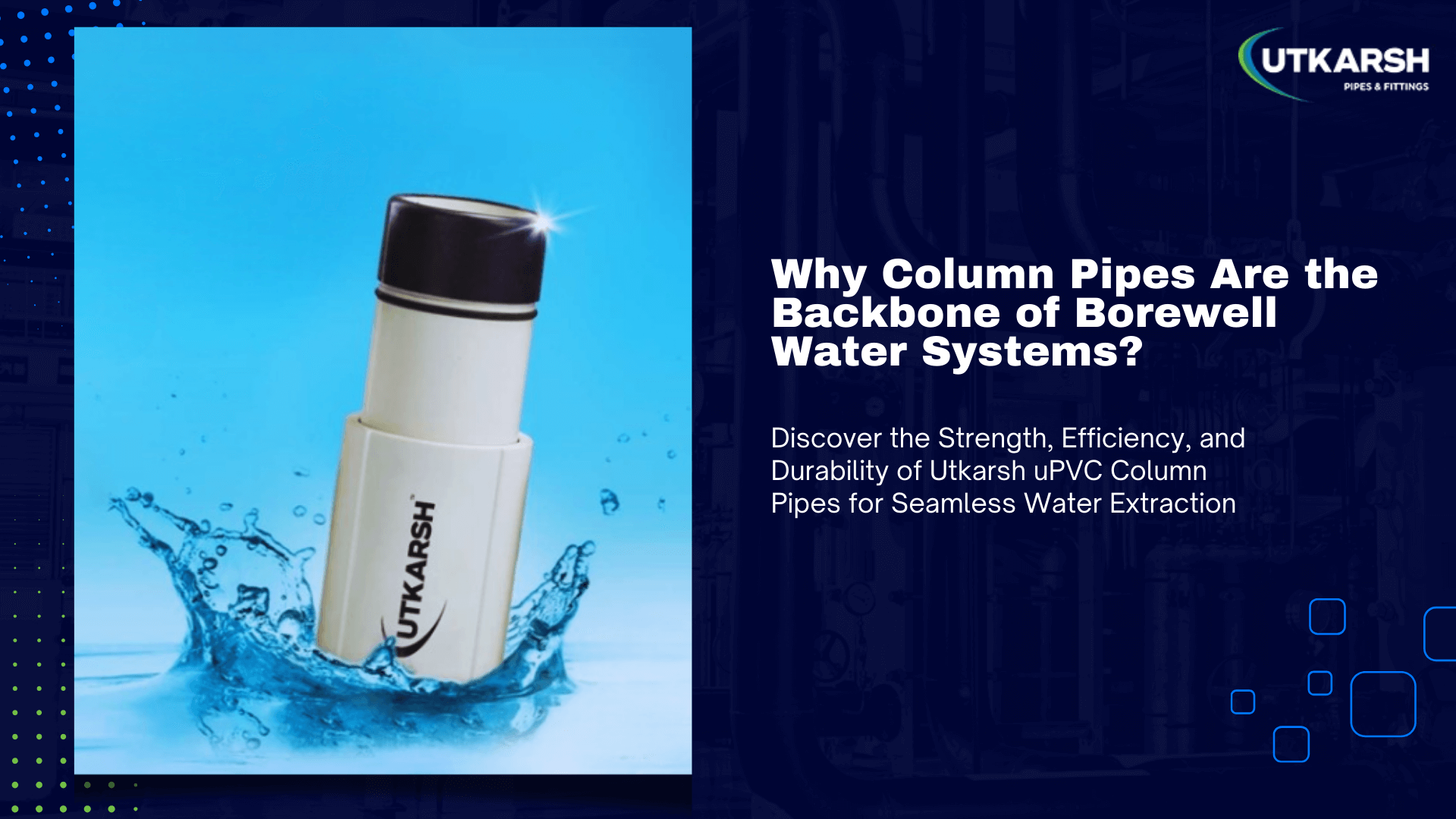
Why Column Pipes Are the Backbone of Borewell Water Systems?
Mar 21, 2025
Water is an indispensable resource, and efficient extraction systems are paramount for sustainable access to groundwater. Borewells have emerged as vital solutions, catering to the water needs of agriculture, industries, and households. Central to the efficacy of these systems are borewell column pipes, which ensure the seamless flow of water from deep underground to the surface. Their significance in borewell functionality cannot be overstated.
Understanding Column Pipes and Their Role in Borewells
Borewell column pipes are specially designed conduits that connect submersible pumps to the surface, facilitating the efficient transportation of water from deep aquifers. Their strength, durability, and resistance to corrosion are critical in determining the efficiency and longevity of borewell setups.
Unlike standard pipes, uPVC column pipes must withstand high pressure, substantial loads, and varying underground conditions. High-quality pipes are essential to prevent breakage, leakage, and contamination, ensuring a consistent water supply.
Why Are Column Pipes the Backbone of Borewell Water Systems?
1. Efficient Water Transportation
Borewell column pipes act as vital channels, ensuring that water extracted by submersible pumps reaches the surface without loss. A smoother internal surface enhances water flow efficiency.
2. High Tensile Strength
Given that borewell pumps are positioned deep underground, the column riser pipe must support both the pump's weight and the water pressure. Premium-quality borewell column pipes, such as those from Utkarsh Pipes, are engineered to bear heavy loads and high hydraulic pressure without deformation.
3. Corrosion and Rust Resistance
Traditional metal pipes are susceptible to corrosion, leading to contamination and a reduced lifespan. Modern uPVC column pipes, particularly those made from Unplasticized Polyvinyl Chloride (uPVC), offer superior resistance against rust and corrosion, making them ideal for long-term borewell applications.
4. Leak-Proof and Durable
The efficiency of a borewell system hinges on the integrity of its column riser pipe. High-quality pipes feature leak-proof joints, ensuring uninterrupted water transportation. Utkarsh Pipes, a leading column pipe manufacturer, provides pipes with precision-engineered joints that prevent leaks and enhance durability.
5. Lightweight and Easy Installation
Unlike metal pipes, uPVC column pipes are lightweight yet highly durable. Their manageable nature simplifies installation, reducing labor and time costs. Additionally, their lightweight nature facilitates transportation to remote locations, making them cost-effective.
6. Resistance to Bacterial and Chemical Contamination
Borewell water often interacts with various minerals and soil compositions, increasing contamination risks. uPVC column pipes inhibit bacterial growth and chemical reactions, ensuring safe water for consumption and agricultural use.
Industry Insights: Trends in Column Pipe Manufacturing
The pipeline industry is undergoing a transformation marked by technological advancements and a renewed focus on sustainability. The adoption of automation, advanced robotics, and digital technologies is streamlining production processes and improving efficiency. These innovations are enhancing the quality and performance of borewell column pipes, benefiting end-users with more reliable products.
Moreover, the global industrial pipe market is poised for growth, with projections indicating an increase to $52.6 billion by 2030, driven by infrastructure development and the replacement of aging pipelines. This growth underscores the escalating demand for high-quality uPVC column pipes in borewell systems.
Choosing the Right Column Pipe Manufacturer
Selecting a reliable column pipe manufacturer ensures durability and efficiency in borewell water systems. Utkarsh Pipes is a trusted name in the industry, offering high-quality column riser pipes designed for optimal borewell performance.
Why Choose Utkarsh Pipes' Column Riser Pipes?
- Superior Strength & Durability - Manufactured using advanced technology, Utkarsh Pipes’ borewell column pipes are built to last, even under extreme conditions.
- Leak-Proof Joints - High-quality rubber sealing rings prevent leaks, absorb vibrations, and ensure long-lasting joints.
- High Tensile Load Capacity - Specially designed square threads provide smooth fitment, handling high loads effectively.
- High Flow Rate with Power Savings - The mirror-smooth inside surface prevents scaling, ensuring high flow rates and substantial power savings.
- Corrosion & Chemical Resistance -Designed to resist rust, corrosion, and chemical reactions, extending the borewell’s lifespan.
- Lightweight & Easy Installation - uPVC column pipes are light in weight, making transportation and installation much easier.
- Wide Range of Applications - Suitable for agricultural, industrial, and residential borewell systems.
- Cost-Effective - Utkarsh column pipes offer superior durability and performance, making them more economical than conventional alternatives.
- Hygienic Water Flow - As uPVC column pipes are resistant to galvanic and electrolytic erosion, water passing through them remains uncontaminated.
To explore Utkarsh Pipes' premium column riser pipes, visit their product page: Utkarsh Column Riser Pipes.
Conclusion
Borewell column pipes are undoubtedly the backbone of borewell water systems, ensuring efficient and safe water extraction. Investing in high-quality pipes from a trusted column pipe manufacturer like Utkarsh Pipes guarantees long-lasting performance, minimal maintenance, and an uninterrupted water supply. Whether for agricultural irrigation, industrial use, or domestic needs, choosing the right uPVC column pipes is pivotal for borewell efficiency.
For a reliable and durable borewell setup, trust Utkarsh Pipes' column riser pipes—the ultimate solution for efficient water transportation.
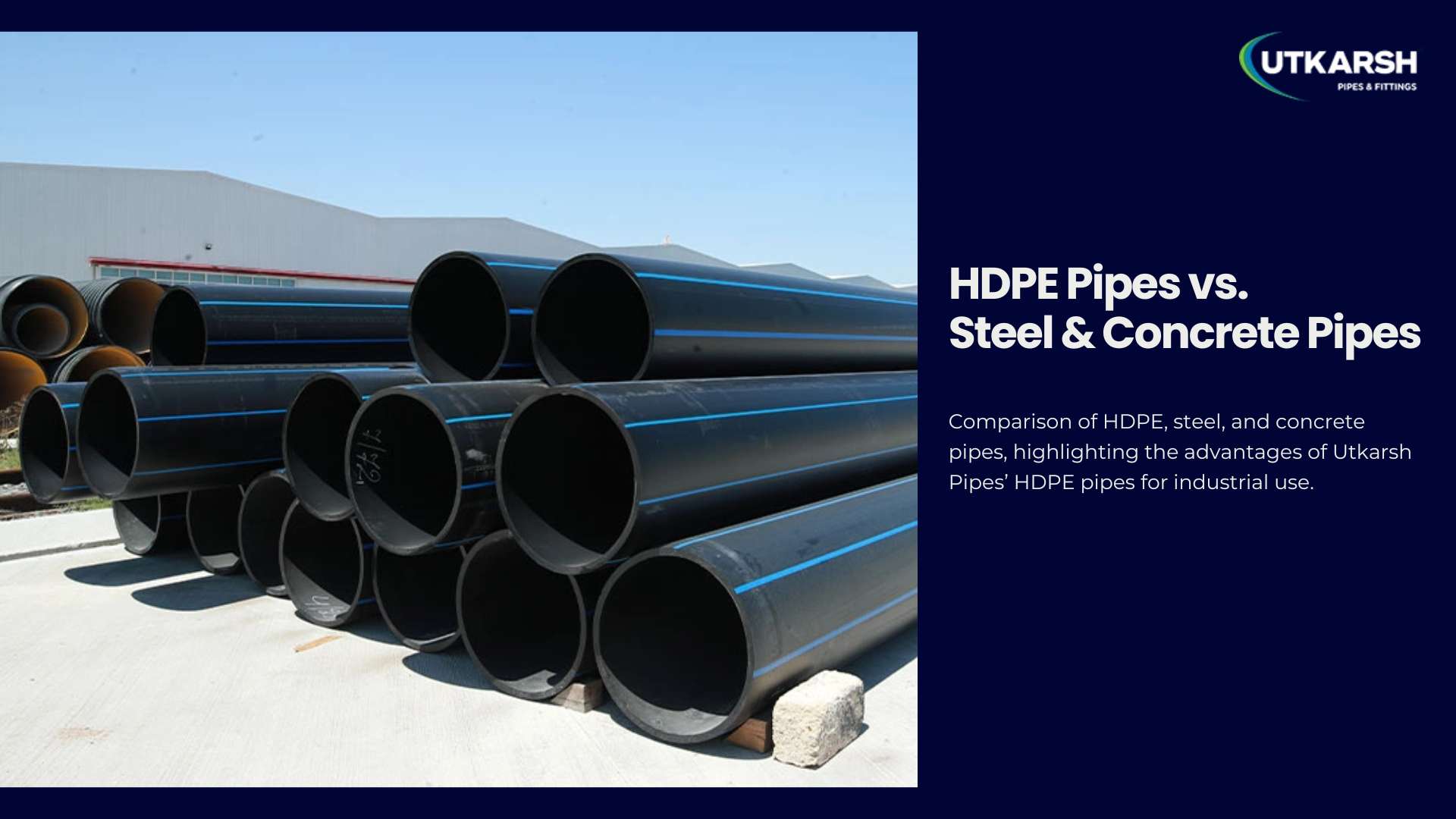
Comparing HDPE Pipes with Steel and Concrete Pipes for Industrial Use
Mar 18, 2025
In industrial applications, selecting the right piping system is crucial for efficiency, longevity, and cost-effectiveness. HDPE pipes & fittings are increasingly becoming the industry standard, emerging as a preferred choice over traditional steel and concrete pipes.
This blog explores the key advantages of HDPE piping solutions and explains why they are the ideal choice for demanding industrial environments.
What are HDPE Pipes?
HDPE (High-Density Polyethylene) pipes are made from a thermoplastic polymer known for its exceptional strength-to-density ratio. This material is produced through a process that yields a highly durable and flexible pipe, suitable for a wide range of industrial applications. These pipes are widely used in industries such as water supply, sewage, gas distribution, chemical transport, and mining due to their superior durability, chemical resistance, and flexibility.
Utkarsh Pipes provides high-quality HDPE pipes that cater to various industrial applications, ensuring long-lasting performance and reliability.
HDPE Pipes vs. Steel and Concrete Pipes: A Detailed Comparison
| HDPE Pipes | Steel Pipes | Concrete Pipes | |
| Durability | Highly durable, resistant to corrosion, and chemical exposure | Prone to rust and corrosion, requires protective coatings | Susceptible to cracking and structural degradation |
| Flexibility | High flexibility, can withstand ground movements | Rigid, requires extensive joints | Low flexibility, prone to breaking under pressure |
| Installation | Lightweight, easy to transport and install | Heavy, requires more labor and machinery | Labor-intensive and time-consuming |
| Maintenance | Low maintenance, no need for coatings or linings | Requires frequent maintenance and anti-corrosion treatments | Prone to leaks and structural weaknesses |
| Lifespan | 50+ years | 20-30 years (with proper maintenance) | 30-50 years but prone to early wear |
| Cost-effectiveness | Lower overall cost, fewer repairs needed | High initial and maintenance costs | Expensive due to material and labor costs |
Advantages of Utkarsh Pipes’ HDPE Pipes for Industrial Use
1. Corrosion and Chemical Resistance
Unlike steel pipes, which are vulnerable to rust, and concrete pipes, which degrade over time, Utkarsh Pipes' HDPE pipes are highly resistant to a wide range of chemicals, moisture, and corrosion. This makes them ideal for transporting aggressive fluids in industrial settings, including acids, alkalis, and solvents.
2. Lightweight and Easy Installation
HDPE pipes from Utkarsh Pipes are significantly lighter than steel and concrete alternatives, reducing transportation and installation costs. Their flexibility allows them to be installed without excessive jointing, further lowering labor and equipment requirements. Heat fusion joining reduces the need for heavy equipment.
3. Leak-Free Joints
One of the biggest issues with traditional steel and concrete pipes is joint leakage. Utkarsh Pipes’ HDPE pipes & fittings use heat fusion technology, ensuring seamless, leak-free connections that enhance efficiency and reduce water or fluid loss.
4. High Impact and Pressure Resistance
Utkarsh Pipes' HDPE pipes can withstand high-pressure conditions without cracking or breaking. Their flexibility allows them to absorb external stress, making them highly reliable in industrial environments where pressure fluctuations are common.
5. Longevity and Cost Savings
With a lifespan exceeding 50 years, Utkarsh Pipes’ HDPE pipes offer a long-term, cost-effective solution. Reduced maintenance and repair expenses make them a smart investment for industrial applications.
Types of HDPE Fittings and their Uses
HDPE fittings are essential for creating robust and leak-free piping systems. Some common types include:
- Couplers: Connecting two pipes of the same diameter.
- Elbows: Changing the direction of the pipe.
- Tees: Creating a branch connection.
- Reducers: Connecting pipes of different diameters.
- Flanges: Connecting pipes to valves or other equipment.
These fittings, when joined using heat fusion, provide a continuous and reliable piping network.
Why Choose Utkarsh Pipes’ HDPE Pipes?
Utkarsh Pipes is a leading manufacturer of HDPE pipes & fittings, offering top-quality products that meet international standards. Their HDPE pipes are designed for superior performance, ensuring durability, efficiency, and cost savings for industrial use. With a commitment to innovation and excellence, Utkarsh Pipes’ HDPE pipes provide unmatched reliability in various industrial applications.
Applications in Specific Industries:
- Mining: HDPE pipes are used for slurry transport, dewatering, and tailings management due to their abrasion and chemical resistance.
- Oil and Gas: They are used for gas distribution, water transport, and chemical pipelines due to their corrosion resistance and durability.
- Water and Wastewater: HDPE pipes are vital for potable water supply, sewage systems, and industrial wastewater management.
Explore Utkarsh Pipes' range of HDPE pipes & fittings here: Utkarsh HDPE Pipes.
Conclusion
When comparing HDPE pipes with steel and concrete pipes, it is clear that Utkarsh Pipes’ HDPE pipes offer superior durability, flexibility, cost-effectiveness, and long-term reliability. For industries looking for a robust and maintenance-free piping solution, HDPE pipes & fittings from Utkarsh Pipes are the perfect choice.
Invest in high-quality HDPE pipes today for a more efficient and sustainable industrial piping system. Visit Utkarsh Pipes’ HDPE Pipes to learn more.
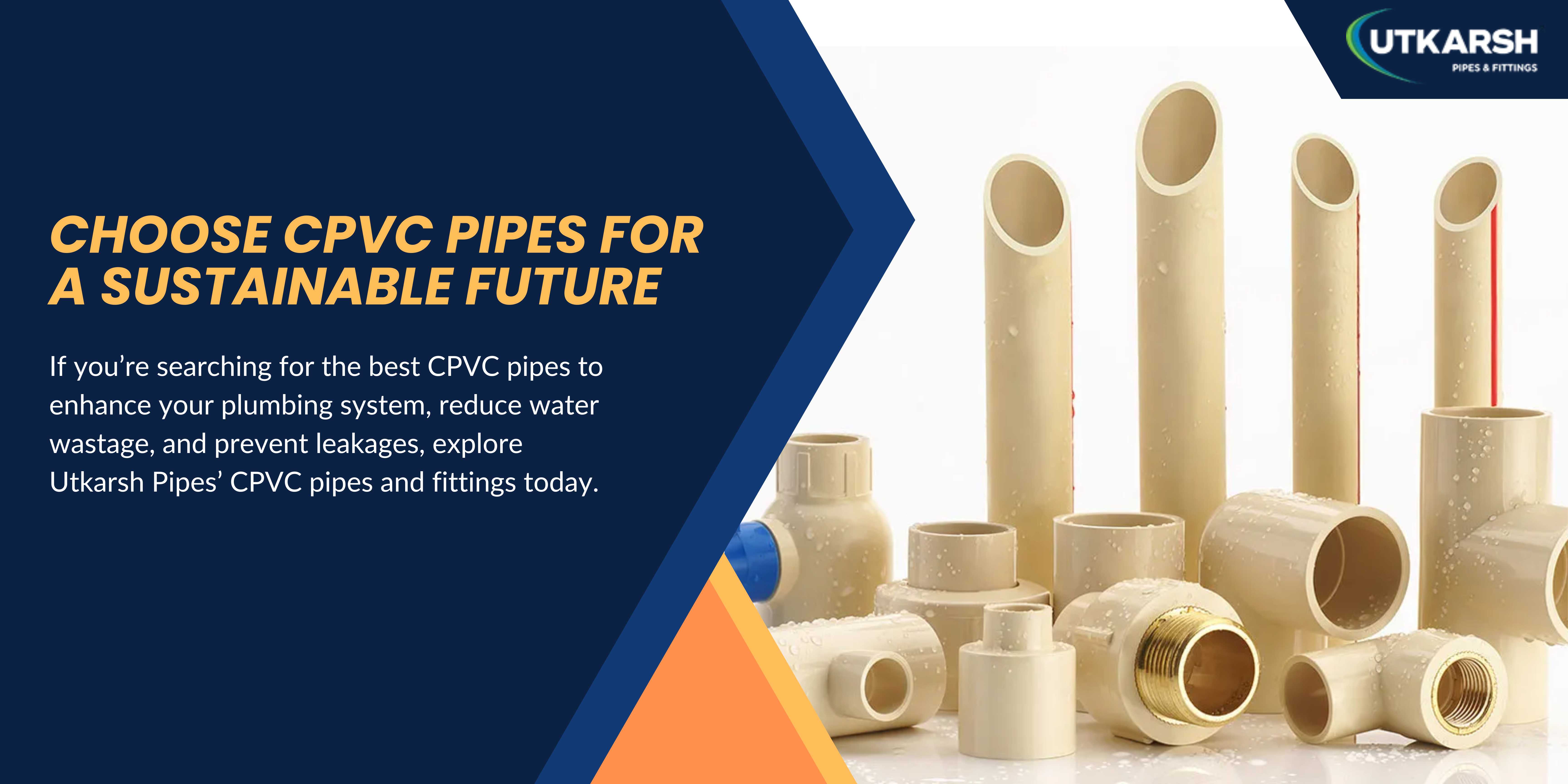
How CPVC Pipes Help in Reducing Water Wastage and Leakages?
Mar 13, 2025
Water conservation has become a critical global priority, with plumbing leaks being a major contributor to water wastage. Choosing the right piping material is essential for maintaining an efficient water supply system and preventing unnecessary losses. CPVC (Chlorinated polyvinyl chloride) pipes and fittings have emerged as one of the most effective solutions, offering durability, leak resistance, and superior performance.
The blog will explore how CPVC pipes help minimize water wastage and why Utkarsh Pipes’ cpvc pipes and fittings are the best choice for your plumbing needs.
How CPVC Pipes Help Prevent Water Wastage
1. Superior Leak-Proof Properties
One of the leading causes of water wastage is leaks in plumbing systems. Traditional metal pipes are prone to corrosion and rust, leading to cracks and leaks over time. However, CPVC pipes and fittings are made from Chlorinated Polyvinyl Chloride, which is resistant to corrosion, ensuring a longer lifespan and fewer chances of leakages.
Utkarsh Pipes' CPVC pipes are engineered with high-quality materials, providing exceptional leak-proof properties that prevent unnecessary water wastage.
2. High Heat and Pressure Resistance
CPVC pipes are known for their ability to withstand high temperatures and pressure, making them an ideal choice for both hot and cold water applications. Unlike conventional metal pipes, which expand and contract due to temperature variations, CPVC pipes maintain their structural integrity, reducing the risk of cracks and leakages.
Utkarsh Pipes' CPVC pipes and fittings are designed to endure extreme conditions, ensuring a robust and reliable plumbing system.
3. Smooth Interior Surface for Better Water Flow
Rough and corroded pipe surfaces can cause friction and blockages, reducing water pressure and efficiency. CPVC pipes have a smooth inner surface that minimizes friction, ensuring a consistent water flow and reducing the chances of pipeline bursts or water pressure fluctuations.
Utkarsh Pipes' best CPVC pipes come with a smooth finish, enhancing water efficiency and reducing wastage.
How CPVC Pipes Reduce Leakages?
1. Corrosion-Free and Chemical Resistant
Metal pipes are prone to rust and chemical reactions, which weaken their structure over time. CPVC pipes, on the other hand, are corrosion-resistant and immune to chemical reactions, making them ideal for long-term usage. This characteristic helps in reducing pipe deterioration and subsequent leakages.
Utkarsh Pipes' CPVC pipes are built to resist harsh chemicals and environmental factors, ensuring durability and leak-free performance.
2. Strong and Durable Joints
Poor-quality pipes often have weak joints that develop leaks over time. CPVC pipes and fittings are designed with a strong solvent cement bonding technique that creates seamless and leak-proof joints.
Utkarsh Pipes offers high-quality CPVC pipe fittings that ensure a secure connection, reducing maintenance costs and preventing unwanted water leaks.
3. Minimal Thermal Expansion
Temperature fluctuations can cause expansion and contraction in pipes, leading to cracks and leaks. CPVC pipes have low thermal expansion properties, making them stable and reliable in varying temperatures.
With Utkarsh Pipes' CPVC pipes, you get a sturdy plumbing solution that resists environmental changes and prevents water wastage.
Why Choose Utkarsh Pipes’ CPVC Pipes and Fittings?
Utkarsh Pipes is a trusted leader in the piping industry, offering high-quality CPVC pipes and fittings that cater to residential, commercial, and industrial needs. Here’s what sets Utkarsh Pipes apart:
- Premium-Grade Material – Manufactured with top-quality CPVC for superior durability and performance.
- Leak-Proof & UV Resistant – Our products offer leak-proof connections and UV resistance, ensuring durability and maintaining hygiene standards.
- Impact & Scaling Resistance – Designed to absorb impact and prevent scaling, our pipes ensure smooth water flow and minimal maintenance.
- User-Friendly Installation – Our CPVC fittings are easy to install, streamlining the process while delivering superior insulation and performance.
- Eco-Friendly & Cost-Effective – Reduces water wastage and lowers repair costs.
- Ideal for Hot & Cold Water Systems – Capable of withstanding high temperatures without compromising quality.
- Rigorous Quality Assurance – Our 6-stage quality checks guarantee durable, reliable products suitable for residential, commercial, and industrial applications.
- Enhanced Safety Features – Engineered with fire safety and weather resistance, our fittings provide reliable performance under various conditions.
- Industry Expertise – With over 50 years of experience, we are the premier manufacturer of CPVC pipe fittings in India, setting high standards for potable water supply systems.
If you’re searching for the best CPVC pipes to enhance your plumbing system, reduce water wastage, and prevent leakages, explore Utkarsh Pipes’ CPVC pipes and fittings today.
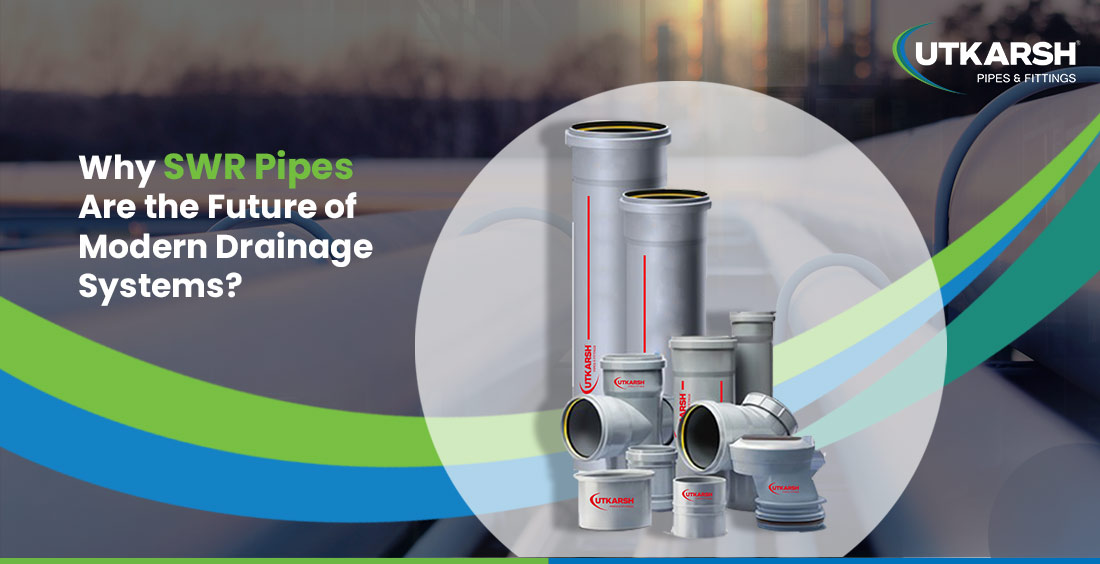
Why SWR Pipes Are the Future of Modern Drainage Systems?
Mar 05, 2025
In today’s world, everyone wants strong, long-lasting, and eco-friendly drainage systems. Old drainage systems often rust, leak, and need constant repairs, which can be expensive. That’s why more people are switching to SWR pipes. These pipes are reliable, durable, and easy to maintain. Utkarsh Pipes & Fittings offers top-quality SWR pipes and fittings that are perfect for modern buildings.
What Are SWR Pipes?
SWR (Soil, Waste, and Rainwater) pipes are special pipes made from strong uPVC (unplasticized polyvinyl chloride). They are designed to carry soil waste, rainwater, and even industrial waste safely. These pipes are tough, don’t rust, and can last a long time, making them great for homes, offices, and factories.
Why SWR Pipes Are a Great Choice
1. Strong and Rust-Free
Unlike metal pipes that rust and weaken over time, SWR pipes from Utkarsh Pipes & Fittings are rust-proof. They can withstand exposure to moisture, chemicals, and harsh weather without corroding. This makes them ideal for both indoor and outdoor drainage systems, ensuring long-term reliability.
2. No Leaks, No Worries
The joints in SWR pipes and fittings are designed to fit perfectly, preventing leaks. The tight, secure connections minimize the risk of seepage and water damage, which helps protect walls and foundations. This also reduces the need for frequent repairs, saving time and money.
3. Lightweight and Easy to Install
SWR pipes are light and easy to carry, making installation simple and quick. Their lightweight nature allows for faster handling and easier maneuvering on-site. This saves time and reduces labor costs for plumbers and builders, making them a preferred choice for both residential and commercial projects.
4. Eco-Friendly and Budget-Friendly
These pipes are recyclable and use less energy to make. Their long lifespan means fewer replacements, reducing waste and environmental impact. Plus, their low maintenance requirements make them cost-effective, helping homeowners and builders save money over time.
5. Smooth Inside for Fast Water Flow
The inside of SWR pipes is smooth, so water and waste can flow easily without getting stuck. This smooth surface reduces friction, preventing blockages and improving the efficiency of the drainage system. It also helps reduce noise caused by water flow, creating a quieter plumbing system.
6. Resistant to Chemicals and Weather
Whether it’s harsh chemicals or extreme weather, SWR pipes can handle it all. They resist damage from acids, alkalis, and other chemicals commonly found in household and industrial waste. Additionally, their UV-resistant material ensures they don’t crack or degrade under direct sunlight, making them suitable for outdoor installations.
Why Utkarsh Pipes & Fittings Is the Right Choice
When it comes to quality and reliability, Utkarsh Pipes & Fittings leads the way. Their comprehensive range of SWR pipes and fittings adheres to stringent industry standards, including IS: 13592. Designed with 5X protection, Utkarsh SWR pipes offer:
- Durability for long-lasting performance
- Leak Proof technology for hassle-free drainage
- Non-Toxic materials ensuring safety and environmental friendliness
- Pressure Resistance to handle varying flow conditions
- Ultra-Strong build for maximum reliability
With over 50 years of manufacturing expertise, Utkarsh has built a reputation for quality and reliability. Their long-standing experience ensures that every product meets the highest standards, making them a trusted name in the industry.
Conclusion
The future of drainage lies in innovation, sustainability, and efficiency—qualities that SWR pipes embody effortlessly. With superior features like corrosion resistance, leak-proof joints, and eco-friendliness, they have redefined modern drainage systems. Trust Utkarsh Pipes & Fittings to provide top-tier SWR pipes and fittings that cater to today’s demands while paving the way for a sustainable future. Make the switch today and experience the difference in performance and reliability!
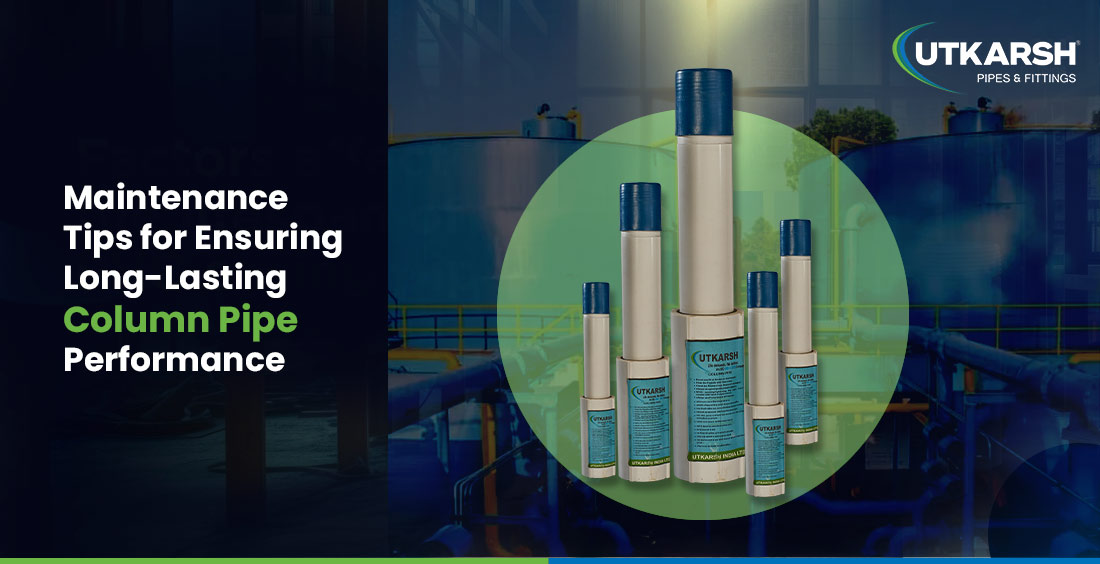
Maintenance Tips for Ensuring Long-Lasting Column Pipe Performance
Mar 05, 2025
When it comes to reliable water management in borewells and deep-well applications, column pipes play a crucial role. Known for their strength and durability, these pipes ensure efficient water flow and support heavy submersible pumps. However, to maximize their performance and extend their lifespan, regular maintenance is essential. In this guide, we’ll share top maintenance tips for column pipes and why choosing a trusted column pipe manufacturer like Utkarsh Pipes & Fittings makes all the difference.
Understanding Column Pipes
Column pipes are specially designed to withstand high pressure and heavy loads in deep borewell applications. They are commonly used in agricultural, industrial, and domestic water systems to transport water from underground sources. Known for their strength, corrosion resistance, and leak-proof design, high-quality column pipes are essential for smooth water flow and long-lasting performance.
Top Maintenance Tips for Column Pipes
1. Regular Inspection
Conduct periodic inspections to check for any cracks, leaks, or signs of wear. Early detection of potential issues can prevent major failures and costly repairs.
2. Proper Installation
Ensure the column pipes are installed correctly by experienced professionals. Misalignment or incorrect fittings can lead to joint failures or reduced water flow.
3. Use Compatible Fittings
Always use fittings recommended by the column pipe manufacturer to avoid compatibility issues. Proper fittings help maintain a secure and leak-proof system.
4. Check for Corrosion and Scaling
Although high-quality pipes are corrosion-resistant, regular checks for scaling or rust buildup can help maintain water quality and flow efficiency.
5. Monitor Pressure Levels
Ensure the pressure within the pipes stays within the recommended limits. Excessive pressure can strain the pipes, leading to cracks or bursts.
6. Routine Cleaning
Clean the pipes periodically to remove dirt, debris, or mineral deposits that can clog the system and reduce efficiency.
7. Replace Damaged Parts Promptly
If any section of the pipe shows signs of damage or wear, replace it immediately to avoid system failures or costly downtimes.
Why Choose Utkarsh Pipes & Fittings?
As a leading column pipe manufacturer and one of the top column pipe manufacturers in India, Utkarsh Pipes & Fittings delivers superior-quality products designed for long-lasting performance. Our column pipes are manufactured using high-grade raw materials that ensure strength, durability, and resistance to corrosion. Each pipe undergoes rigorous quality checks to meet industry standards, providing customers with a product they can trust. With over 50 years of expertise in the piping industry, Utkarsh Pipes & Fittings has built a reputation for excellence and reliability. Our commitment to innovation and quality ensures that our column pipes can withstand even the most demanding applications.
Conclusion
Conclusion Regular maintenance is key to extending the lifespan of your column pipes and ensuring efficient water flow. By following these simple tips and choosing a trusted column pipe manufacturer like Utkarsh Pipes & Fittings, you can enjoy long-lasting performance and reduced maintenance costs. For durable, high-performance column pipes, trust Utkarsh Pipes & Fittings—a leading name among column pipe manufacturers in India. Invest in quality today for a hassle-free tomorrow!
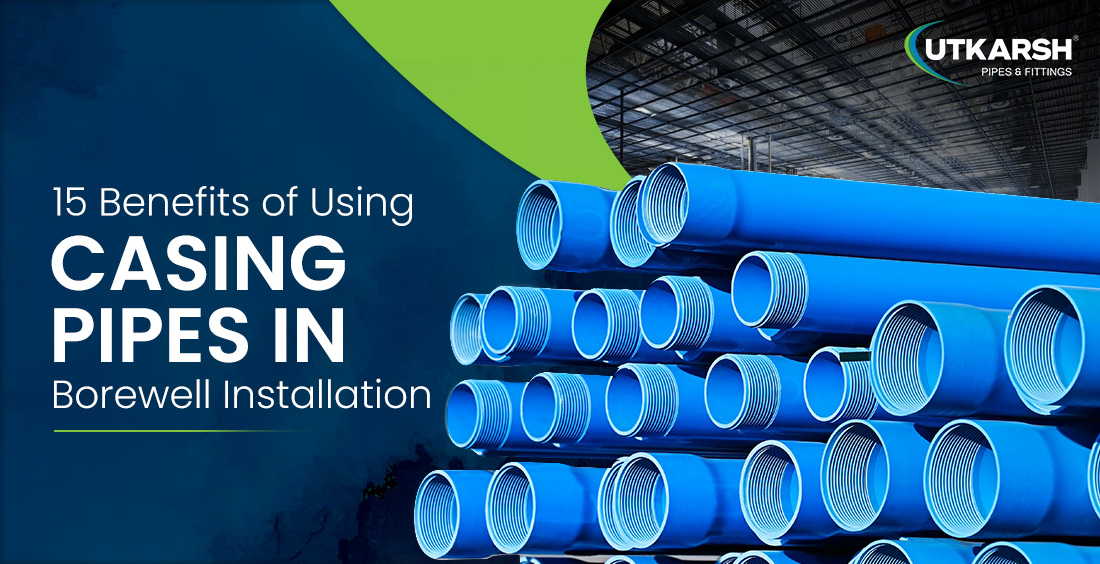
15 Benefits of Using Casing Pipes in Borewell Installation
Jan 03, 2025
Borewells are important groundwater sources, especially in regions where surface water is insufficient. The selection of correct materials for borewell construction is significant in durability, efficiency, and cost-effectiveness. Among these materials are casing pipes, a solution that shows numerous advantages compared with conventional alternatives. This blog discusses the 15 advantages of using casing pipes in borewell installations, divided into three comprehensive headings.
Durability and Reliability
Resistance to Corrosion:
An exceptional badge of merit for casing pipes, especially PVC casing pipes, turns out to be corrosion resistance. Unlike conventional metals, PVC does not rust or undergo chemical reactions, thus enabling a very long life even under adverse underground conditions involving the acidity of water and soil, which would otherwise hasten deterioration by corrosion.
High Structural Strength:
Casing pipes are designed for very high structural strength so that they can hold up against the enormous pressure surrounding soil layers exert during borewell operation. This is even more critical for very deep borewells, within which the pipes sustain enormous loads and stress.
Dimensional Accuracy:
Manufactured under strict conditions, casing pipes maintain a remarkably accurate dimension for an excellent fit and superb alignment during installation. A misalignment or failure of a pipe is all but eliminated, thus increasing the overall reliability.
UV Resistance:
As borewell casing pipes are usually underground, they should retain and enjoy UV resistance properties because they are often exposed to sunlight during transportation or storage. This prevents their destruction by continuous exposure to the sun.
Efficient and Performance Improved
The Light Weight of Simple Handling:
PVC casing pipes are quite light compared to metals and concrete. Difficulties and inconveniences in terms of transportation, handling, and installation reduce labour and logistics costs in borewell projects to a large extent.
Easy Installation:
Adaptable because of the lightweight nature and standard design of casing pipes making it easy to install. The smooth surface and precise threading ease the joining process, leading to quicker installations and limited downtimes.
Maximised Flow of Water:
Casing pipes maximize water flow with very minimal resistance. The inner surface of such pipes is nonhazardous to the other components of the structure, reducing friction. It thus optimizes groundwater extraction, increasing the efficiency of the borewell.
Compatibility with Advanced Systems:
Modern casing pipes are compatible with advanced pumping systems for seamless integration across different applications—agriculture, industry, and household. This feature allows them to respond to a variety of drawdown conditions.
Friendly to the Environment:
PVC casing pipes can be recycled, and their production process entails very little harm to the environment. The durability of the pipes also ensures that the replacement rate over time is low, making these pipes a sustainable solution for borewell construction.
Maintenance at a Cost:
Owing to their minimal corrosion, wear, and chemical deterioration, casing pipes require hardly any maintenance as compared to traditional components. Undoubtedly, it would result in lowered operational overheads over the lifetime of the borewell, hence making it a good investment.
Versatility and Functional Benefits
Customization Features:
Casing pipes come in many sizes, designs, and specifications, like plain and slotted types. This allows the user to choose from various options so that they get the best type of pipe for their specific application in borewells for maximum performance and cost-effectiveness.
Resilience from Contaminants:
These PVC casing pipes have a surface that is non-porous, by which harmful contaminants such as dirt, sand, or chemicals cannot penetrate them. Therefore, it keeps the water that it extracts safe for use in agriculture, in industries, and for household use.
Adjusts with Depths:
The casing pipes are adjustable according to the required length for your borewell, shallow or deep, strong and adjustable; they can suit any project, small or large, simple or complex.
Long Lasting:
Casing pipes are built to serve long-lasting years without wear and tear or any degradation. This property makes them perform continuously and becomes an advantage for their use for long-term groundwater extraction requirements.
Unbeatable Prices:
No matter the advanced features inherent in casing pipes, they rank among the cheap options in the market. This cost-performance trade-off makes them the first preference for borewell installations, whether in cities or villages.
Conclusion
Casing pipes have transformed the borewell installation by offering benefits unmatched elsewhere, such as durability, efficiency, versatility, corrosion resistance, lightweight materials, and compatibility with advanced systems. They become very valuable solutions at a reasonable cost when extracting groundwater.
Realizing the borewell is for agricultural, industrial, or domestic purposes, an investment in high-quality casing pipes is a decision that ensures long-lived performance and sustainability. With 15 reasons clear, no wonder casing pipes are the first option for borewell professionals and the end user.
Frequently Asked Questions
Which pipe is good for casing?
Borewell casing is made using PVC (polyvinyl chloride) pipes, which makes them durable, less expensive, and highly versatile. Excellent corrosion, chemical, and rust resistance, PVC casing pipes ensure a long life even under very adverse underground conditions. Because of is lightweight, transportation and installation are made much easier, which also saves on cost and time.
In addition to this, PVC casing pipes made under specifications with high structural strength and accurate dimensions are necessary to keep the hollow borewell tube well under the soil pressure. The casing piping is in various kinds, such as plain and slotted, and in various sizes. These consider varying extraction needs from groundwater.
PVC casing pipes are very cost-effective and environmentally friendly, are designed to be recyclable, and require little maintenance. Compared to steel or concrete casing pipes, these innovations make the borewell casing much cheaper. PVC casing pipes are good borewell pipes for deep as well as shallow bores and are effective for household, agricultural, and industrial use.
What is PVC casing pipe?
Casing pipe PVC is a kind of polyvinyl-chloride (PVC) pipe that has been specially manufactured for bore and groundwater extraction systems. These types of pipes protect boreholes from soil and debris and keep a clear water-carrying channel inside.
For most end-users, PVC casing pipes are lightweight, corrosion-free, and very durable, thereby avoiding the use of traditional metal and concrete. There are many types, plain and slotted, to meet different application needs.
The pipe achieves an efficient flow of water through its smooth internal surface, besides having a long-life capability guaranteed by chemical resistance and being UV-proof. Easy to place, carry, and transport, the pipes are renowned for agricultural, industrial, and domestic borewell systems, designing the most economical and eco-friendly methods of groundwater extraction.
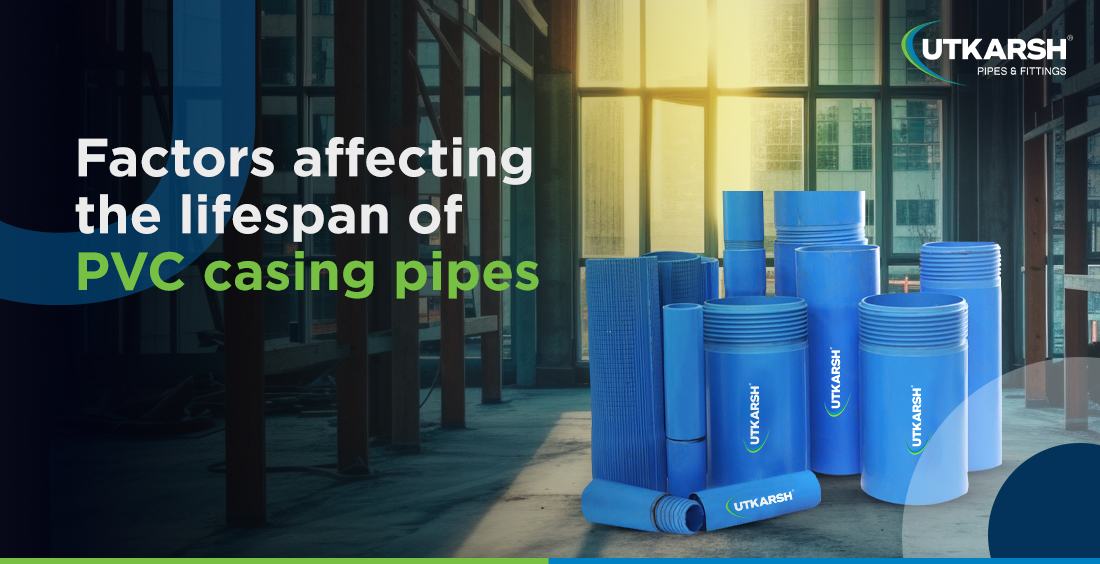
Factors affecting the lifespan of PVC casing pipes
Jan 03, 2025
PVC casing pipes are commonly used in borewell and industrial and residential water systems because they are strong, affordable, and do not rust. However, how long these pipes last depends on several factors. Understanding these factors helps users make smart decisions that improve the performance of the pipes and ensure that they last a long time.
Manufacturing Standards
Utkarsh pipes & fittings that meet quality standards last longer. Industry standards, like those from the Bureau of Indian Standards (BIS), set specific requirements for PVC pipes to make sure they can handle the demands of different uses. Pipes made in advanced factories with good technology and strict quality checks usually perform better and last longer.
Installation Practices
Problems often happen when pipes are not installed correctly. Poor installation can cause PVC pipes to crack or break sooner than expected. Proper alignment, backfilling carefully, and using the right amount of force during installation help keep pipes from getting damaged. Hiring skilled technicians and following the manufacturer's guidelines make a big difference in keeping the pipes in good shape.
Water Quality
The kind of water that flows through PVC pipes has a major impact on how long they last. Highly acidic or alkaline water can wear down the pipes more quickly. If the water has a lot of minerals or contaminants, it may cause deposits that can affect the flow. Cleaning the pipes regularly helps avoid build-up and keeps the pipes in good condition.
Mechanical Stress
PVC pipes are made to handle a specific amount of pressure and weight. If the pressure exceeds this limit, the pipes may crack or lose strength. For example, deep installations where the ground puts too much pressure on the pipes, or impacts during transportation, can damage them. Choosing pipes with the right thickness and pressure ratings is important for making sure they stay reliable for a long time.
Maintenance and Monitoring
Regular inspection helps identify problems early, such as leaks, cracks, or any build-up that might cause future issues. Ignoring these checks allows small problems to turn into major damage, which shortens the lifespan of the pipes. Using the right cleaning methods also helps keep the pipes in good condition and prolongs their lifespan.
Compatible Fittings
Joints are often the weakest points in a piping system. Using fittings and couplings that match well with the PVC pipes helps reduce stress at the joints. Poor-quality or incompatible fittings can cause leaks and other issues. High-quality, properly fitting connections help make the whole system more reliable and longer-lasting.
Looking for reliable and trustworthy PVC casing pipe manufacturers?
Explore our PVC casing pipes. Our borewell casing pipes meet all necessary standards, including PHED approval and certifications such as ISO, BIS, and ASTM, ensuring quality and safety. To ensure quality, our PVC pipes go through various tests. These include checking the density of the material, testing the strength against impacts at low temperatures, measuring how much weight the pipes can handle (tensile strength), testing the softening point, and ensuring they don’t affect the quality of water. Our products are certified under multiple standards including BIS License No-5813874, ASTM D 1785, DIN 4925, and IS 12818-2010.

